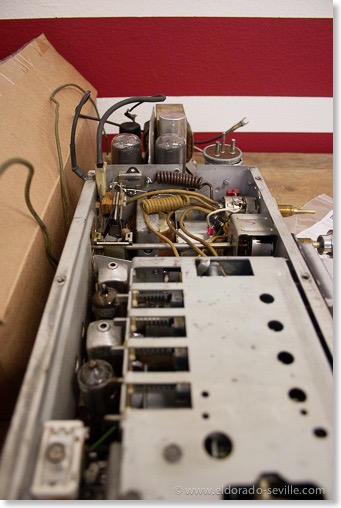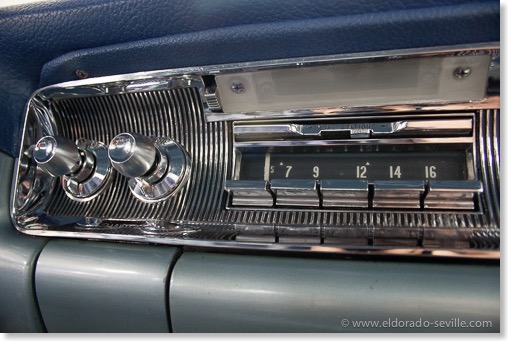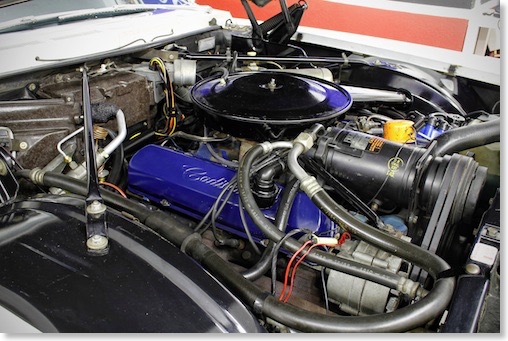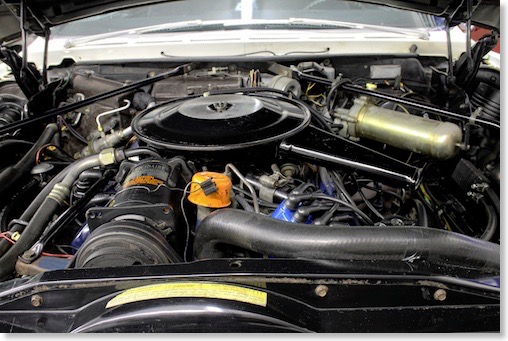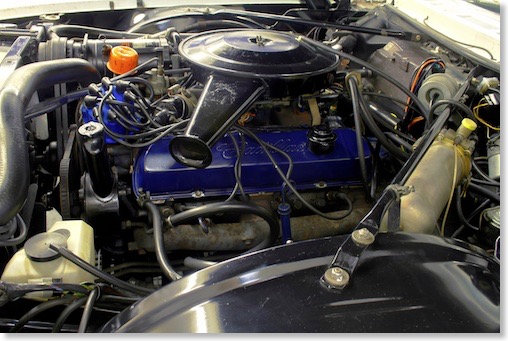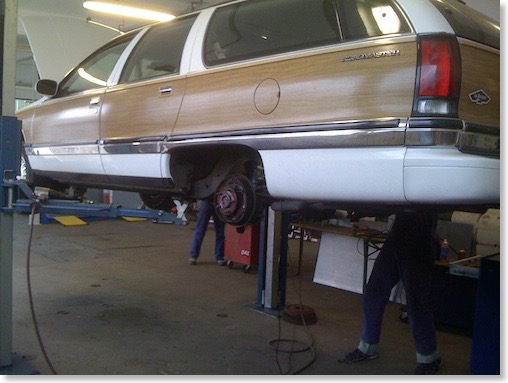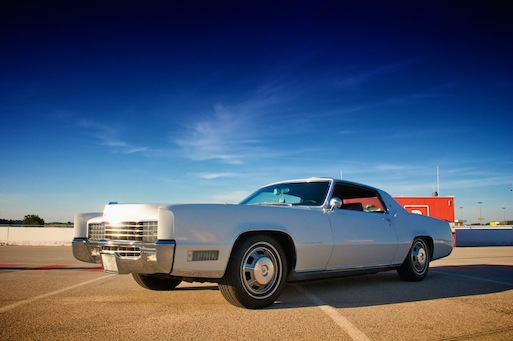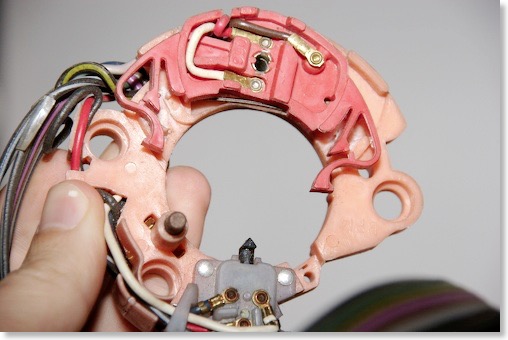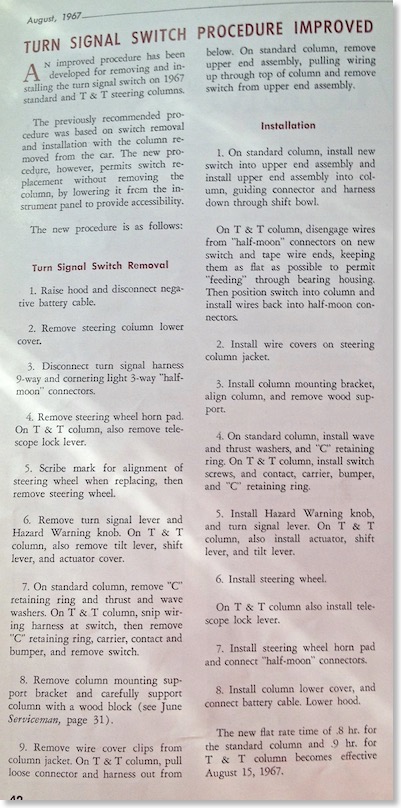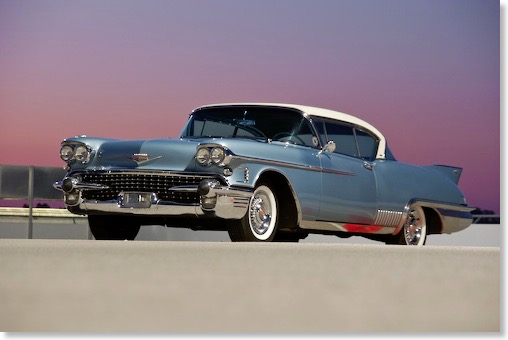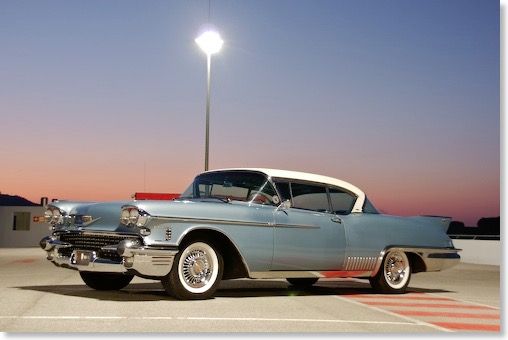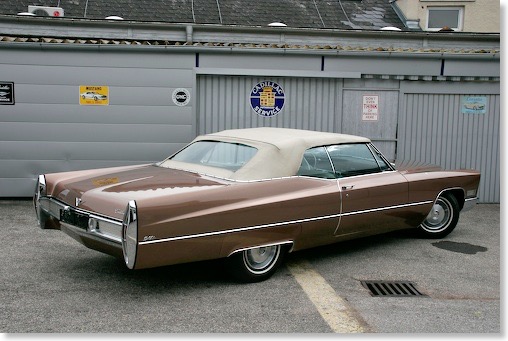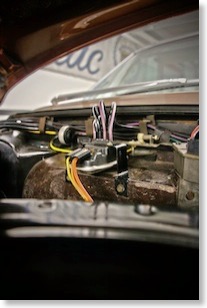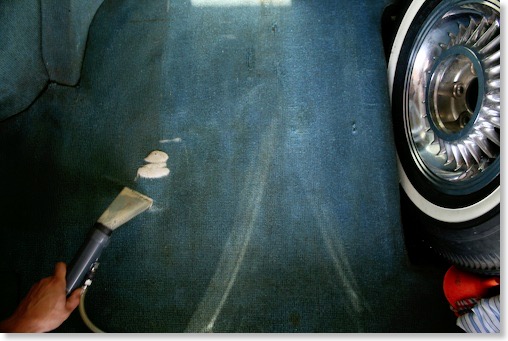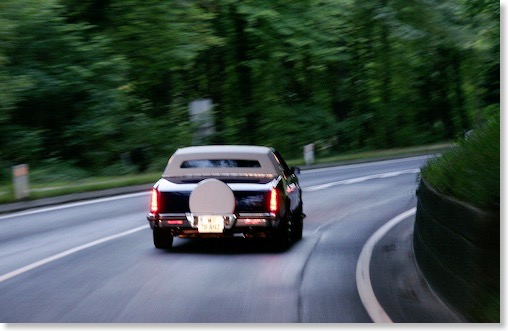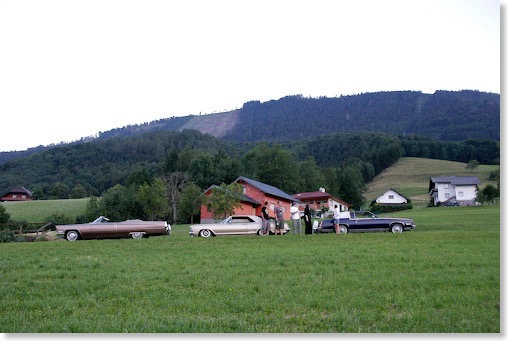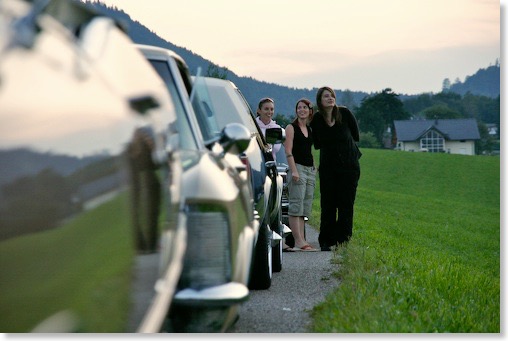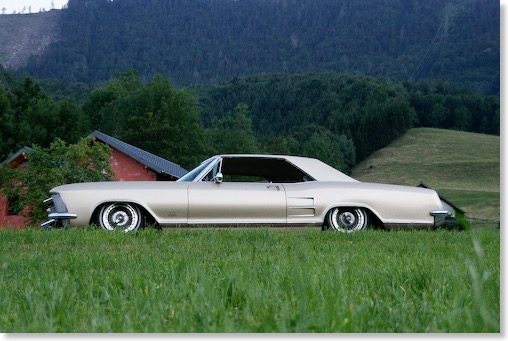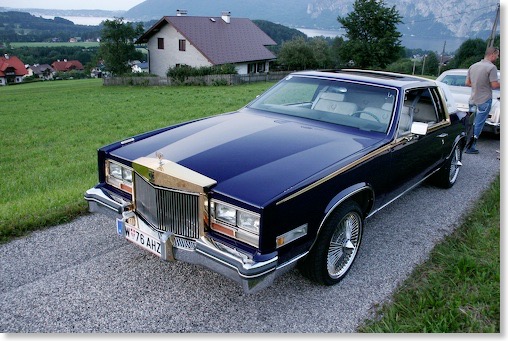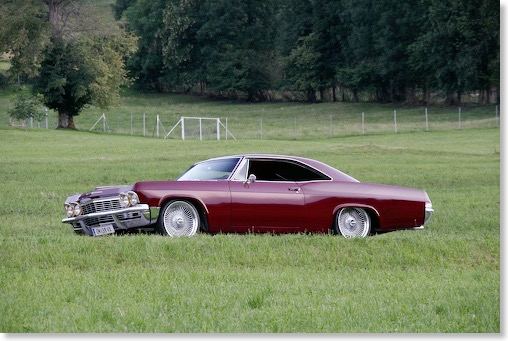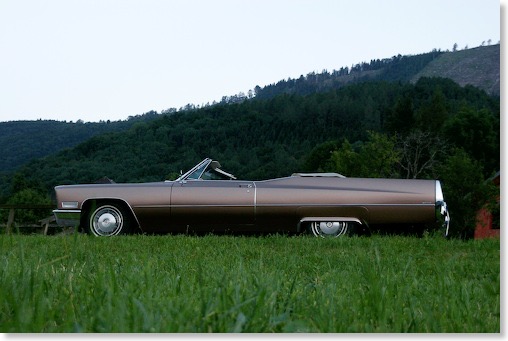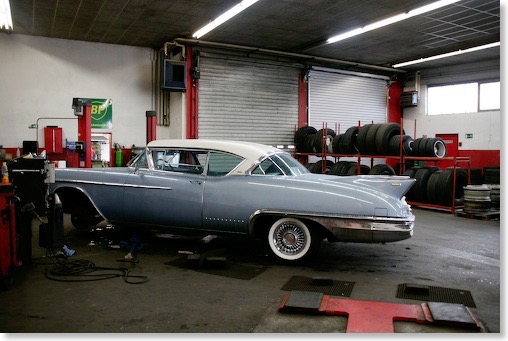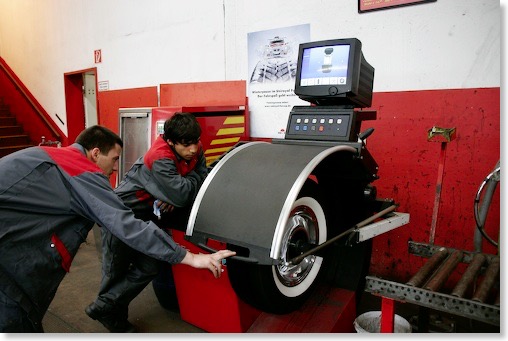1967 ELDORADO CARBURETOR REPLACEMENT
The Eldorado now purrs like a kitten again with its new Quadrajet. I now have two more carburetors to do - the 1966 has a stuck choke and the 1978 needs a new accelerator pump.... The video is also available on YouTube in 4K HDR quality...
I took a short video of the installation process.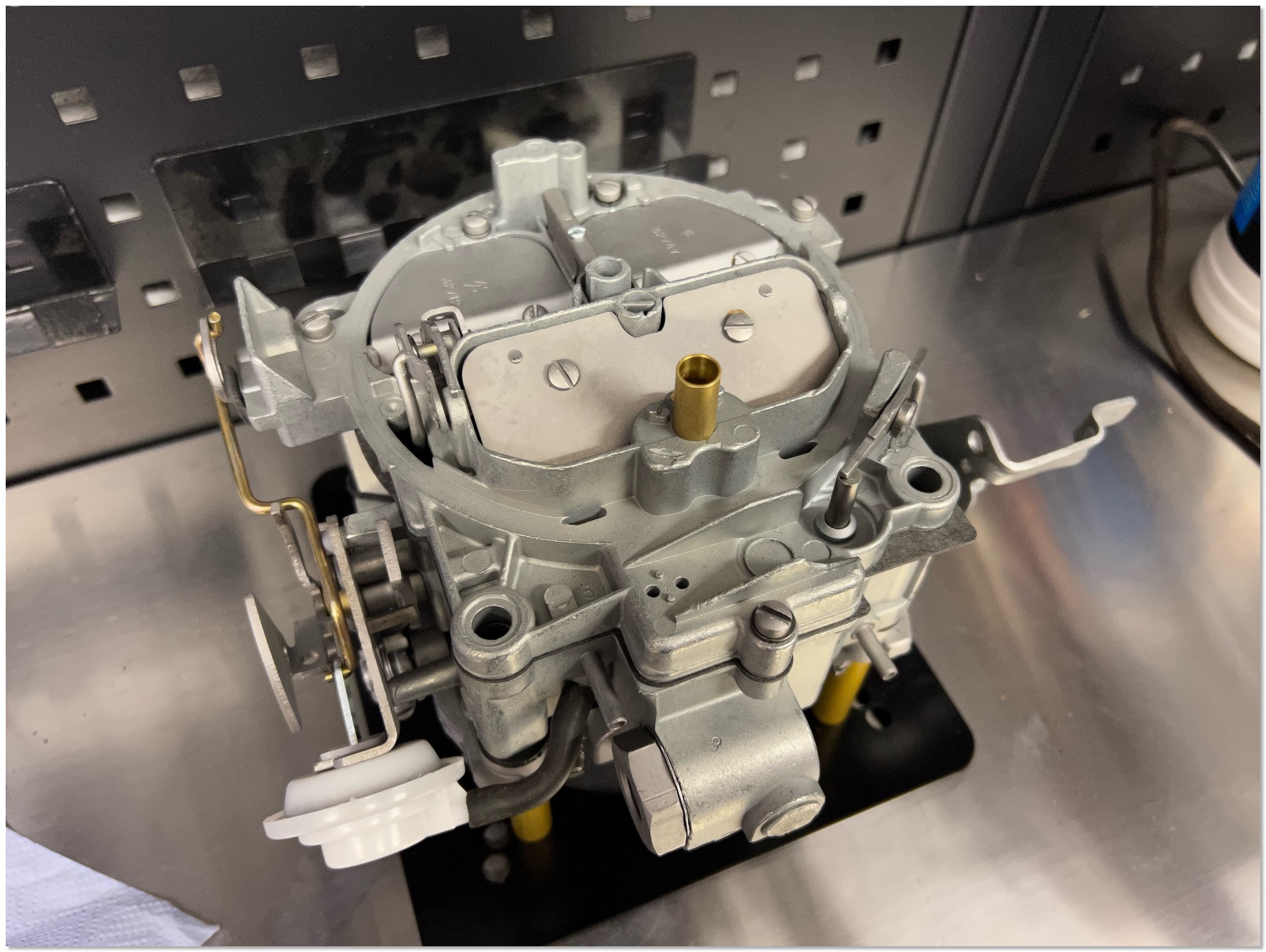
The rebuilt Quadrajet on the bench.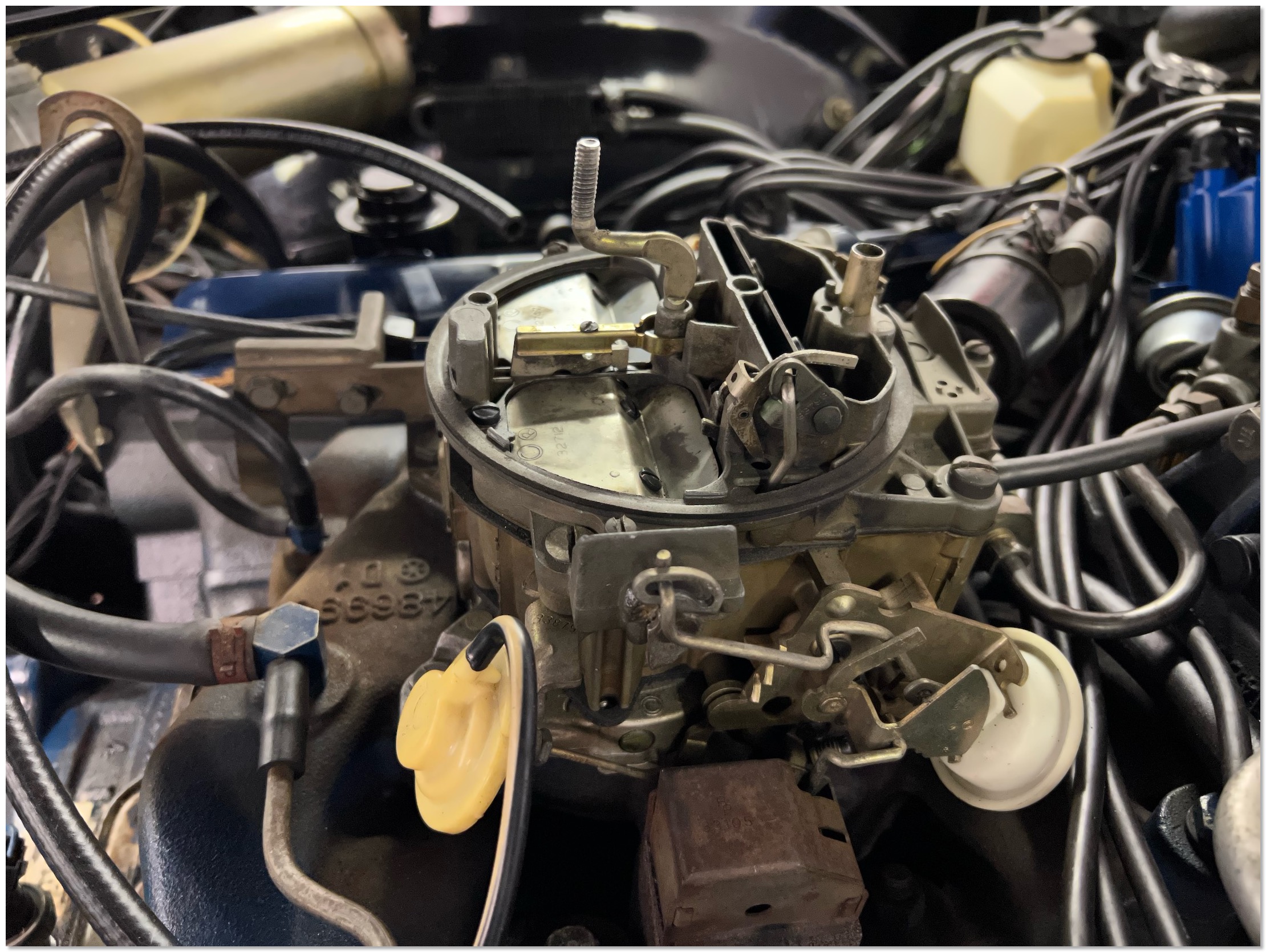
The old original 1967 Eldorado Quadrajet - this is the non California version.
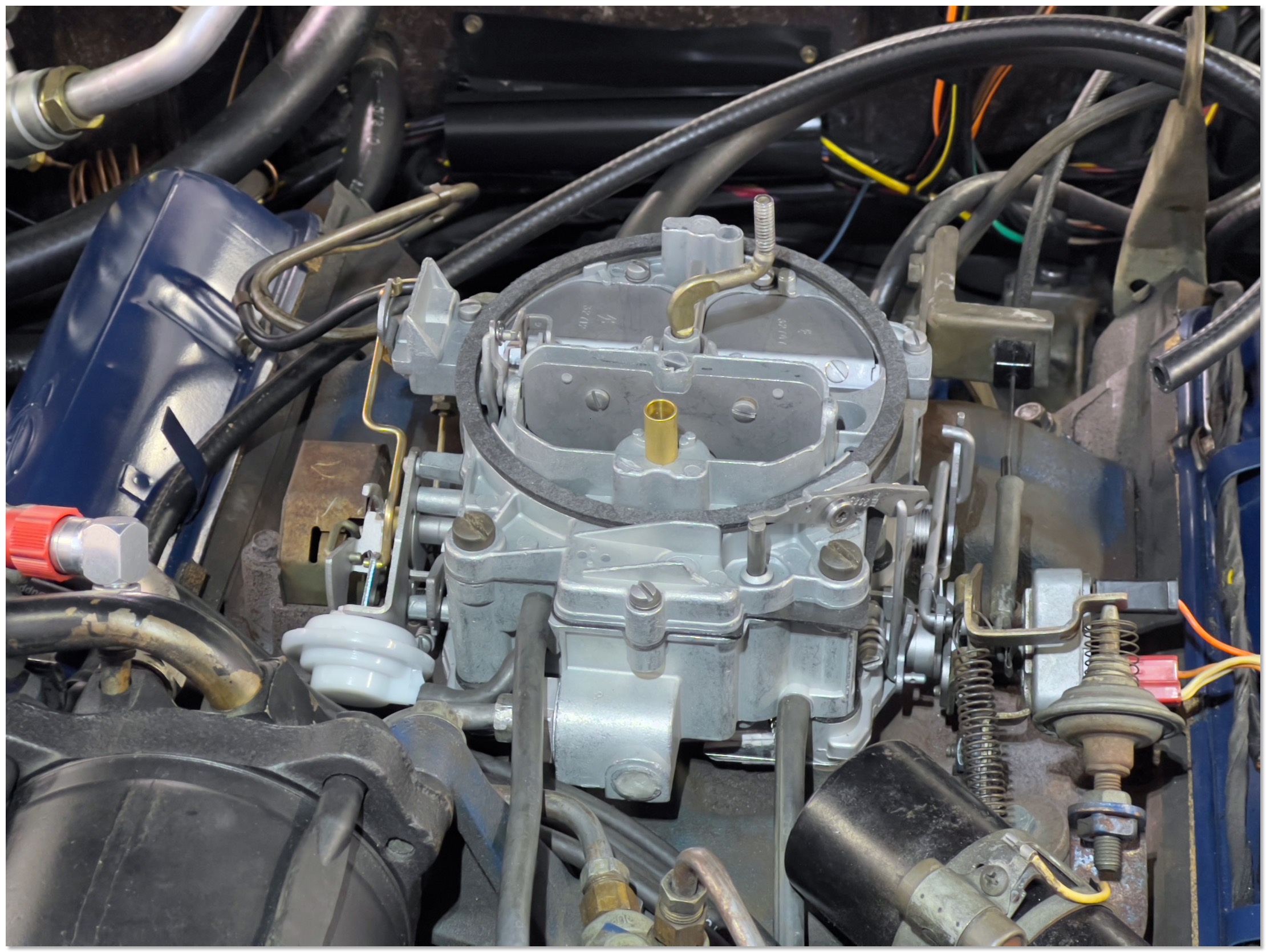
The rebuilt Quadrajet installed.
REPLACING THE CV-JOINTS AND AXLES OF MY 1978 ELDORADO
CLICK "READ MORE" underneath the picture to read the entire article.
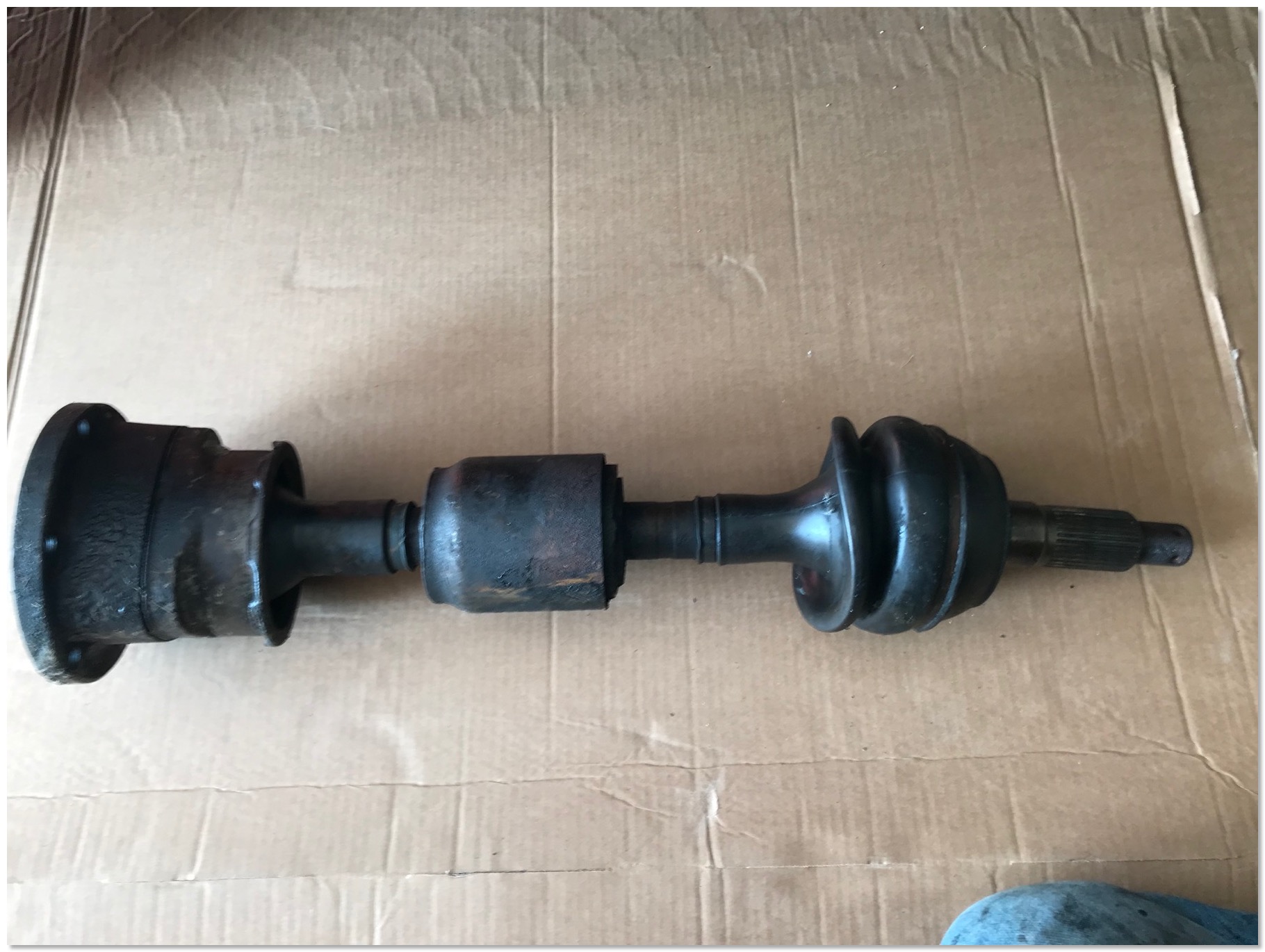
The removed original right front axle including the rubber dampener. I will some time restore it and install new rubber boots and put it back into the car instead of the replacement axles I installed now, just to make it 100% original again.READ MORE...
REMOVING AND REPLACING THE 1974 CADILLAC HEATER CORE
There could have been 3 possible scenarios why it was disconnected:
- The heater core is leaking
- The heater core is blocked
- The heat could not be turned off in the heating system due to a problem in the ATC
Most probably the core is leaking on such old cars. So I had ordered a new core a while ago, but I never really wanted to tackle this job as it needs quite a bit of effort to get it done and it is not a very funny job. It's not that technically challenging but very tedious. I finally bit the bullet and decided to finally do it.
You can normally detect a defective heater core by fog build up inside the car and by the smell of coolant.
I studied the shop manual and started to tear the dash apart to get access to the heater box which houses the heater core.
I found out that the shop manual lists a lot of necessary work and does not show all the screws that you have to remove to get the box out. Some of the screws are very well hidden and finding them was the most frustrating part of this job.
Here is how to remove the heater core: (text in black is from the shop manual - my remarks are in green)
First you have to remove the Instrument Panel Pad
Removal of Instrument Panel Pad
- Disconnect negative battery cable.
- Remove three climate control outlet grilles - right, left and right center (see picture below on how it is done with a special tool - I just did it with two flat screwdrivers)
- Working through outlet openings, remove 3 fasteners securing pad to instrument panel support.
- Remove screws securing pad to instrument panel horizontal support.
- Pull pad outward and disconnect electrical connector from windshield wiper switch.
- Remove pad.
Heater Case Removal
- Drain radiator. (not necessary if you just clamp the hoses off, but flushing the system never can hurt)
- Remove hoses from heater core nipples and plug nipples to prevent spilling coolant remaining in core. (Thats indeed extremely important as you have to move the heater case around and it would definitely spill any remains of coolant on your carpet. Also make sure that there are no traces of leaked coolant underneath the carpet from the bad core.)
- Remove instrument panel pad. (As described in the chapter above.)
- Remove center A/C outlet support and connector from position between cowl and horizontal support, Fig. 1-36. (Scroll down to see the illustration, You basically only have to unhook the rubber part of the outlet and push it downwards.)
- Remove left A/C outlet hose from A/C distributor. (There are some steel clips inside the tube where it is mounted to the plastic distributor. You have to reach in and unclip them to be able to remove the hose without using a lot of force and maybe damaging it. See the picture where I put my arm into the opening below.)
- Remove center support and associated braces as shown in Fig. 1-36. ( I can´t see any reason why this should be done - I removed only one of the braces, and it was completely unnecessary. You only have to remove the round bent brace on the bottom of the heater case as its in the way to get it out - see the picture where I am unscrewing it below.)
- Remove two screws securing A/C distributor to heater case and remove distributor, Fig. 1-36. (If you did not remove the braces mentioned above like I did, you can´t get this part out. I just put it to the side where the glove box normally is, which you will also have to remove anyways - see later.)
- Remove one screw securing defroster nozzle and remove nozzle. (You have to remove the screw - but leave the nozzle in place. There is no whatsoever reason to take it out. And its also impossible to get out if you did not remove ALL the braces and brackets.)
- Remove glove compartment liner. (Its self explanatory - just remove all the philips screws you see inside.)
- Remove vacuum and electrical connectors from programmer. (You can do this now through the glove box opening.)
- Disconnect vacuum hose from recirc door actuator (Orange - near the right door kick panel.) , defroster door actuator (You can see it on the left side of the heater box with a blue and a yellow hose going into it.), mode door actuator (There is no way you can remove these hoses now, as they are on the back of the heater case. The upper mode door is green and the lower one is tan. You can really only remove them once the entire box comes out.) and position vacuum harness out of way, Fig. 1-37.
- Disconnect aspirator hose from in car sensor. (The thick black hose on top of the heater box)
- Remove three nuts and one screw securing heater case to cowl on engine side of cowl, Fig. 1-8. (It was the most tricky part for me to find these screws. See my picture below where I have marked the location of the screws as seen from the engine bay.)
- Remove heater case from position under instrument panel .(See picture how you have to position it to get it out - remove the two vacuum hoses mentioned before on the back now. Be careful - they are attached with metal clips)
- Replace heater core. (Only 2 screws - self explanatory - also re-use the rubber seals from your old core around the water nipples.)
You can then put everything back together which should be much faster, but before you could also remove the clock, which is very easily accessible now and clean and lubricate it (the shop manual recommends to do this every 2 years). You also have access to all the dash lights, tell tale and warning lights and to the speakers (which are shot on my car due to a defect in the amplifier in my radio) while everything is apart. While I had the heater box out of the car I also cleaned the inside of the programmer and re-lubricated it with white lithium grease. I used electronic cleaner to clean the electric contacts inside the programmer while it was open, as most probably the contacts will have some oxidation on your car as well. While the heater box is out you can also lubricate the various doors and clean out all the dust which has collected inside the box over the last decades.
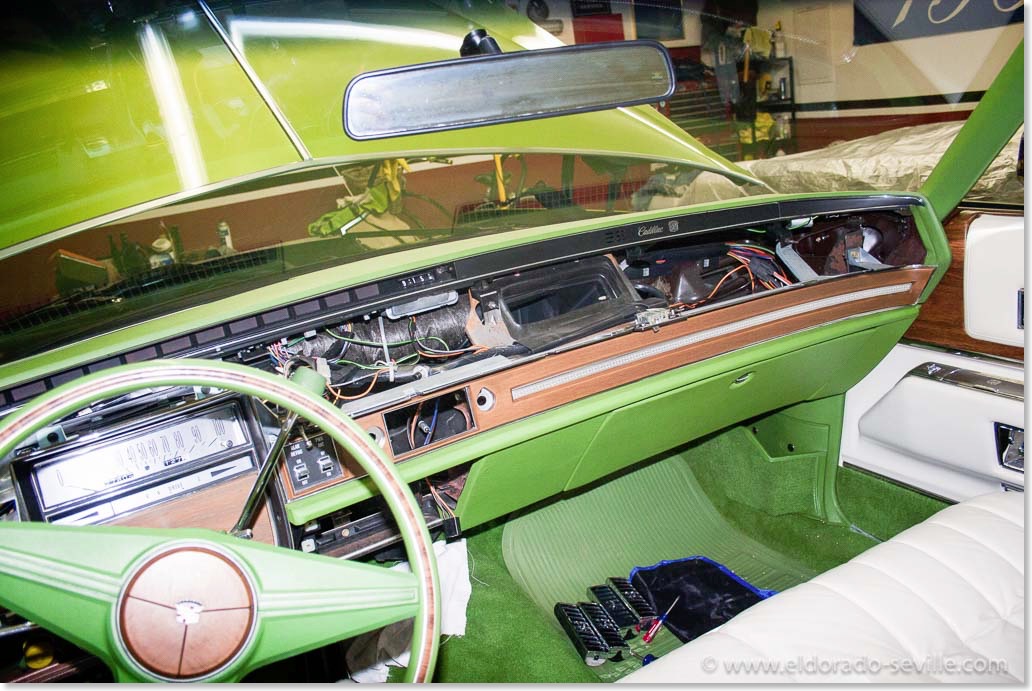
The dash removed. The radio is also out for repair.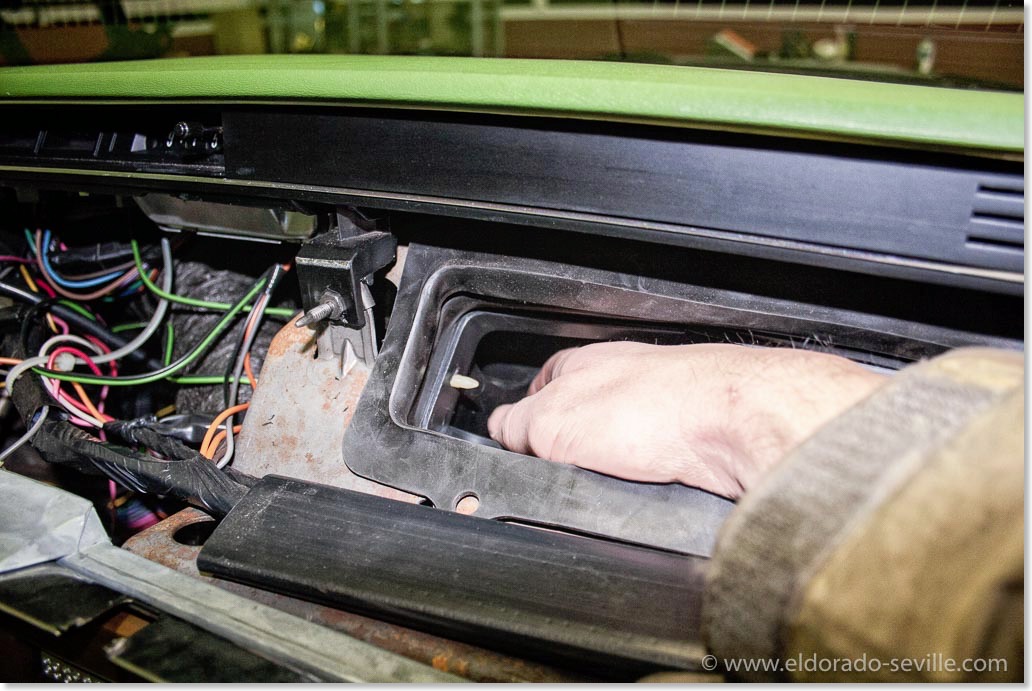
There are metal clips inside holding the left A/C hose in place. You have to reach in and unclip them.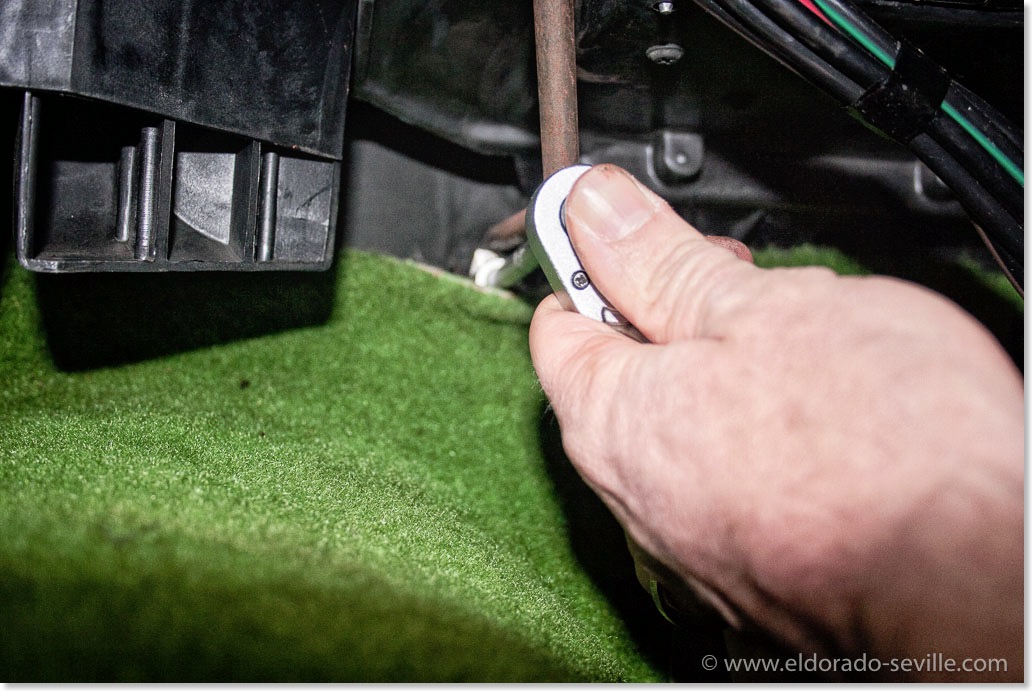
You will have to remove this support bracket.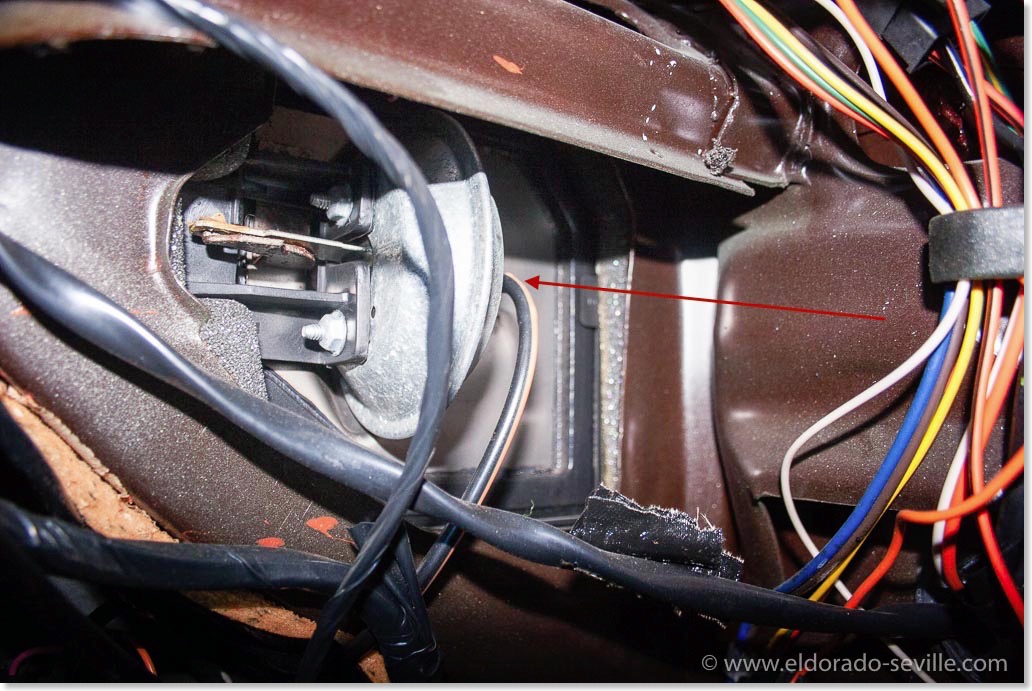
Recirculation door - un-plug the orange vacuum hose.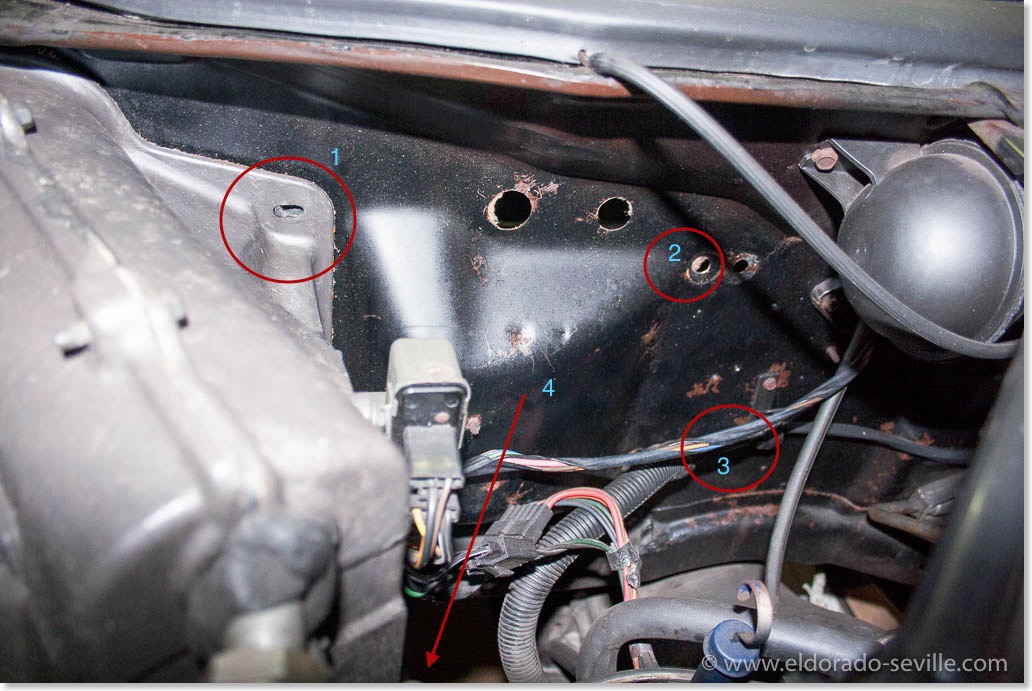
You have to remove these 4 screws/nuts on the firewall. You can access number 4 from underneath the car only. Number 3 is hidden underneath the cables.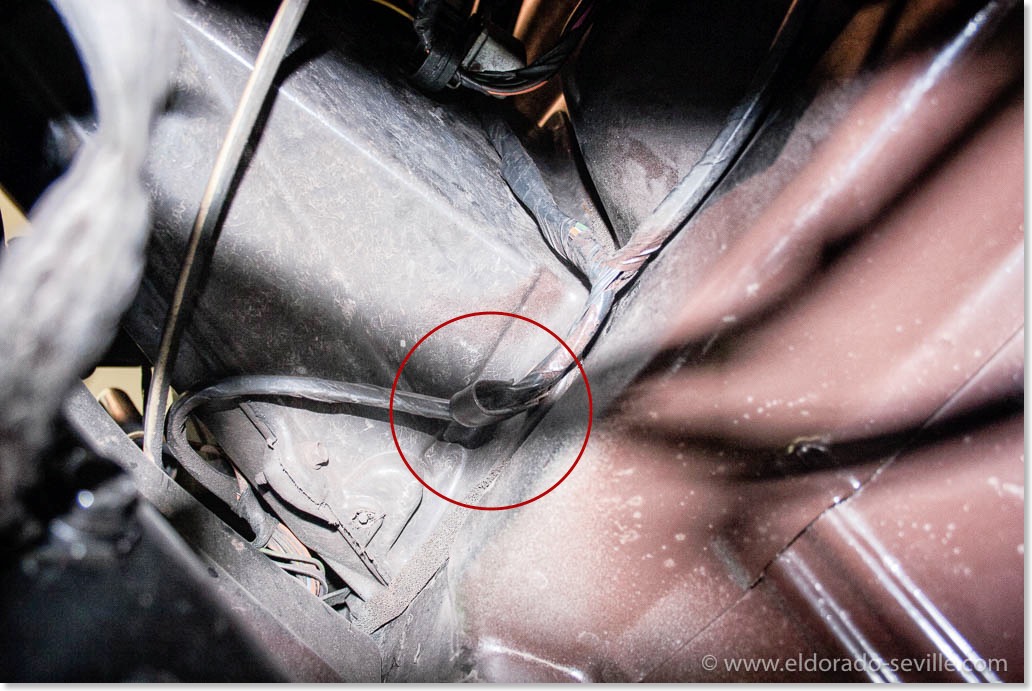
The number 4 screw on the cowl is holding a cable clip in place and the other end is the right bottom screw of the heater box - you need a second person with a 7/8 wrench to release it from the side under the car while you unscrew it from inside the car with a 3/8.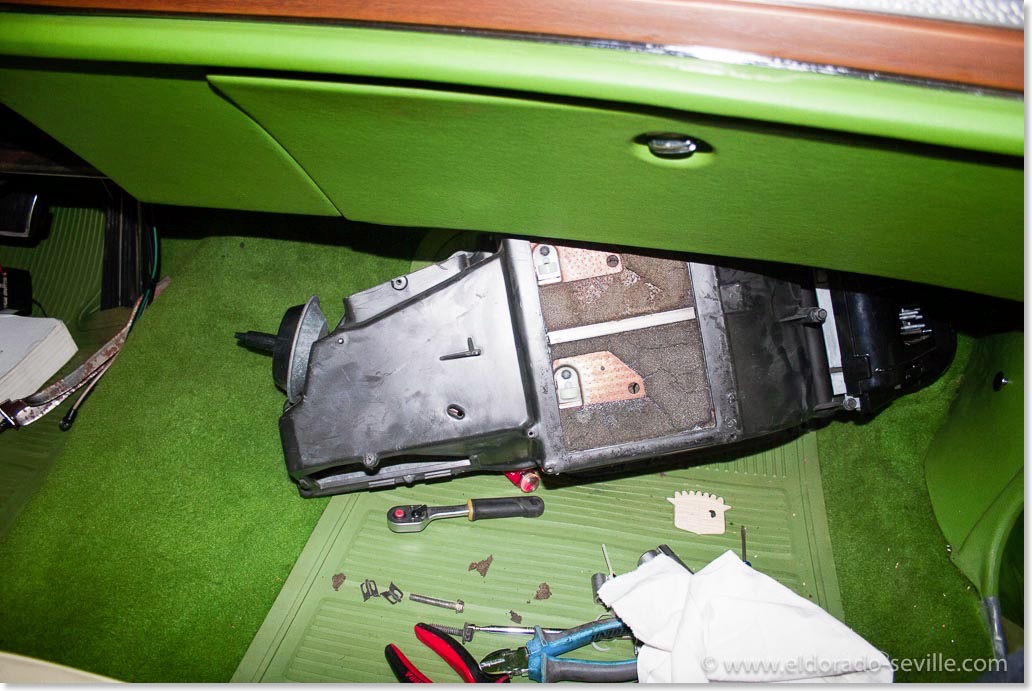
Once all the screws are off you can carefully remove the box. You have to slip it to the passenger side to get it out.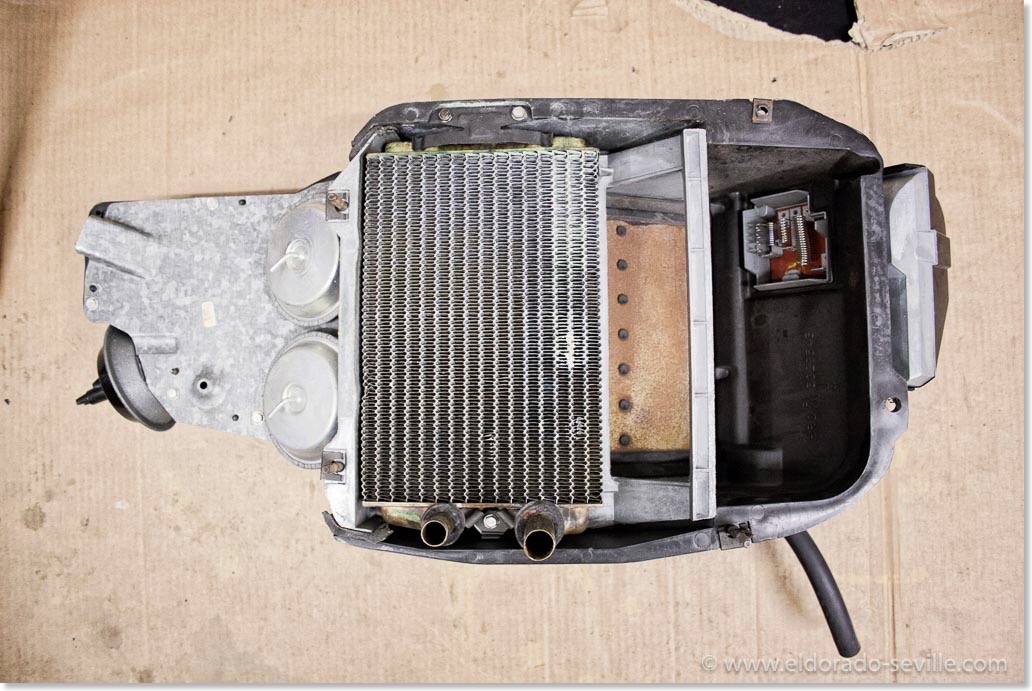
The old core in the heater case.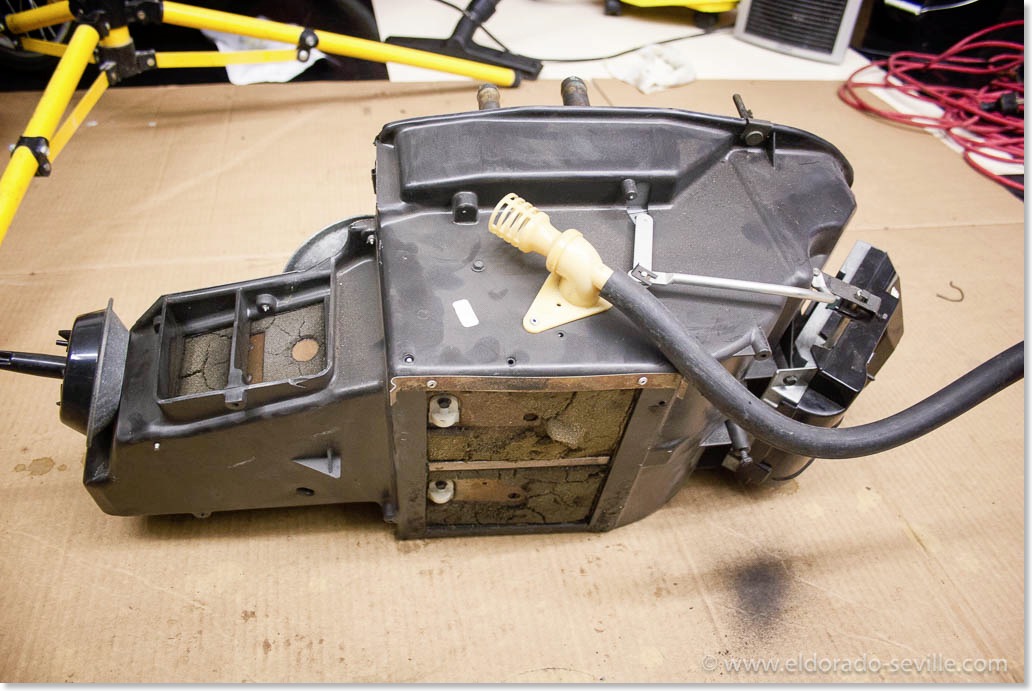
The 1974 Cadillac heater case and heater core. You can see the two mode doors here and on the right is the recirculation door. The thick hose on top is the aspirator hose going to the temperature sensor in the dash.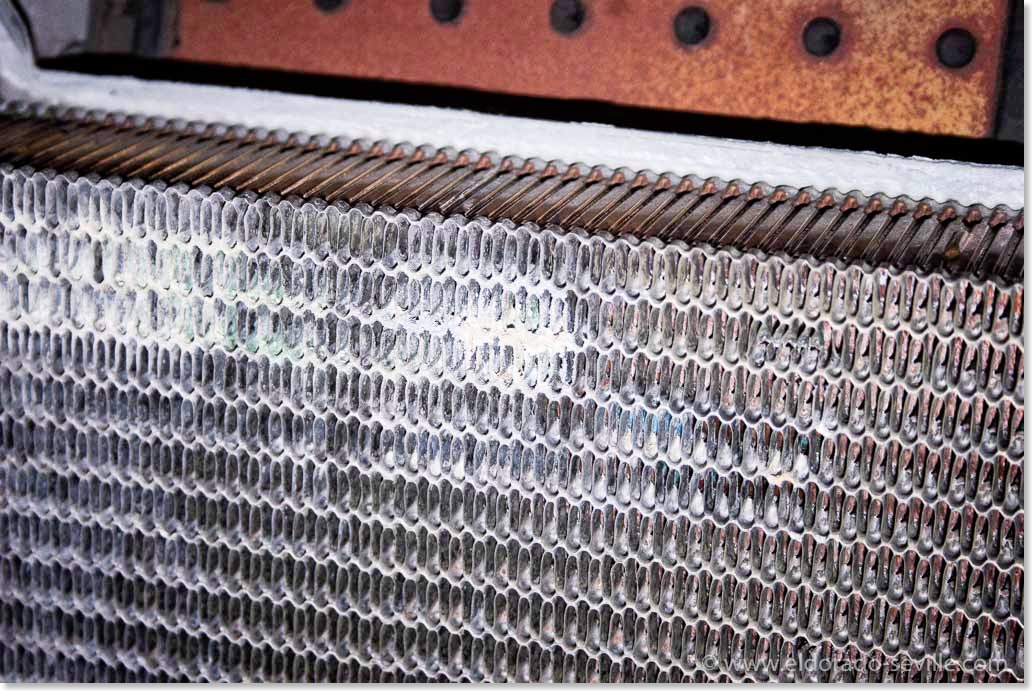
This is where the old core had developed a leak.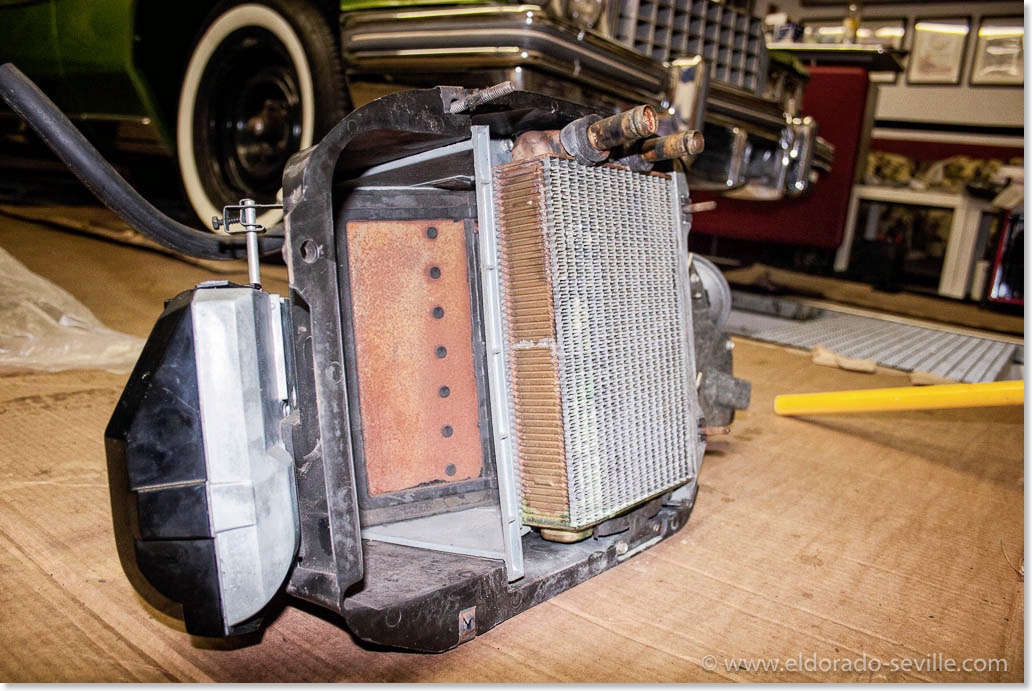
The old core still in place. Note the rubber seals on the tubes of the heater core. You have to move them over to the new core.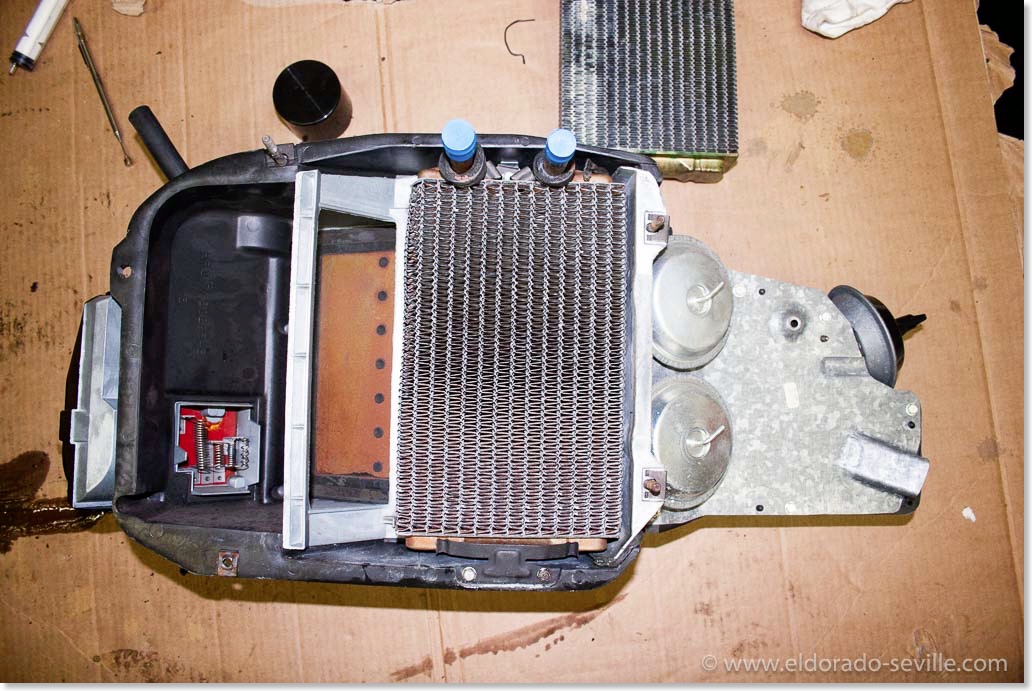
The new heater core in place. I got mine from rockauto.com. Its very similar - the only difference is how the two tubes are braced to the core, but that is no problem at all.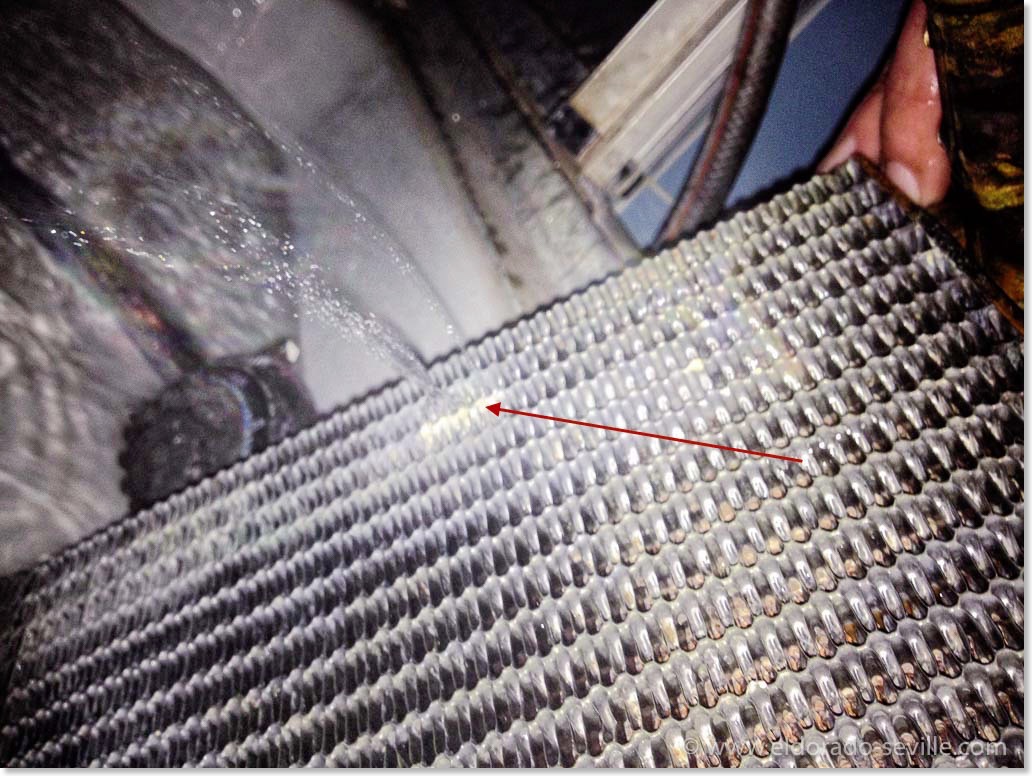
Out of curiosity I checked where the old core was leaking, and the leak was pretty obvious as you can see.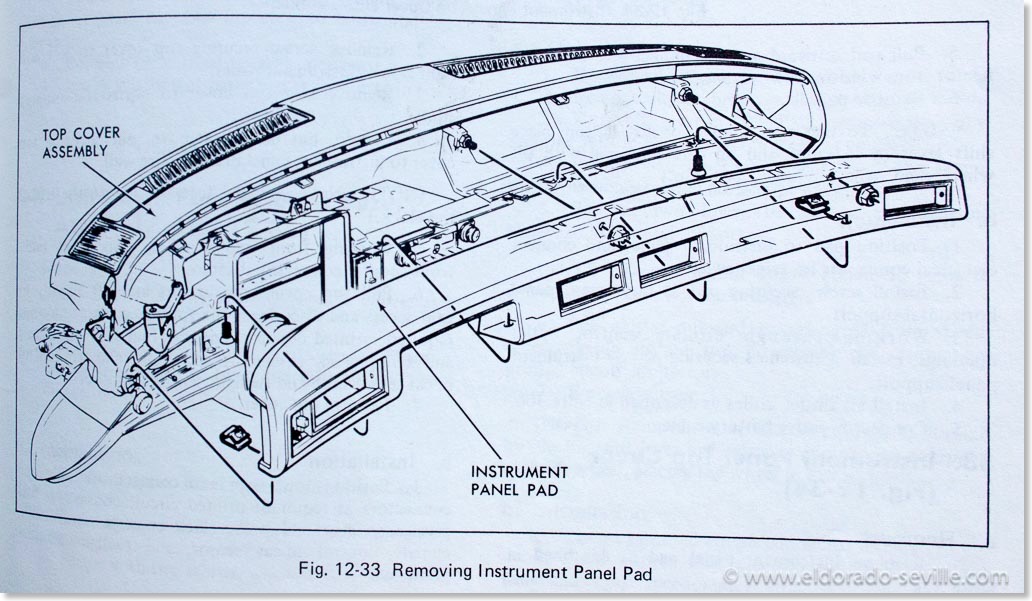
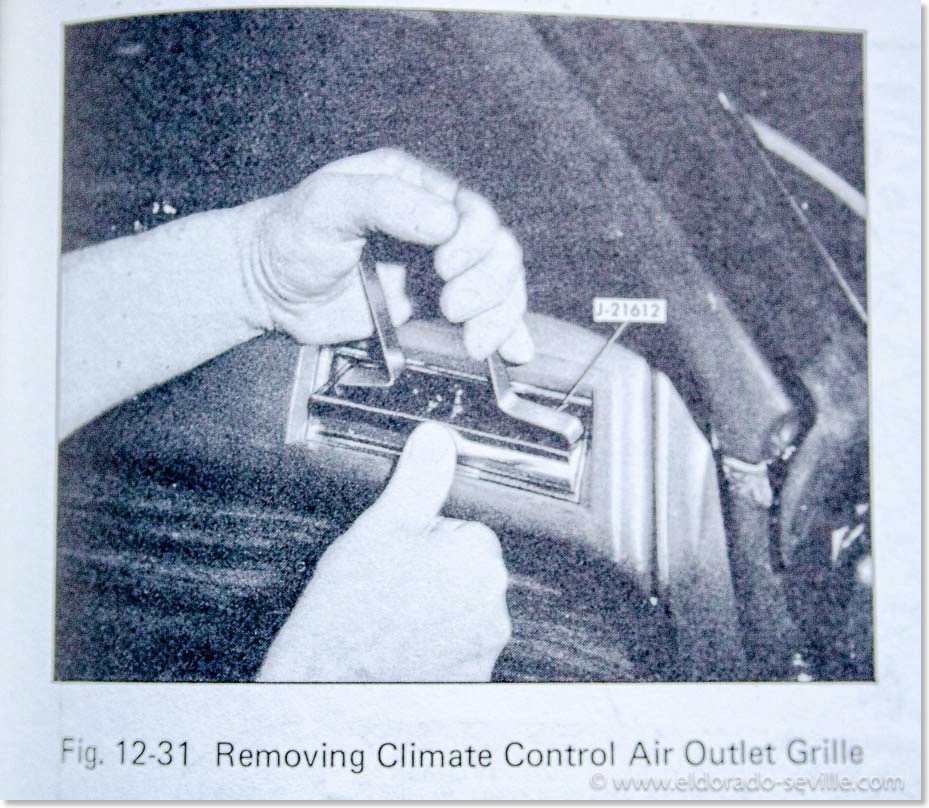
I just used two flat screwdrivers instead of this special tool.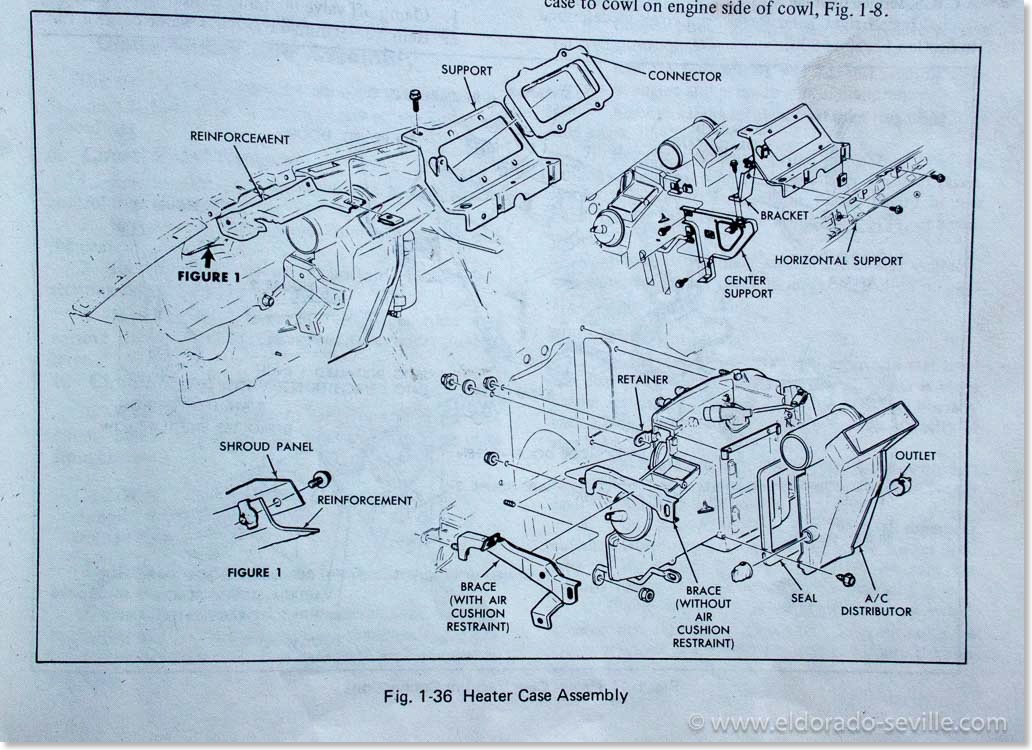
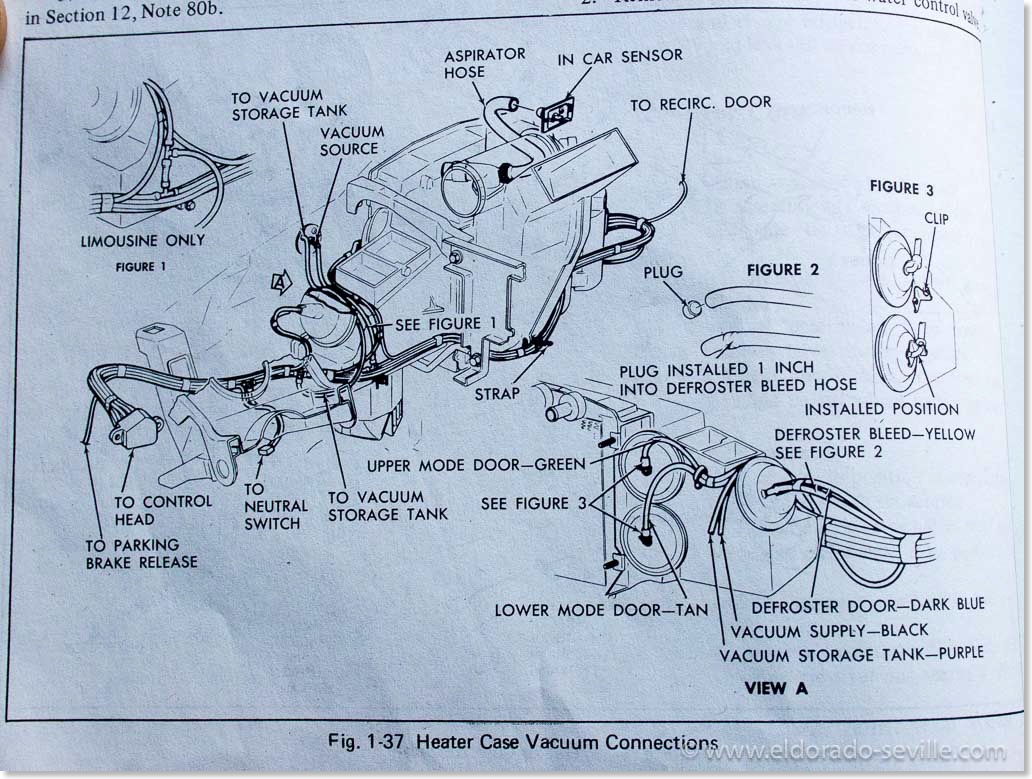
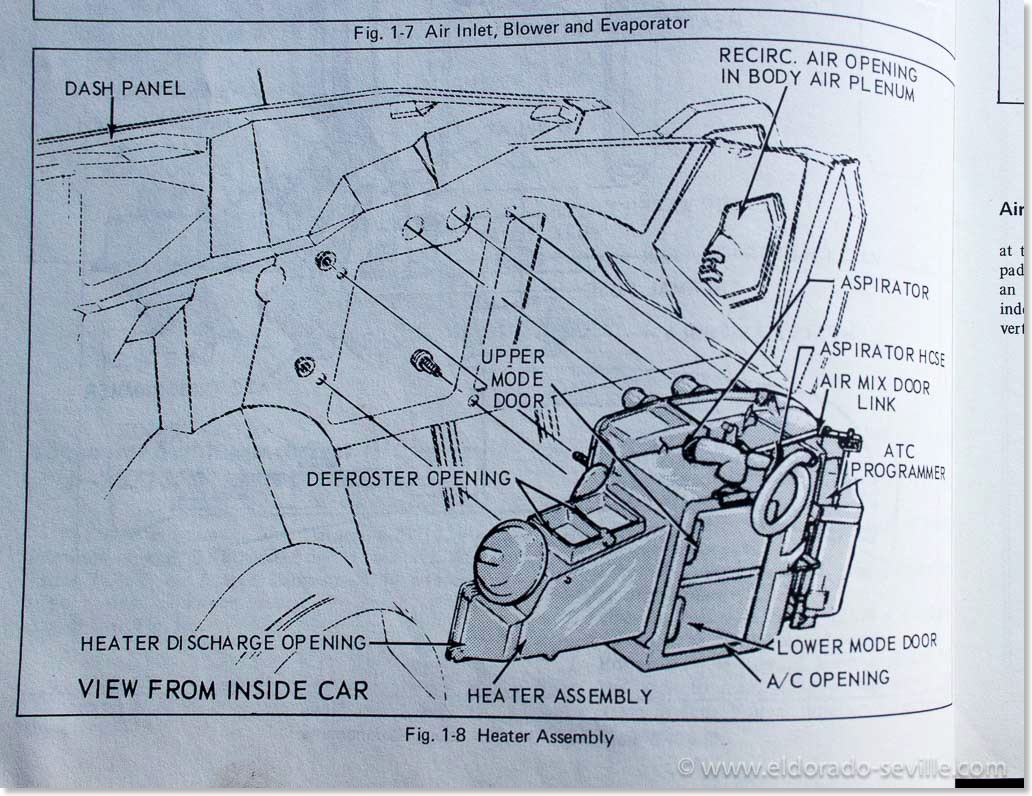
Additional information for Eldorado owners regarding the heater core:
Dan Mercer reached out to me and wrote the following: (Thanks Dan for letting us know!)
As a favor to Eldorado owners who will undoubtedly come across your repair process and use it in the future, would you be so kind as to add one addendum to it?1976 Eldorados have a FIFTH fastener attaching the heater box to the firewall! For the life of me I can't really figure out how this would have been necessary on an Eldorado but not a DeVille, but it's true. The 7/16's screw that needs to be removed is just above the right side of the ATC, in between the upper attachment and the lower one you have to get at underneath the car. Due to where it sits somewhat behind the ATC, it's impossible to see from any angle in the car.
I've attached pictures below.
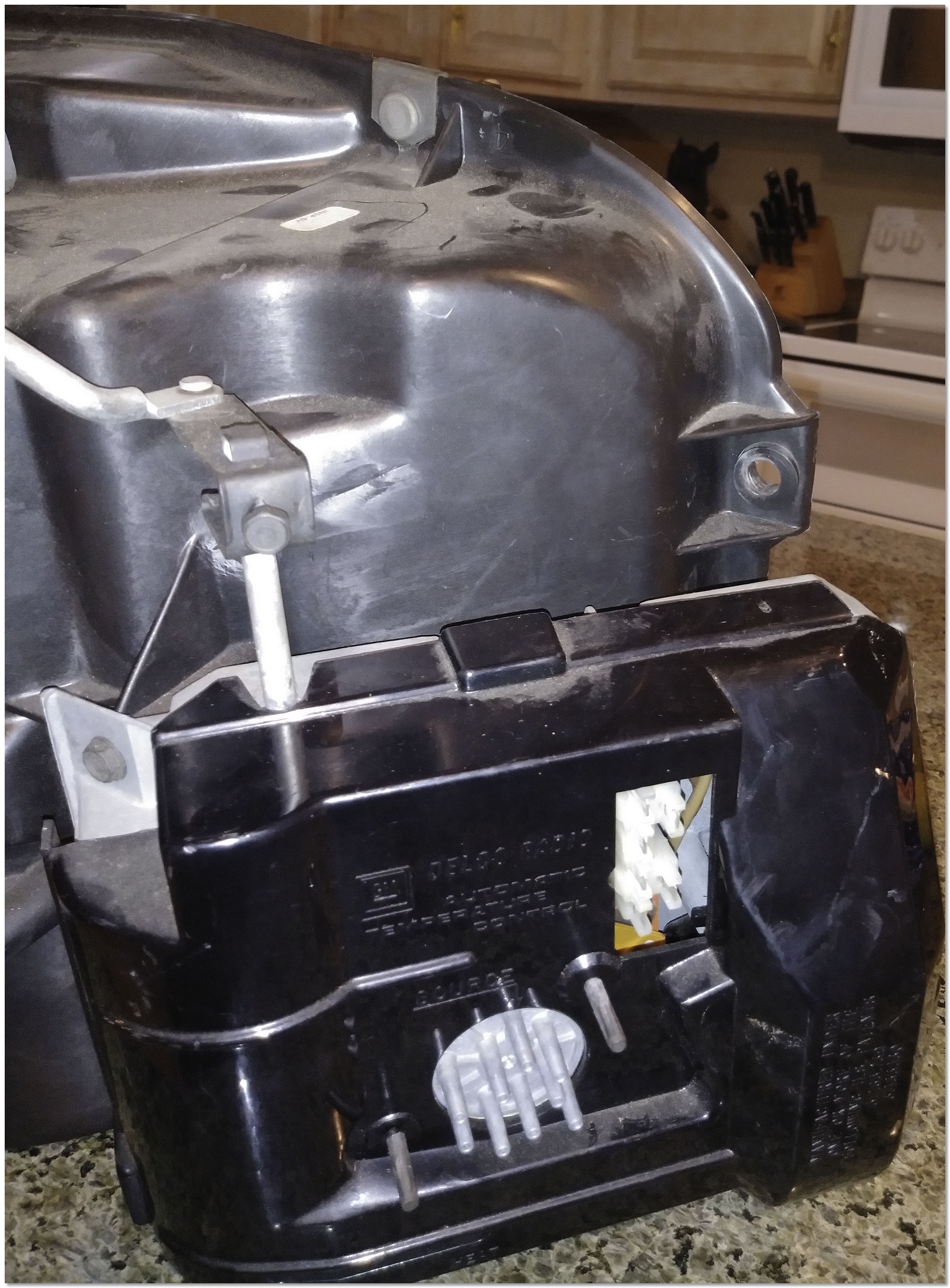
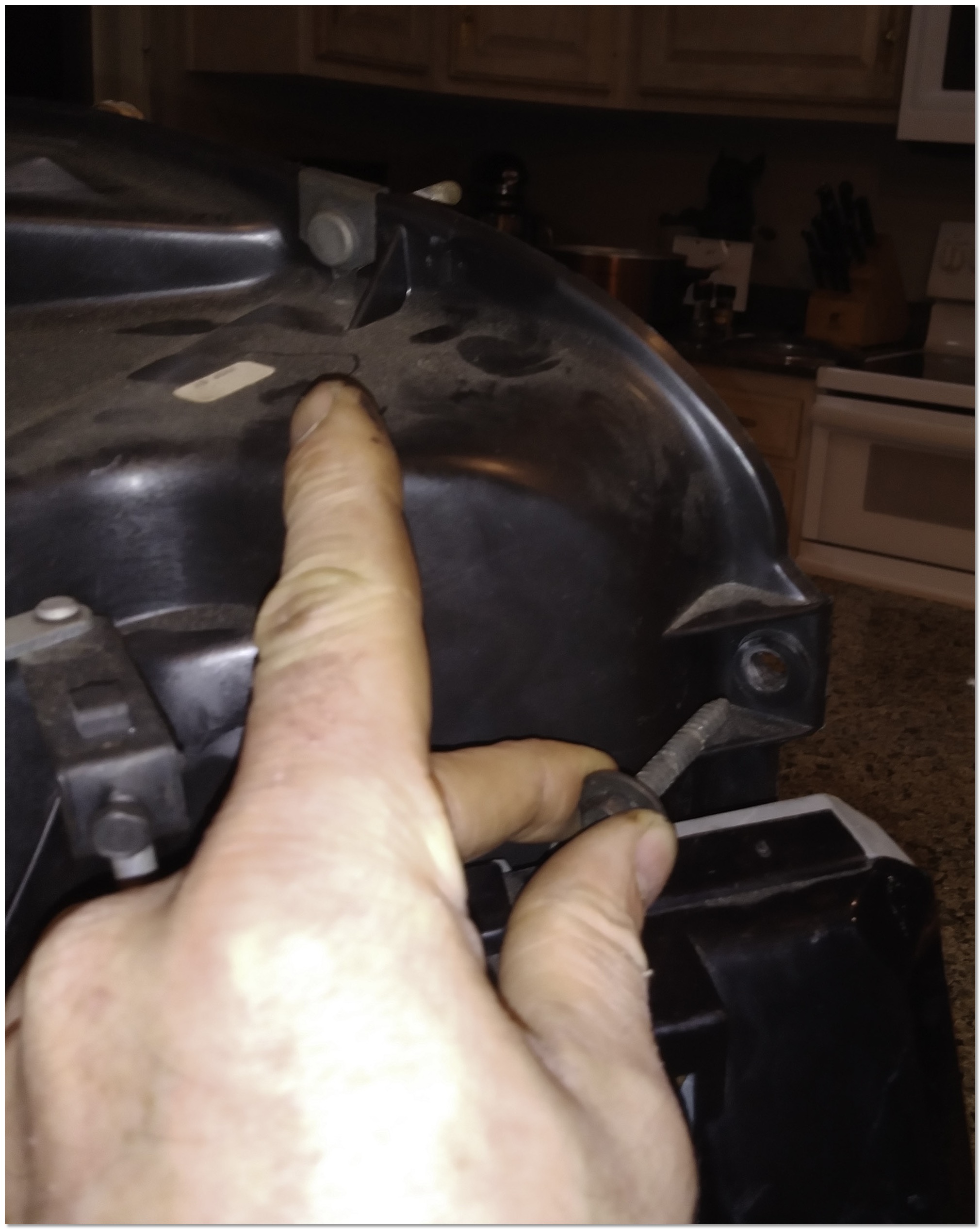
1967 AND 1968 CADILLAC ELDORADO HEADLIGHT ACTUATOR REPAIR ARTICLE UPDATED
After many years they tend to fail for many owners of the 1967 and 1968 Eldorados.
One company has offered a reproduction, but from the experience some people made with it, it was said that it was very poorly made and extremely expensive. I can´t tell anything about it from my own experience though.
But there is a better and much cheaper solution to the problem in the form of a modified reproduction 1969 Camaro RS actuator which is readily available. I´ve written an article a couple of years ago what could be done and I have now updated it, as one reader sent me some excellent description and pictures of how he modified the Camaro actuator to work perfectly on his 1968 Eldorado.
Thanks for the tip Mark Maromonte from Marks Truck and Auto Repair.
REPAIRING THE WONDERBAR RADIO OF THE 1958 CADILLAC SEVILLE
Another Cadillac fan I know who likes to try to repair old things and especially older tube radios wanted to give it a try. So the radio came out of the dash.
After his first investigation it soon turned out that the vibrator inside the radio was inoperative.
We could not find a new one - so he decided to cut the aluminum tube with the vibrator inside open.
He ordered a couple of other parts and somehow managed to repair the original vibrator.
I have no clue how he managed to do that and what he did exactly - but I now have a working AM - “Wonderbar" radio inside my 58 Eldorado Seville and for the first time I can proudly say that EVERYTHING works on my 58!
He also managed to repair the speakers on the 1966 and I have a perfectly working radio on this car as well now.
REPAIRING THE CLOCKS OF THE 1958, 1966 AND 1967 CADILLAC
So it was time to service some of the clocks which stopped working over the years.
The clock in the 66 did not work at all.
It's extremely simple to remove on the 66 as you can get it out of the instrument panel by just unscrewing one bolt.
The clock was very dirty in the clock work and needed a good cleaning and some good lubrication. Also the contact of the coil was a little worn and this was fixed. It then happily ticked back to life and now works perfectly.
The clock on my 58 stopped working a couple of years ago. So it came out as well. It's a little more complicated to get it out though...
When it was finally out - it could be seen that the coil was burnt and that it needed some very good cleaning as well. Some of the melted insulation material was all over the clock mechanism and of course I had no spare coil for it - so the original one had to be rewound with some good wire from a left over light solenoid...
Wow - this really took a while - but now the clock works perfectly again!
I was not so lucky with the clock on the 67 Eldorado which only worked when the car was warm. To take it out you have to remove the upper dash and then get out some light bulbs and disconnect it from the printed circuit.
It was also cleaned and lubricated and the clock worked, but it made a very loud noise when the coil rewound the spring of the clock.
The sound got better over night, but then the clock stopped working completely... It's a Westcox clock which uses a double coil and is much more complicated to rebuild than the Borg clocks. Its also almost impossible to find parts for it, as Borg clocks are much more widely used.
Looks like I will need a new 1967 clock and replace it with a Borg unit :-(
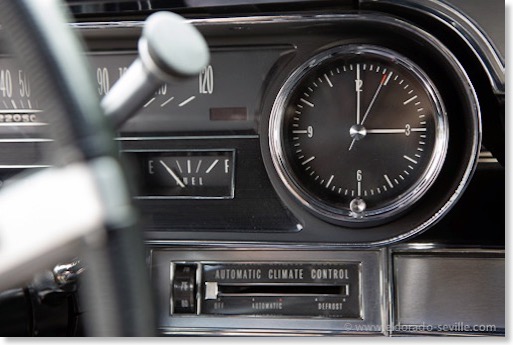
The clock in the 66 is now working perfectly again.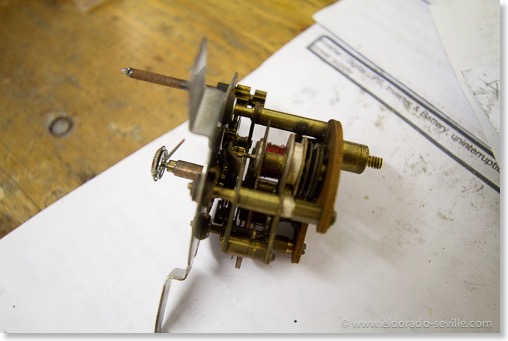
The disassembled clock of the 58 Eldorado.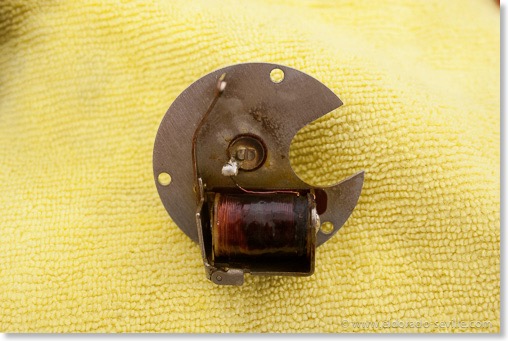
The coil was burnt on the 58 clock.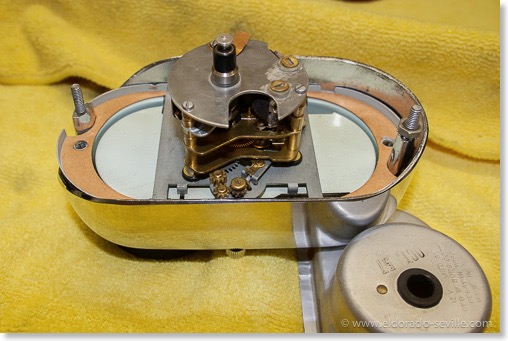
Fully cleaned clock. 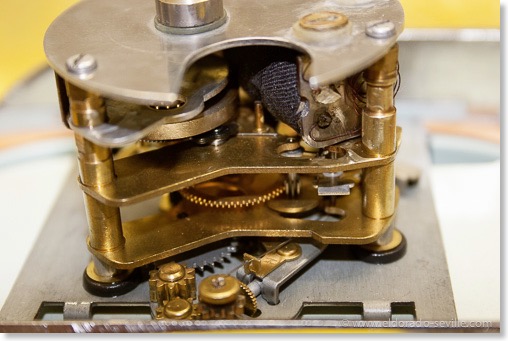
Back together with a rewound coil.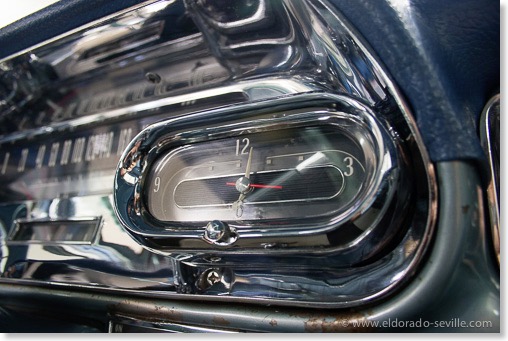
Back in the car - working perfectly again.
1967 Eldorado headlights did not work
When I took the car out of the garage I noticed that the headlights did not come on, but the taillights worked.
I suspected that the light switch must be the problem... I unplugged the connector of the switch and tested if 12V power was coming to the switch through the wiring.
There was one hot wire and I connected it directly to the headlights and they came on.
I then wrongfully assumed that the switch must be the problem then...
So I decided to take it out and inspect it.
Getting this switch out is a real pain as there is one screw thats almost impossible to reach. You can only get to the switch from underneath the dash btw...
It took me a couple of hours to get it out lying on my back under the dash...
I then opened up the switch and when I opened it up it fell apart immediately. I had a really hard time getting it back together correctly. Before that I cleaned everything inside.
I measured it with the multimeter and everything was fine.
Getting the switch back into the car was even more difficult than taking it out... There is this one d*mn screw thats almost impossible to get back in. Try to avoid to take the switch out, as you can measure if it works with the multimeter. I did not read the electrical diagrams carefully enough, so I did not measure it correctly and so I took it out.
!!! Be aware that the headlight switch on the 67 Eldorado is almost impossible to find, as it is a very special switch with the vacuum valves! If yours has twilight or auto dimming its even harder to come by!!!
As it turned out my switch was o.k. and the headlights did not work for another unknown reason... So I googled the problem and to my surprise I found my own website with a solution!
I had completely forgotten that I had the very same problem with my headlights a couple of years before and found a solution back then. I was just lucky that I do use my website as a sort of diary for the repairs I do on my cars.
As it turned out the same fusible link had burned through again. It runs very closely to the headers to the starter on the positive battery cable. Maybe it got too hot and failed or just broke apart. I could not see any melting or signs that it had burned through. It looked fully intact from the outside and I could only see that it was defective when I removed the insulation...
To replace the fusible link you have to take out the positive battery cable and replace the fusible link. Thats not a big deal. I rerouted the cables a little bit this time and hope that it wont fail again.
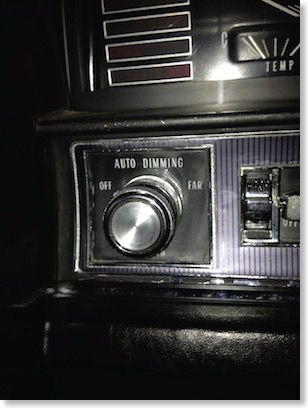
The 1967 headlight switch with automatic dimming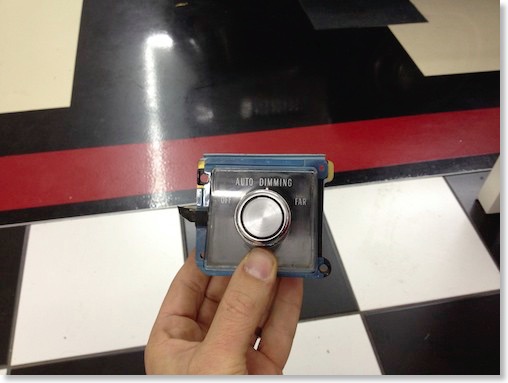
the light switch out of the car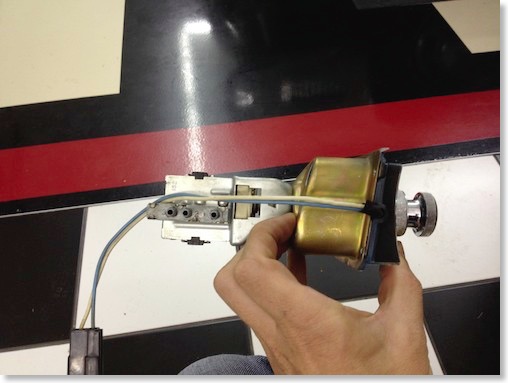
Seen from the side - you can see the vacuum valves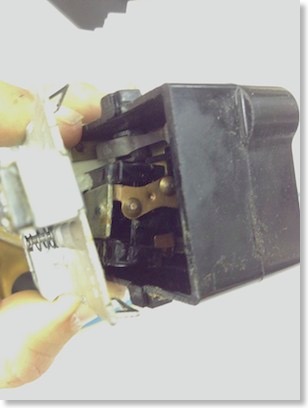
Be very careful if you take the switch apart - as some parts will fall out...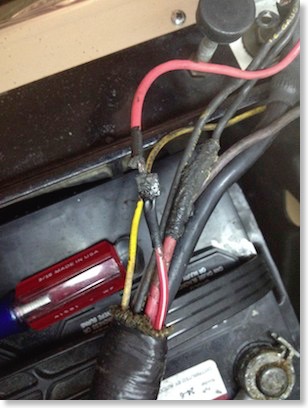
The red cable on top is a fusible link and it caused the problem. I could not see from the outside that it was broken under the insulation.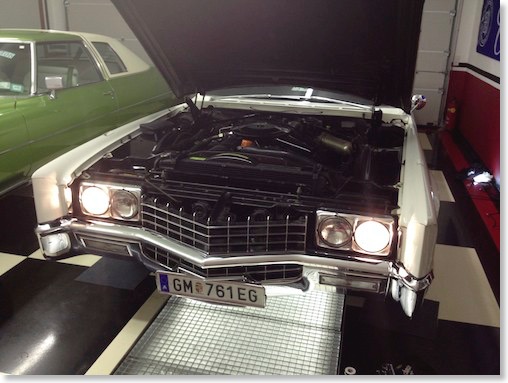
The headlights are back in working order
Fixing the 1978 Cadillac Eldorado´s ATC programmer. The AC works again.
****UPDATE****
An update to the article below can be found here as I had to repair the programmer again in May 2015:
The air-condition in my 1978 Biarritz did not work correctly. For some reason the system always stayed in full AC mode and no matter to where I put the temperature dial on the control head I could not get the heat on, no matter what I tried.
The shop manual is very helpful in trouble shooting the system. Its covered in the 1977 factory shop manual (FSM) as there were no changes made to the system in 1978.
It took me a while to fully understand how the system works - so I had to read the FSM multiple times to get the grip what is going on in the system.
First I inspected all the vacuum lines in the car to make sure that there was no leak anywhere, as the heating mode requires a very high vacuum at the vacuum motor in the controller.
All lines were in very good condition. I also checked the control head connections in the dash which were good as well.
I then suspected the vacuum motor in the programmer as it did not move. I removed the programmer from the car. You can access it from underneath the dash on the passenger side or even better if you remove the glove box lining through the glove box.
From there you only have to unscrew 5 screws, unplug the wires and the vacuum lines to get it out.
When I had it out of the car I checked the vacuum motor. I just sucked air through the hose and it moved and held vacuum perfectly.
The transducer or the amplifier in the programmer were most likely the problem.
When I checked the transducer which regulates the vacuum supply to the vacuum motor, I noticed that it seemed to not be connected to the electrical board as it should. I pressed it in, so that it made good contact with the board again and put the programmer back into the car and connected everything again.
***UPDATE 2015 - its not connected with pins but soldered to the circuit board - 3 of this soldering points were broken - the “repair“ I made here only temporarily worked. You have to check the soldering points for a permanent fix***
I started the car and the AC came back to life again immediately. I could see how the vacuum motor went through all the modes as it should according to the position of the temperature dial on the control head.
The build quality of the programmer obviously is not very good and the transducer somehow came loose causing the ATC to not work as it should. ***Update 2015 - it did no come loose but the soldering points broke***
After I tested everything I put the parts back together and can now enjoy a full working ATC in my 78 Biarritz again ;-)
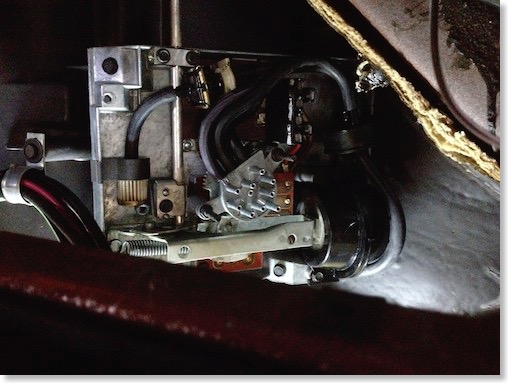
The programmer as seen through the glove box with the connectors and the plastic case removed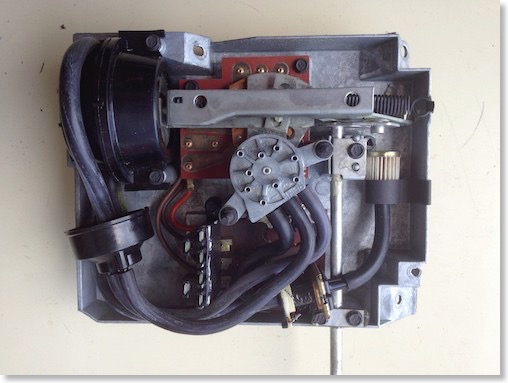
The 1977 / 1978 Eldorado MK II Automatic Temperature Control Programmer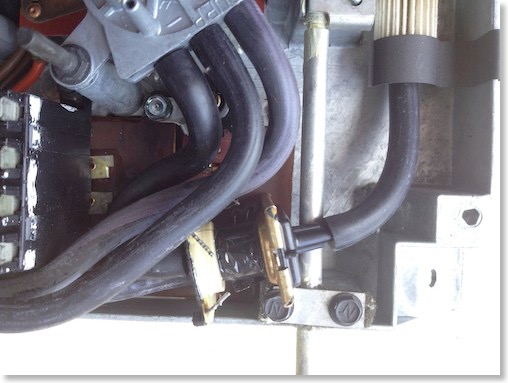
The transducer which caused the problem (the golden part with the single vacuum line going into it)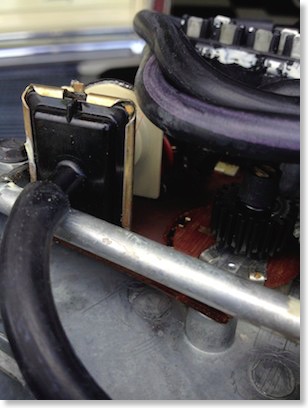
The transducer is connected to the electrical board through a couple of pins - it was not connected properly and somehow became loose over the years - that was why the system did not work.
***UPDATE 2015 - its not connected with pins but soldered to the circuit board - 3 of this soldering points were broken***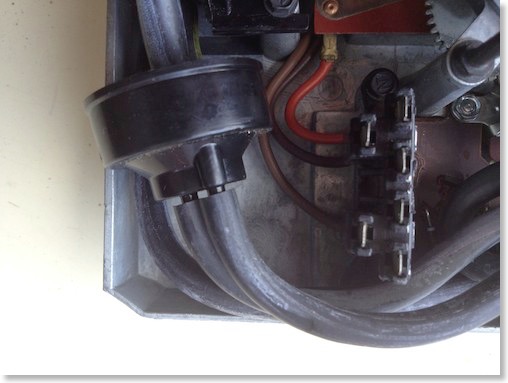
The vacuum checking relay and the electric connectors.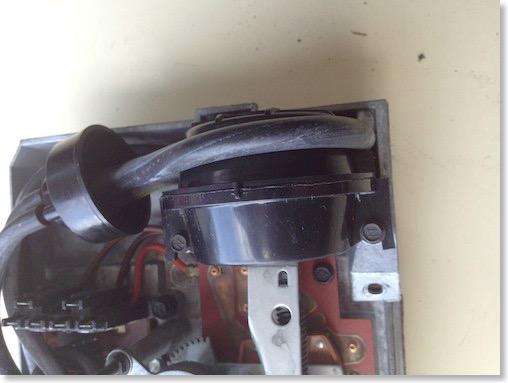
The vacuum power motor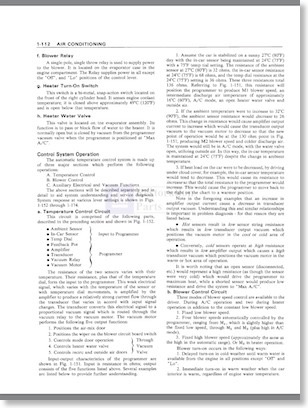
from the 1977 FSM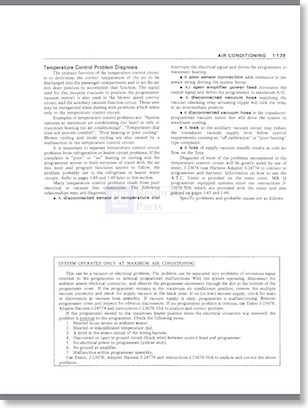
Trouble shooting guide for when the system works in full AC mode only.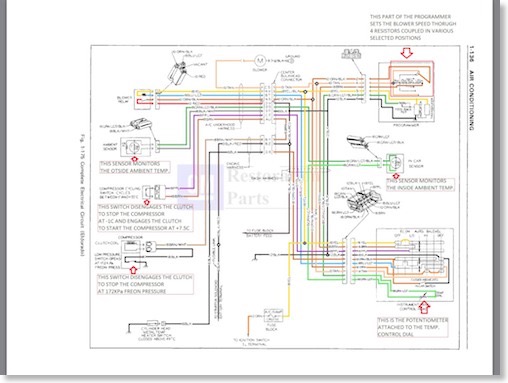
A color coordinated electrical schematic with annotations to describe the various functions of the system.
Detailing the paint of my 1978 Biarritz.
My goal is to make this mint car as good as it can get, while keeping everything as original as possible.
I´m really obsessed with cleanliness when it comes to cars... Everything has to be completely detailed and shining like new.
I completely cleaned the entire engine and gave it a good wash and afterwards applied some engine dressing.
I then removed some screws and small parts which were left unpainted by the factory, like some screws, the hood latch, some brackets and some other smaller parts. Of course these parts developed some slight surface rust during the last 36 years...
As I had no real rust dissolver at hand, I soaked the rusty parts in vinegar over night, which completely removed all the surface rust. I then gave these parts a coat of primer and painted them with Eastwood paint, which looks like bare metal.
With this method I can keep the rust away, while the parts still look original. Only if you look very closely you might see that these few parts are now painted...
I then started to bring the original single stage paint back to like new condition.
I used a couple of Meguiars compounds and polishes to make the paint as smooth as possible. I had to carefully wet sand some of the deeper scratches with 2000 grit paper. Be very careful when doing this as the single stage paint was applied in only VERY thin layers during the 70s.
The car now shows almost no more paint imperfections and the swirl marks are gone. The original paint looks like on a new car now and is extremely shiny. When the car is out in the sun its almost blinding.
I sealed the paint with Meguairs #16 wax.
I used a Meguiars DA polisher (G125) for the paint correction work - which is not really that good, but I would like to have a more powerful machine for the future like the Flex 3401 or the Rupes Bigfoot .
I used the procedure explained in the following video for my paint correction:
Download his description as PDF file here
This gentleman, Larry Kosilla, has a lot more awesome video tutorials for people who love detailing their cars. Check him out!
I also started detailing the interior of the car. I treated the leather with Gliptone Leather Conditioner - which is the best conditioner I have tried so far. It really makes the leather very soft.
I´ll have to steam clean the carpet once its really warm outside so that it can dry fast afterwards.
I also cleaned the undercarriage a little and removed some of the factory applied undercoating from components where it does not belong to, on which they sprayed it on very carelessly at the factory. Looks much better now.
The car really looks spectacular already - I´ll continue with the chrome and stainless steel trim now. It should be shining in fully glory for the 2014 season beginning in May and also be ready for various car shows, especially the Cadillac BIG Meet in August.
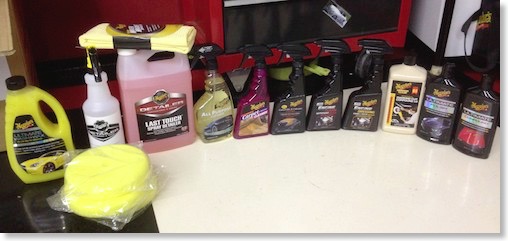
My weapons of choice came from the Meguiars dealer...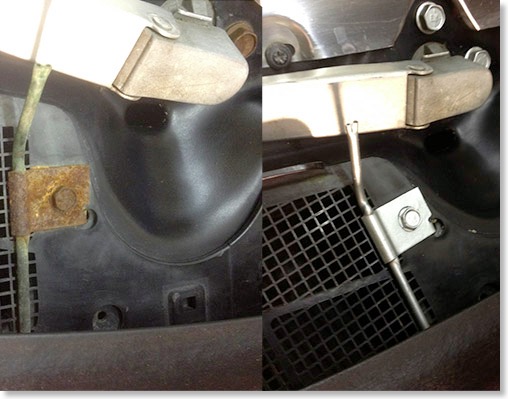
before and after cleaning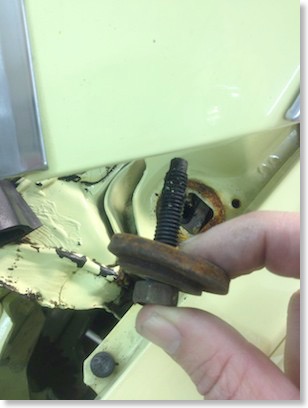
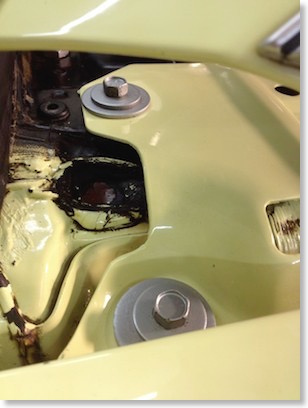
rusty bolts before and after cleaning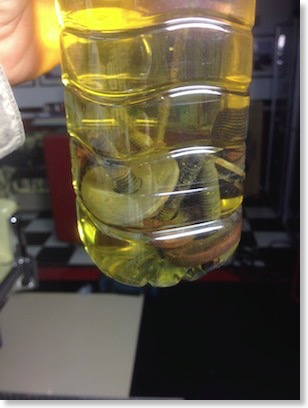
Soaking rusty parts in vinegar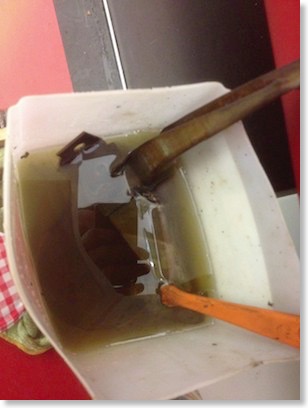
Cleaning more rusty parts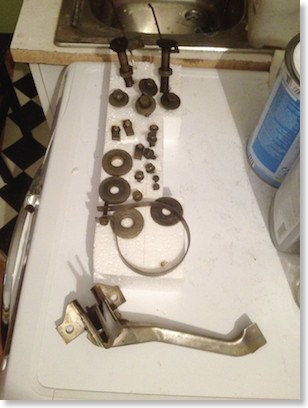
with the rust removed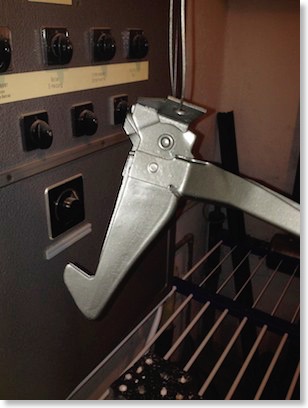
The Hood latch cleaned and painted with Eastwood Silver Cad Paint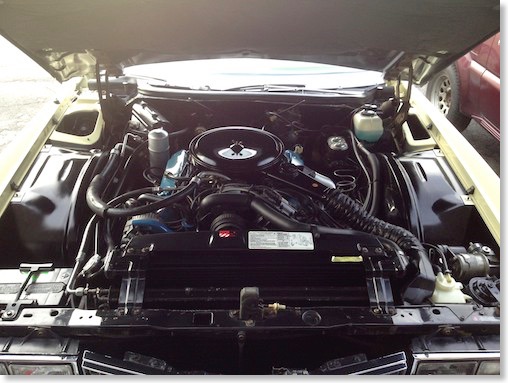
The cleaned engine bay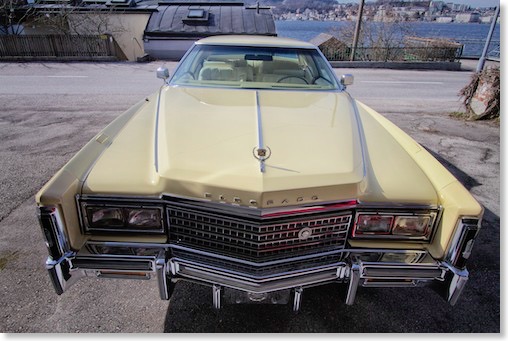
The car after polishing the paint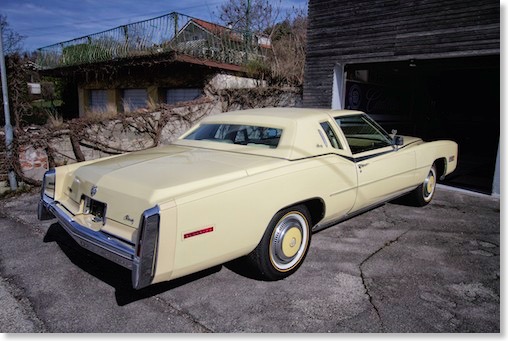
the polished paint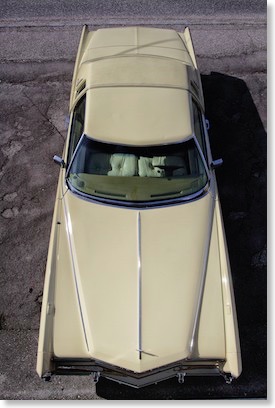
very shiny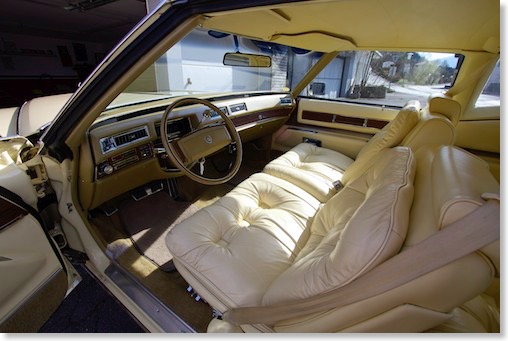
Besides the carpet - the interior is already perfectly clean. The original floor mat is under the aftermarket mats.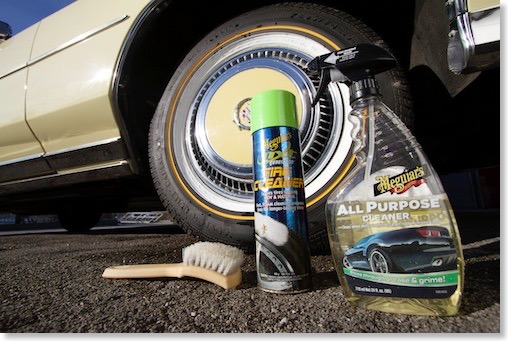
Cleaning the Vogue tires.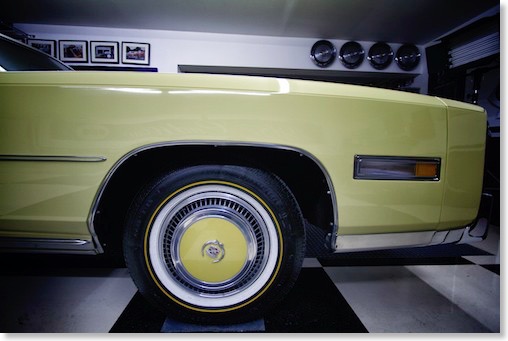
Clean paint and tires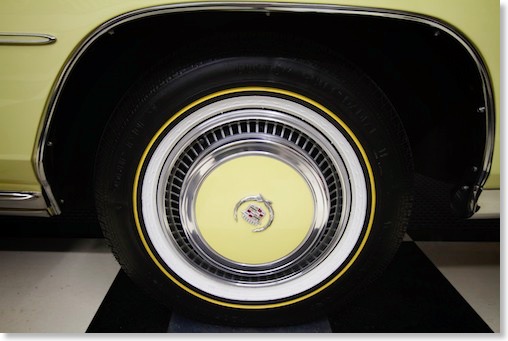
Clean tires and perfect hubcaps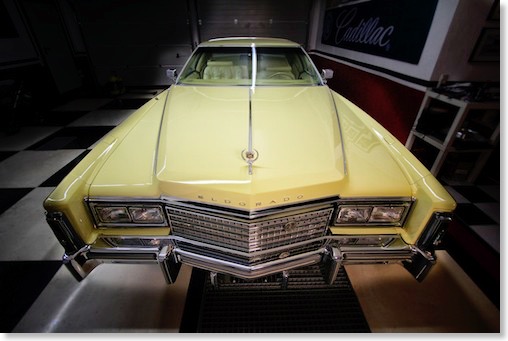
Before waxing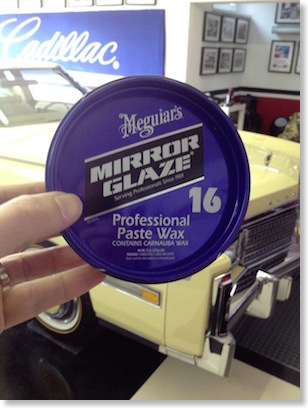
I really like this Meguiars wax. Its one of their cheapest but best waxes. A gentleman from Meguiars once told me that it is one of their oldest waxes, but contains a lot of carnauba wax, which makes it so good! Its also offering the best protection of their product range.
Here are some links to Meguiars products I like to use (link to german Amazon Shop):
1978 Eldorado - Choke problems.
The only way I could get it to normal idle speed was to manually release the fast idle cam on the carburetor. For some for me unknown reason it did not release itself - even when the car was fully warmed up...
As I´m not exactly an expert when it comes to carburetors, it took me a while to figure out what was going on and what the problem could be.
I got myself the Rochester M4MC / M4ME Carburetor Manual online and started reading. The trouble shooting section did not mention my problem and symptoms though, at least I learned a lot by reading through the manual...
The carburetor in my 1978 Eldorado is a Rochester M4ME # 17058531 (late Federal).
After a lot of reading I suspected that the electric choke thermostat must be the problem.
I removed it to test it like it is described in the manual.
Electric Choke Diagnosis and Checking
In order to have good engine performance during warm up and be able to pass Federal exhaust emission standards, the electric choke must function properly .
Possible reasons for the choke not operating properly are listed below.
1. No engine oil pressure.
2. Malfunctioning oil pressure switch.
3. No current to oil pressure switch due to:
a. Burned out 15 amp "radio -idle stop" fuse.
b. Broken wire to switch (18 brown/double white).
4. No current between choke coil and oil pressure switch due to:
a. Broken 18 light blue lead wire.
b. Wire terminal not locked on coil terminal.
c. Ground circuit incomplete between grounding plate of choke assembly and housing.
5. Failed choke coil assembly.
A voltmeter or continuity light may be used to check the circuits for continuity to the oil pressure switch and the choke coil.
If it is suspected that the choke coil assembly has failed, the following check may be made.
1. Remove coil from carburetor and cool to room temperature (above 60°F).
2. Attach a jumper wire between positive battery terminal and terminal of coil assembly. Attach a second jumper wire between negative battery terminal and grounding plate of choke coil assembly.
3. The tang of the coil should rotate 45°in 54 to 90 seconds.
4. If coil fails to rotate or exceeds the above timing specification, replace coil assembly.
5. If coil is within above timing specification then coil is good and problem is elsewhere.
6. Reinstall coil and set to proper index (Fig. 52).
If coil is cooled off sufficiently the choke valve will close when throttle is opened slightly. Attach a jumper wire between the positive battery terminal and choke coil terminal. Choke coil should warm up and the choke blade can be observed opening, indicating a good and properly grounded choke coil assembly. At room temperature the choke blade should be wide open in approximately 90 seconds.
If the choke does not operate properly after the coil has been proven satisfactory , check out the other possibilities that prevent current from getting to the choke coil.
After I performed the test procedure above it was clear that the choke coil was the problem.
I ordered a new one from www.rockauto.com and it arrived within 3 days. The manual mentions the original part #17059968 (the original one on my car showed #17059969 though - but every parts list I checked does not list this number...?).
I got a replacement from Airtex # 2C1045 and it seems to fit.
I installed it today and the choke works as it should again.
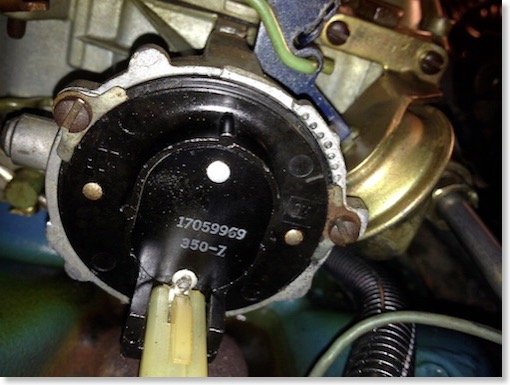
This was the original choke thermostat on the car . #17059969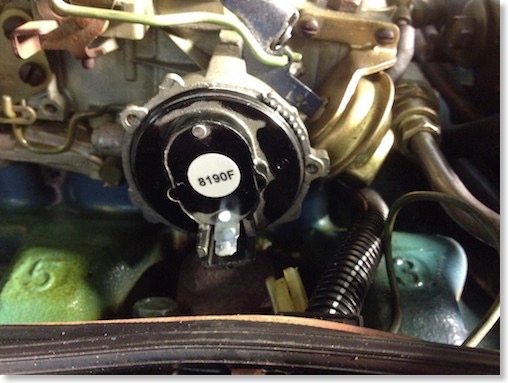
The Airtex replacement part in the car.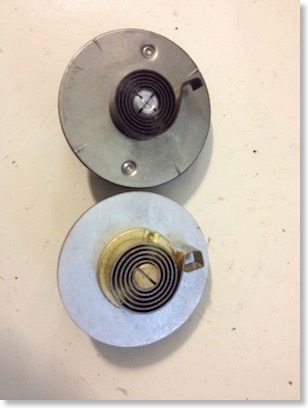
The original part and the new part - slightly different at the tang of the spring - but it works and fits perfectly...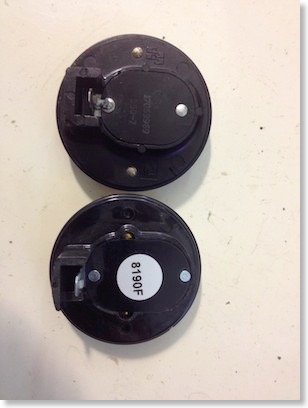
original and new part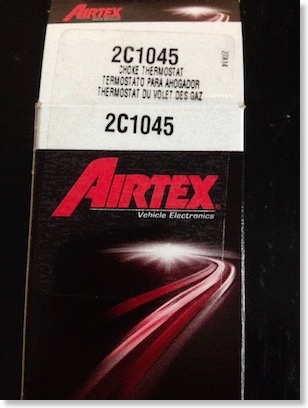
The Airtex replacement choke thermostat
1978 Cadillac Eldorado - defective door jamb switch repair.
I also have the same system on my 1971 Lincoln Mark III where I had some problems as well in the past with a loose wire.
On the Biarritz the passenger side worked flawlessly, but on the drivers side the solenoid would not engage.
I started my search for the problem at the top of the two door jamb switches which is the one controlling this function.
When I wiggled it and pulled it out, I could hear the solenoid engage. So I knew that the problem must be with this switch.
Unfortunately it's not easily accessible. As I do not have the 1978 shop manual yet - it took me a while to figure out how to access it.
I managed to get to it through the lower dash and to uninstall it.
As it turned out it was slightly bent and did not make good contact once the door was opened.
I carefully bent it back straight - and after some trial and error it was back in working order.
It took me a good hour to fix this.
Now I´m back to cleaning the car to my standards, something that will probably take the whole winter...
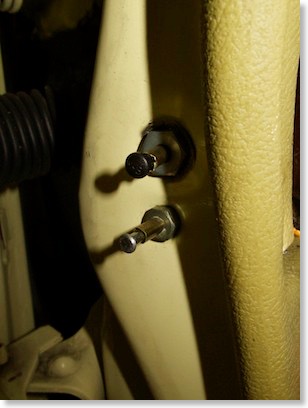
The upper switch is controlling the seat back solenoid. (Picture was taken before cleaning the door jambs...)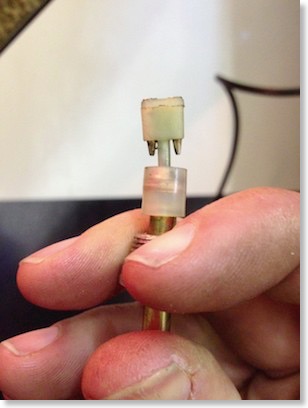
The removed door jamb switch. When the door is closed no contact is made and the solenoids are not energized causing the seat back to be locked in position.
You can see that the switch was slightly bent - making no good contact.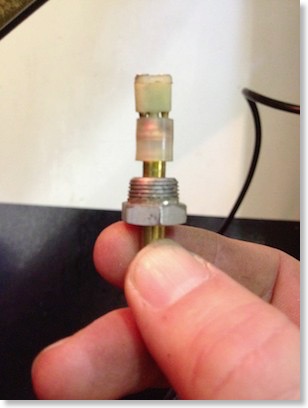
When the door is open contact should be made and the solenoid should energize... The switch did no longer make a good contact though.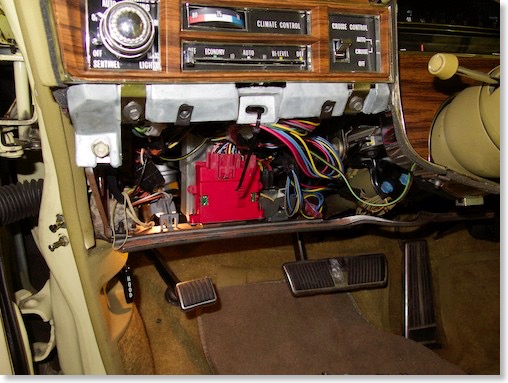
I had to remove the lower dash to access the cables on the rear of the door jamb switch through a tiny hole and disconnect the connector with a long nose plier...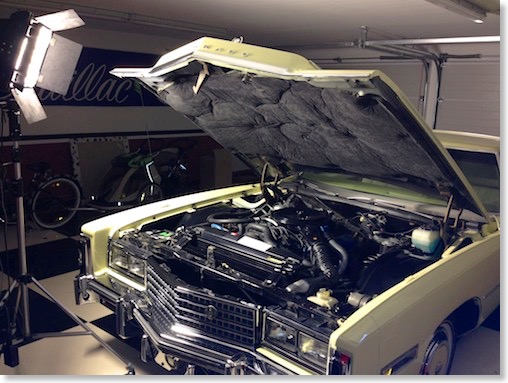
I´m now in the long process of thoroughly cleaning the engine bay to look like new again...
My 1967 Eldorado Article in the German Cadillac Club Magazine.
The Cadillac Club of Finland will also feature this article in one of their next club magazines.
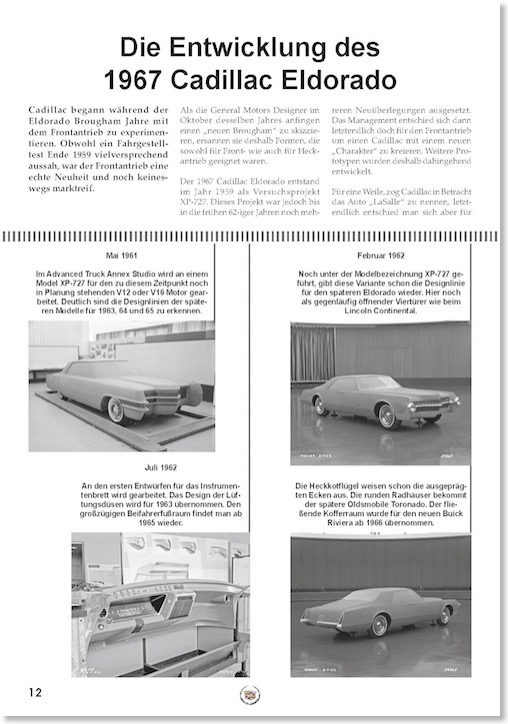
The first page of the article © "Der Standard"
The 1978 Eldorado Biarritz has arrived.
You can read more about how I found it here.
This morning I got a call from the truck driver that he got lost in my town with his big truck. So I had to find him and guide him near to my home to unload the truck.
The 78 rode on top so all of the other cars had to get unloaded first.
The Biarritz was quite dirty after its long journey and probably saw snow for the very first time.
I drove it home the short distance from the parking lot and it absolutely drives like a new car. I thought the car had stalled - but the engine simple is so quiet and is running so well that you can't hear or feel it from the inside...
Also the transmission is shifting unnoticeably.
My little boy helped me washing the car upon its arrival at my garage, which was not an easy task with temperatures below freezing. Ice was forming on the car immediately...
Eventually I managed to get the dirt off, and the best 1970s car I have ever seen appeared. It's an absolute stunning car. The interior is like new, the paint is super nice with almost no flaws, and the chrome is mirror like in its appearance. The undercarriage is super clean and rust free, as it was coated when new. The trunk is looking like it was never used. All the weatherstripping is like new as well. The leather is soft and clean with no tears or sign of any wear. The engine bay is all original and unbelievably clean as well.
The car was equipped with most available options that were available in 1978 except the sun/astroroof, fuel monitor system and the heavy duty cooling system.. Everything else you could order in 1978 is there and works as it should. Also brand-new Vogue tires were installed just recently. The previous owners took extremely good care of this Eldorado.
My friend Tayfun came to visit to help me detail it and bring it to my standard of cleanliness. It will take another few days until we will be finished with it.
As everybody knows build quality was not exactly the best in the 70s - but I have seen other 70s cars with lower mileage which were not as good as this one. Looks like it was built during a motivated shift ;-)
I will add a 1978 Biarritz section to my website soon with lots of info and pictures - stay tuned!
I have to thank my friend Alex who made this purchase possible. Thanks a lot my friend - you made a dream come true. Condition wise this car is the best in my humble collection.
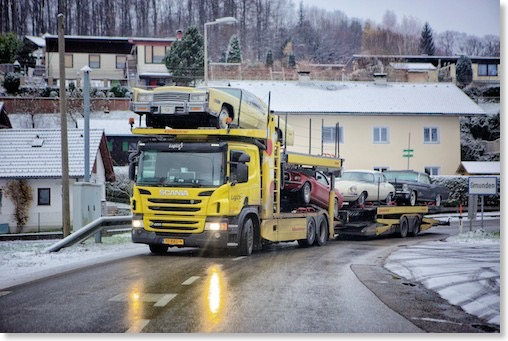
The first time I saw the car - the driver had to back up for half a mile as he has hit a dead end street...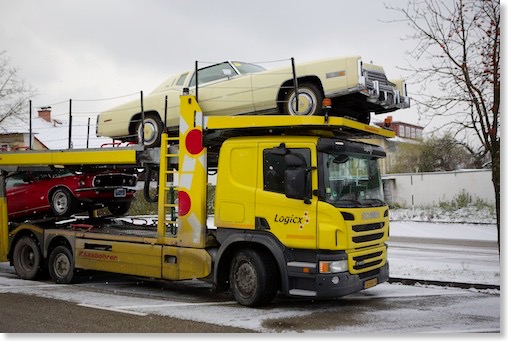
The Biarritz rode on top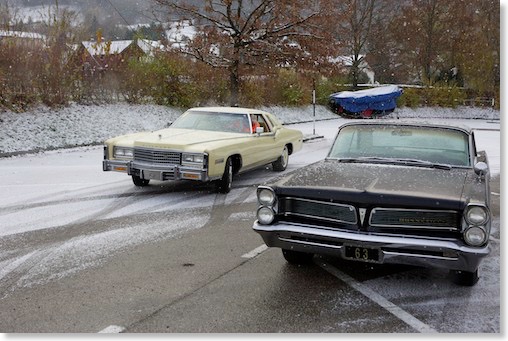
unloading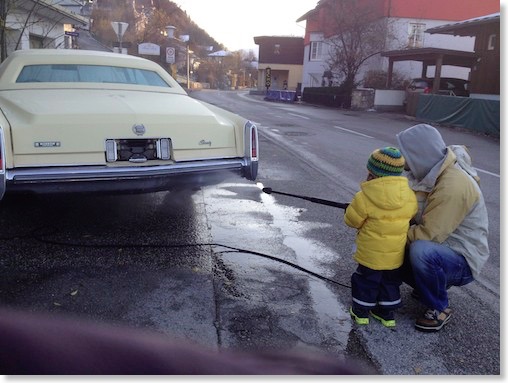
Little Elliot and me washing the car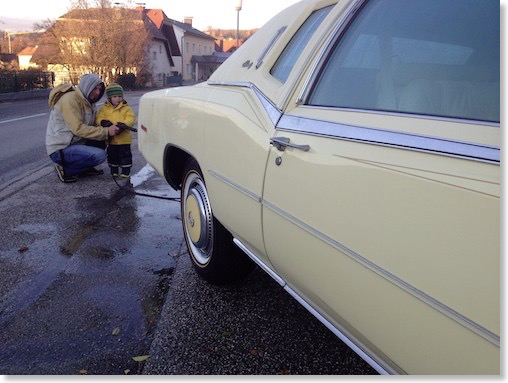
Cleaning in freezing temperatures with my little son Elliot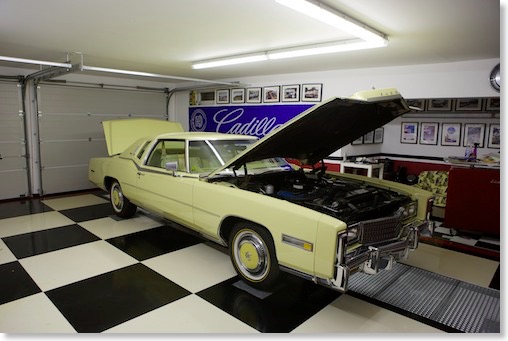
Drying in the garage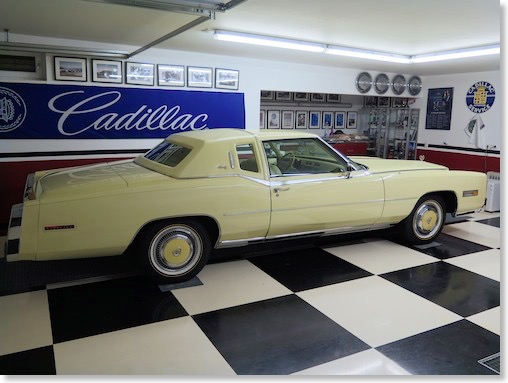
After drying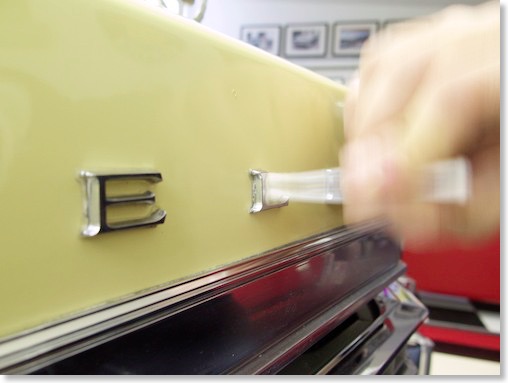
Detailing with q-tips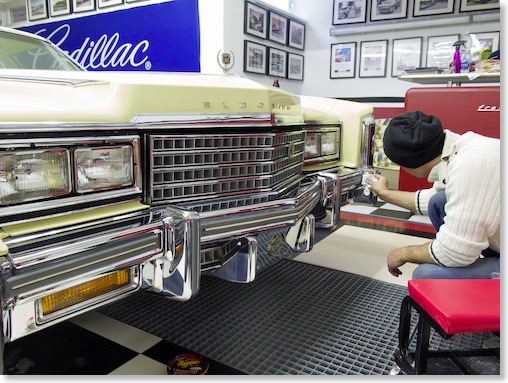
Look at that perfect chrome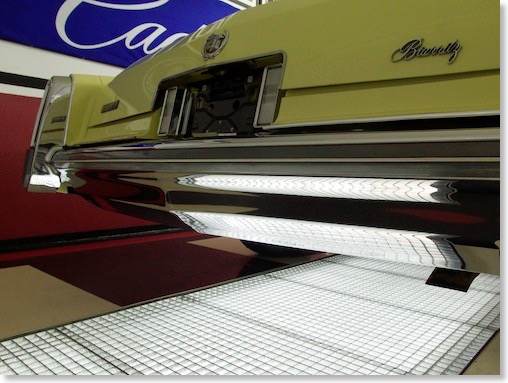
Mirror like chrome bumpers
perfect leather - before cleaning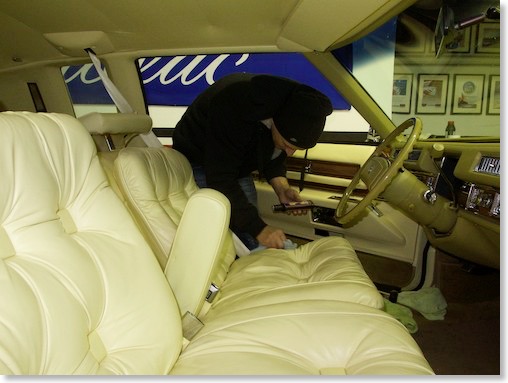
My friend Tayfun helped cleaning the leather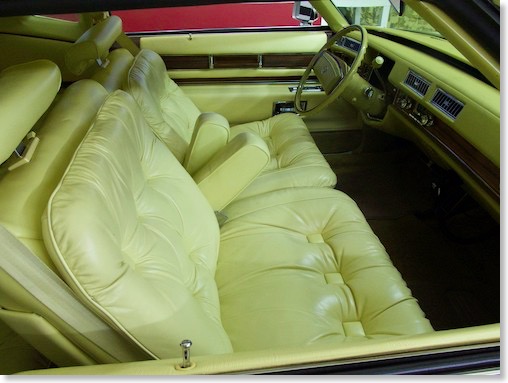
After cleaning and conditioning the front seats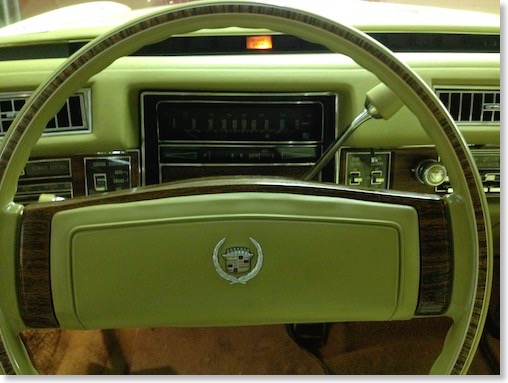
only 11k miles
Cleaning the Vicodec roof of the 58 and the convertible top of the 67.
I have tried a variety of cleaning methods and cleaners over the years.
This time I used Meguiars professional vinyl cleaner #M39 ( I think this product is no longer available and they only offer #M40 now) along with their stiff nylon brush followed by a special nano foam sponge which is called "dirt eraser". It really removes dirt very thoroughly even from textured materials.
Both tops came out very clean - I then used Meguiars Convertible top impregnation to protect them from getting dirty again soon. It also weatherproofs the tops. (not that I would ever drive in rain with my cars... ;-) )
I have heard really good things about Meguiars Convertible Top Cleaner as well - will try it out next time...
Disclaimer: I´m not getting paid or receive any free products from the companies I´m mentioning here. If I like products or services I mention them and if I dislike things I will also talk about them in a less positive way ;-) I just like to share my findings.
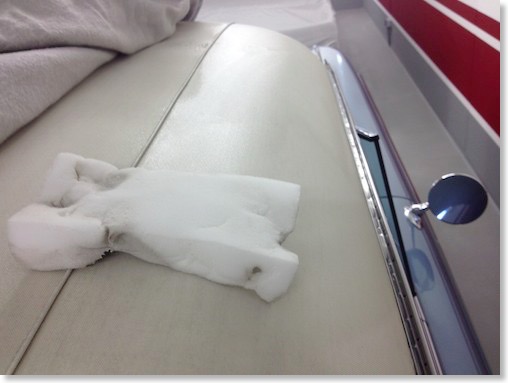
One of the dirt eraser sponges in action on the original roof from 1958. White tops are a pain to keep clean...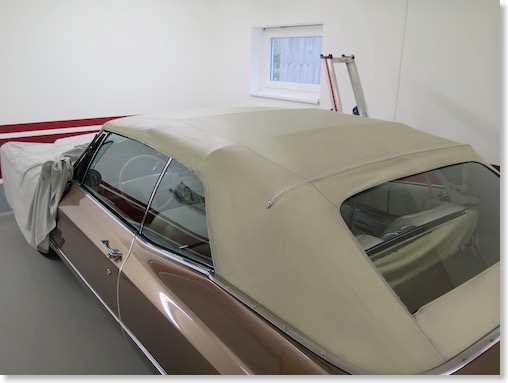
Looking o.k. now - its still the original top from 1967...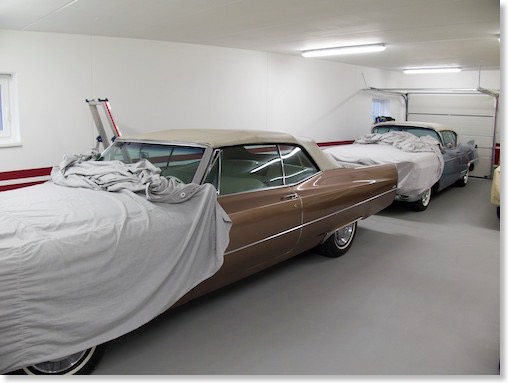
In the garage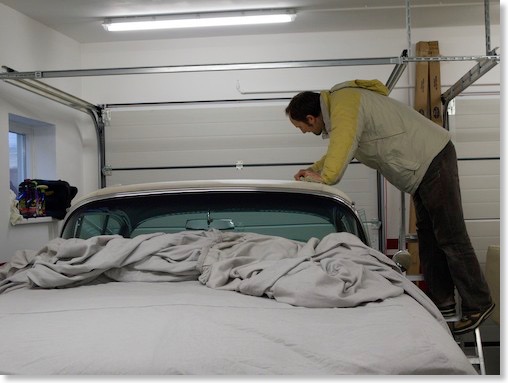
Thoroughly cleaning the Vicodec roof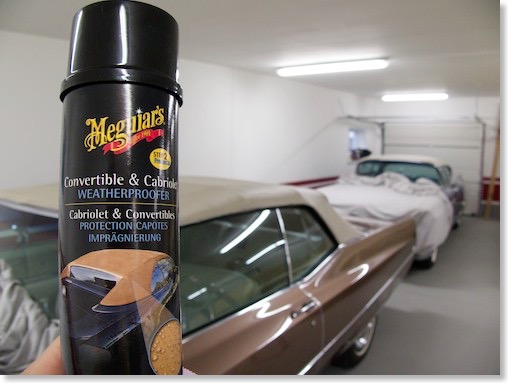
Meguiars weatherproofer for additional protection
1958 Eldorado Wheel Bearing Replacement - oil change - winter hibernation...
The newly installed Speedbleeder valves made the job a lot easier and quicker. I bled the brakes two times and took the 58 Eldorado for a test drive. The brakes worked fine, but felt differently than before the rebuild. The car did stop perfectly, but pedal travel was too long for my taste, before any brake action took place.
I consulted the shop manual for this symptom and it first suggested to adjust the brake pads first.
As I had no brake adjusting tool, I use a flat screwdriver to adjust the star wheel like described in the shop manual and bled the brakes once again.
After this the brakes worked like before the rebuild again — great!
As I had the front brake drums off anyways, I decided to finally change the wheel bearings as well, as they were making a very slight noise, and I had the new bearings laying around in my garage for years now...
They are pretty easy to remove and replace — no big deal — no special tools necessary. Just make sure to tighten them back to specs (shop manual mentions 4 ft-pound of torque (around 5,5nm))
After this, I also changed the oil after I brought the engine to operating temperature and put in 5 quarts of fresh 10W40 oil and a new oil filter. I also lubed some other parts like the alternator.
I then parked the 58 in the new garage - along with my other cars - where it will spend the long, cold winter.
It will get a good coat of fresh wax on the outside and some good leather treatment soon, and I will also treat the rubber parts and weather stripping, so that everything stays soft during hibernation.
I only managed to drive the 58 Eldorado 86 miles this year - way too less!
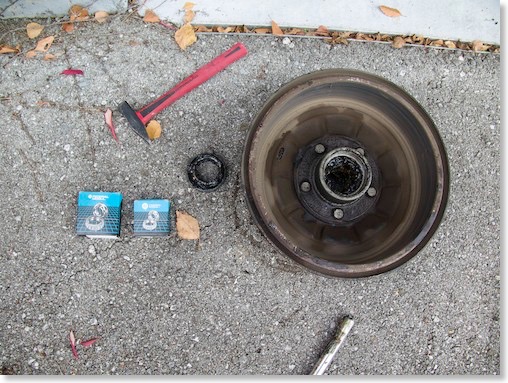
Removed the old bearings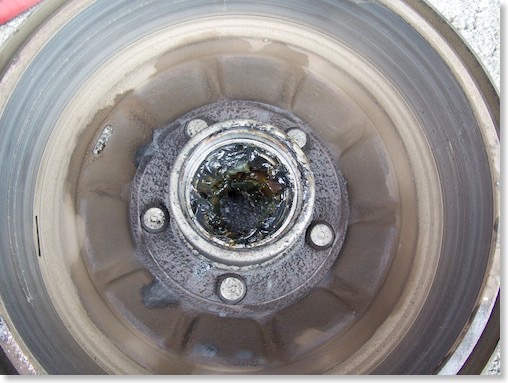
You just have to tap out the rear dust shield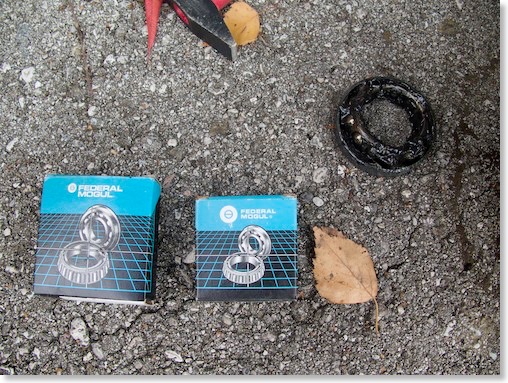
The new bearings waiting for installation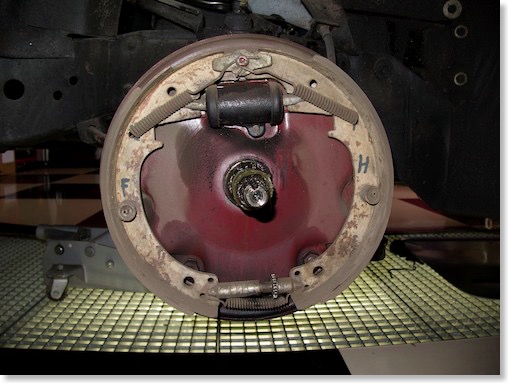
Adjusted the star wheel and checked the front brakes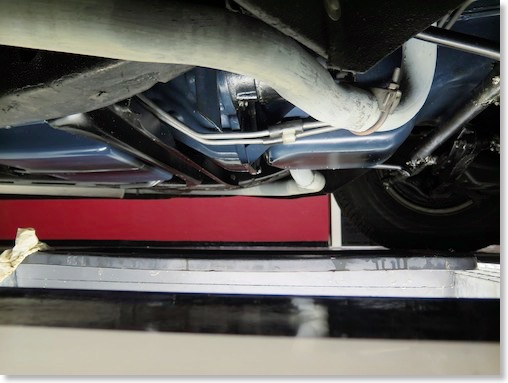
Changing the engine oil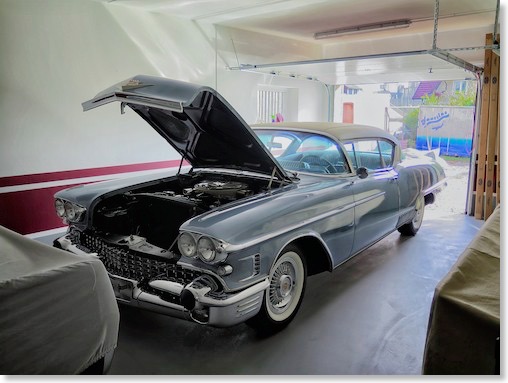
In its winter home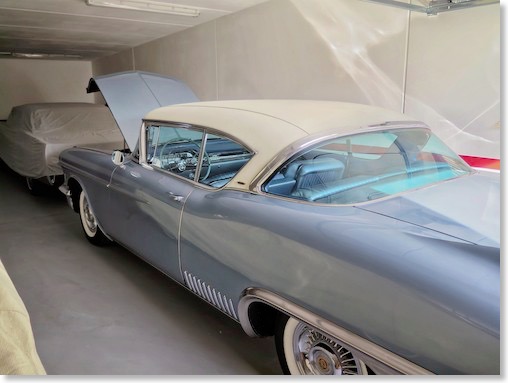
In the winter home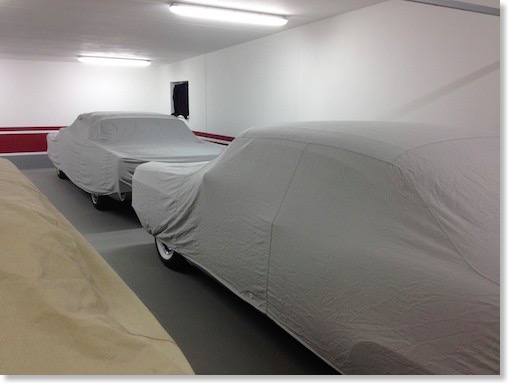
Sleep well!
A spectacular low mileage 1978 Cadillac Eldorado Biarritz is on its way to my garage!
Lots of collectors seemed to have thought alike in 1978, when the new downsized 1979 Eldorado was introduced, as they began storing the last big ones aside, and started to tuck them away in their air conditioned garages. Because of this, some of the 1978 Biarritzes survived in spectacular condition, like the car that is coming to my garage hopefully soon all the way from Carrollton, TX.
It was another Cadillac fan who sent me a link to an ebay auction just for my viewing pleasure. When I looked closer, I recognized that this triple yellow, fully loaded, super low mileage Biarritz seemed to be in spectacular condition and that it was very well cared for.
The car did not sell on ebay and so I contacted the seller for more information and suggested a price to him. He was a pleasure to deal with and a real car guy and collector, who answered all my questions and sent me lots of great information. The seller seems to be a great guy.
After a couple of days a deal was made…Luckily a friend borrowed me the money for the purchase of the car.
The car was now picked up from the seller in Texas and is on its long way to Austria into my garage.
The first leg of its journey is to Houston - then it will be transported in an enclosed truck to Florida where it will be loaded into a container before it crosses the Atlantic to Rotterdam.
Cant wait to see this Colonial yellow car in real life - its probably the best 78 Biarritz I ever saw and know of.
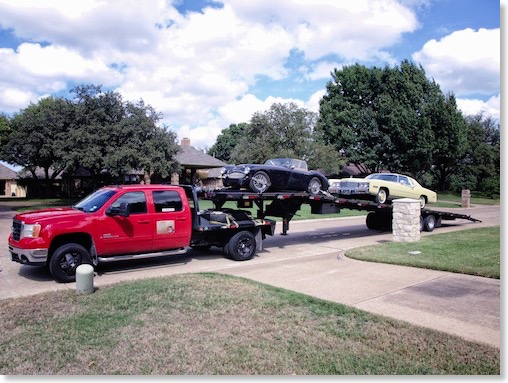
The car was loaded onto the truck in Carrollton, TX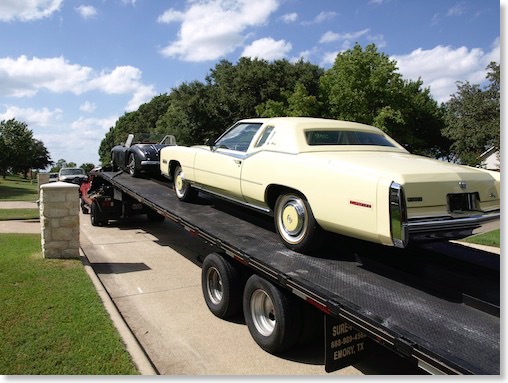
Heading towards Austria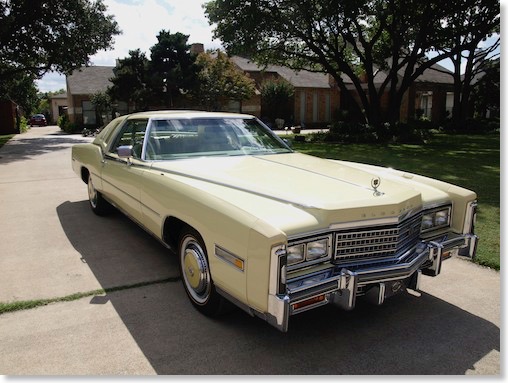
Short before pick up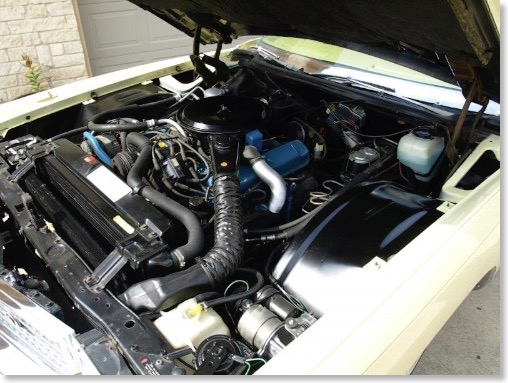
Look at that clean untouched engine bay!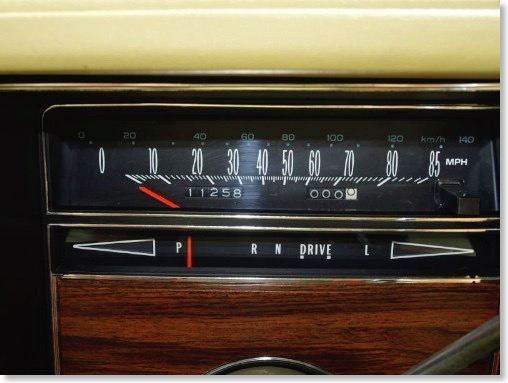
Low mileage!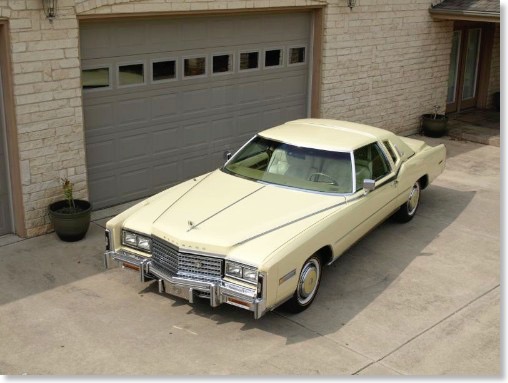
What a beauty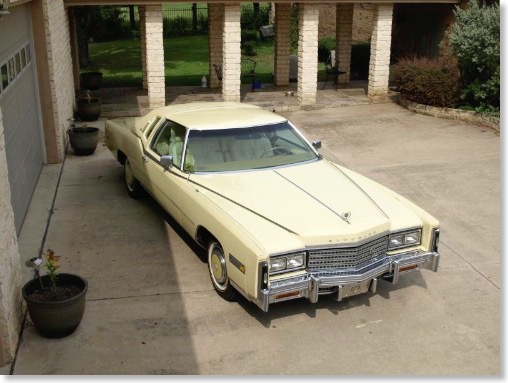
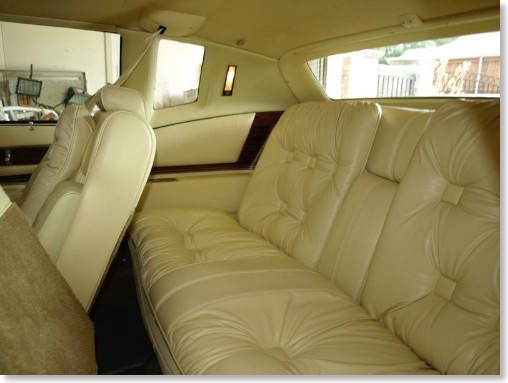
Looks like nobody ever sat in these pillowy seats...
Repairing the Treadle Vac Master Cylinder and Brake Booster of my 58 Eldorado
Now as I wanted to drive it out of the garage, I found a puddle of brake fluid under the car.
So I went on to search where it was coming from.
I suspected a leaking wheel cylinder, but could not find any traces of fluid coming from the wheels. After some more searching, I eventually found out that fluid was dripping out under the brake booster along the push rod. When I checked the fluid level it was only half full.
So I knew that the Treadle Vac would need a full rebuild…
I ordered a rebuild kit at Cadillac Parts LTD. They offer a kit to rebuild everything from the booster to the master cylinder. As I found out, the gasket for the reservoir did not fit from their set and some other correct smaller rubber parts are also not included in the set. So remove everything carefully from your unit as you might have to reuse some parts for your rebuild. I contacted them about the wrong parts and they immediately sent me the correct parts by mail. Great customer services - I would order from them anytime again!
As I had never done a full rebuild I asked my Cadillac friend Lucky for help - knowing that he can repair almost everything, and that he had done this job during the full restoration of his awesome 58 Biarritz before.
He was so kind to offer his assistance and invited me to his fantastic work shop where he is restoring his cars.
So I carefully removed the whole unit from my car and visited Lucky´s workshop.
With his skills he managed to rebuild the whole unit within a couple of hours. As it turned out a bad O-ring caused fluid to leak into the booster.
Due to all the brake fluid the finish of the Bendix unit suffered a lot, and so I decided to strip everything on the outside down to bare metal to repaint it.
So I took everything apart once again to make sure to do it perfectly.
I ordered some great spray cans from Eastwood to get the perfect look to match its appearance to when it was new.
Originally the master cylinder was not painted at all - but left in bare cast metal. Of course it started to collect surface rust very quickly - even on new cars back in 1958.
The booster originally was painted in semi gloss black.
Eastwood has a product called "Brake Gray" which I used to emulate this look. It comes extremely close to bare metal, but of course the paint protects the metal from rust. This paint is also resistant against brake fluid. I first primered the master cylinder with self etching primer two times before two coats of brake gray were applied.
For the brake booster I ordered Eastwoods Chassis Black extreme primer and satin black paint - painting turned out really fine! See pictures below
To make bleeding brakes easier and a one person job I also ordered a set of speed bleeder screws. (SB3824-SS)
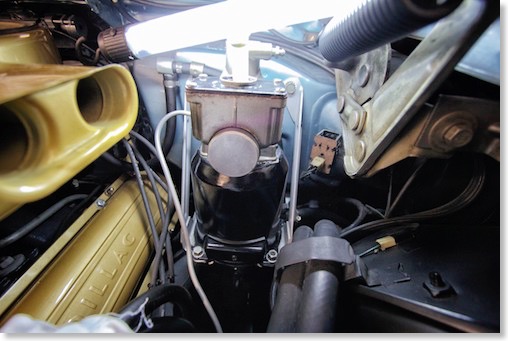
The unit still in the car - before removal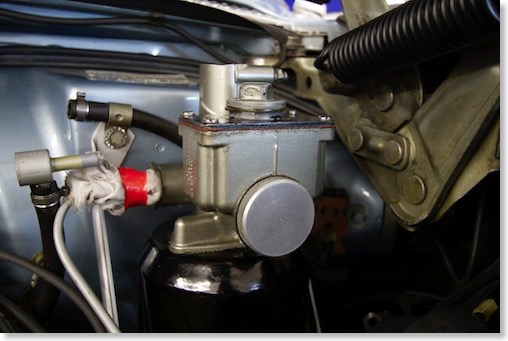
Removal has started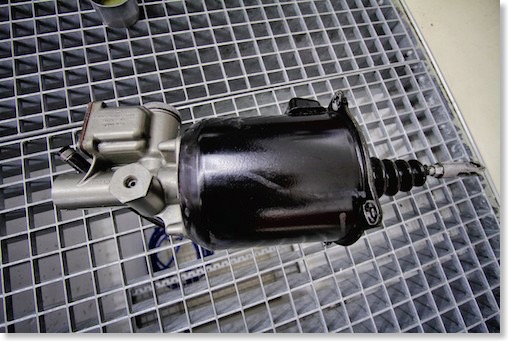
The unit out of the car - before rebuilding it.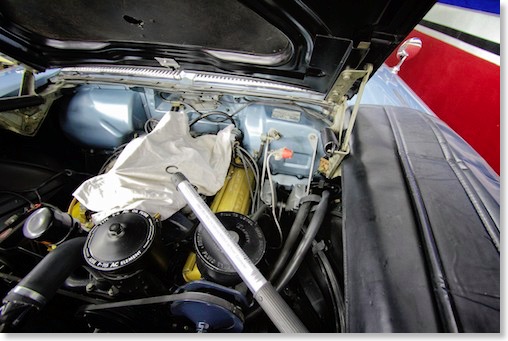
Out of the car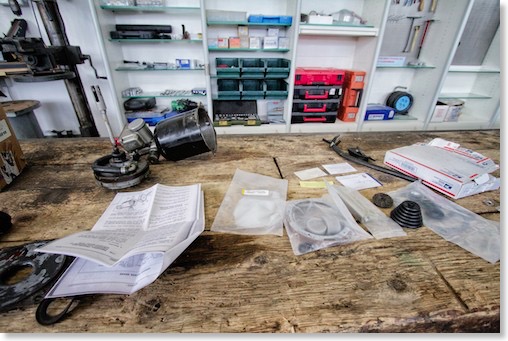
In Lucky´s workshop with the rebuild kit I got from the USA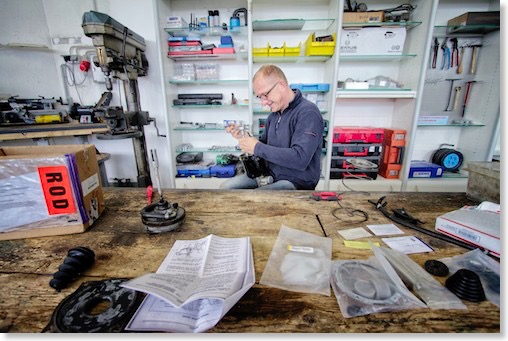
My friend Lucky at work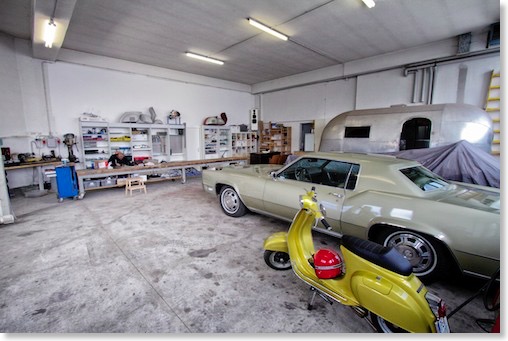
Lucky´s fantastic work shop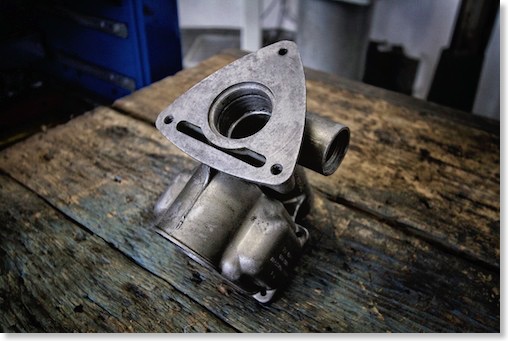
The Bendix master cylinder fully disassembled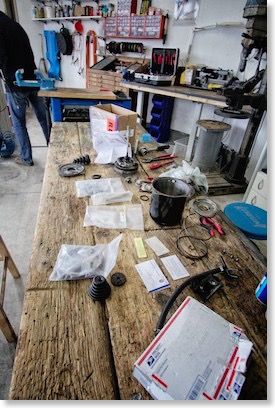
Everything disassembled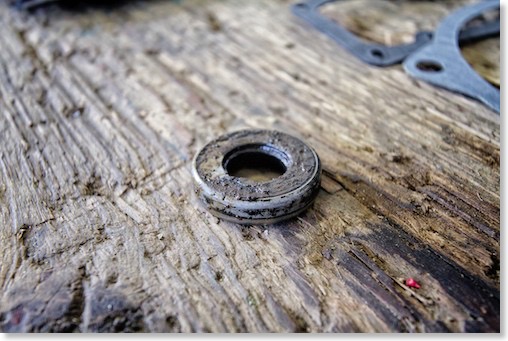
This O-ring was leaking and caused the problem.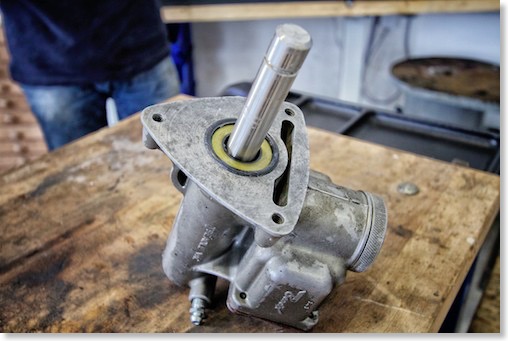
The new o-ring in place.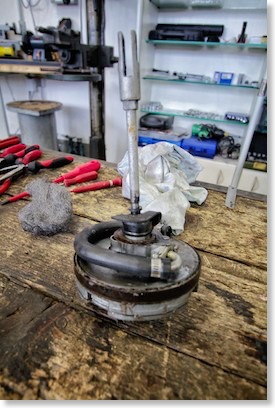
The vacuum cylinder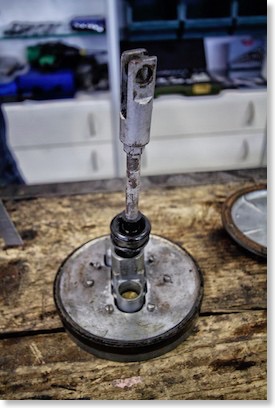
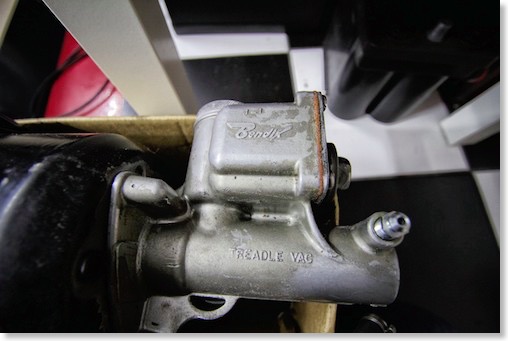
As you can see the paint suffered from the brake fluid - a repaint was necessary after the rebuild.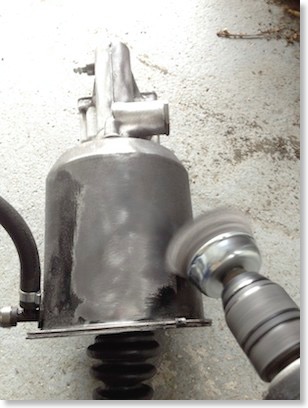
I started to wire brush the paint off - took it apart once again after this picture.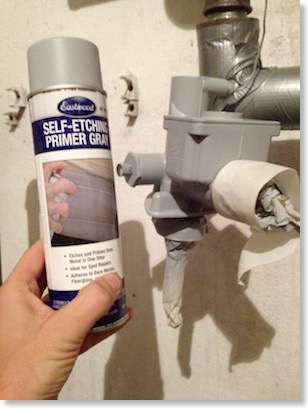
The master cylinder in primer.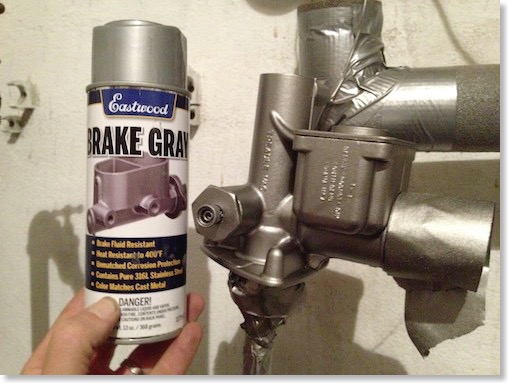
After painting it with "Brake Gray" - great stuff.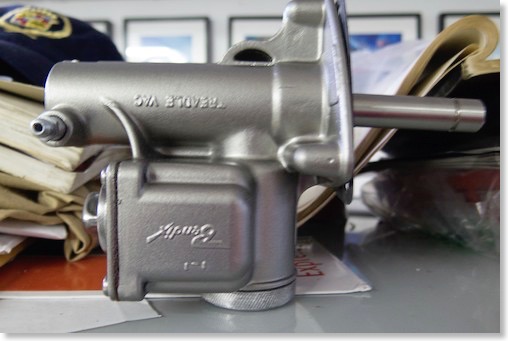
The master cylinder with paint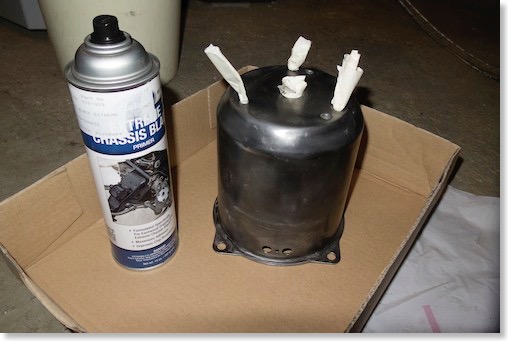
The booster in bare metal before primer. I used Eastwood Extrem Chassis Black primer and paint.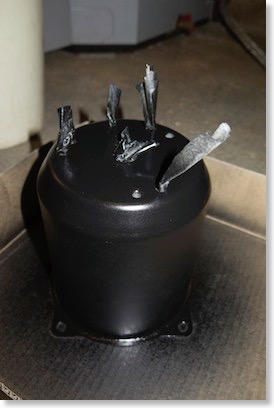
In primer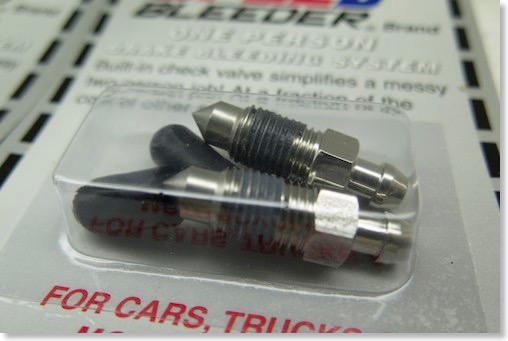
Speed Bleeder screws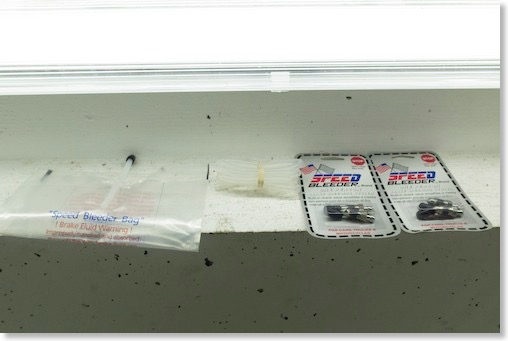
Speed Bleeder screws and bag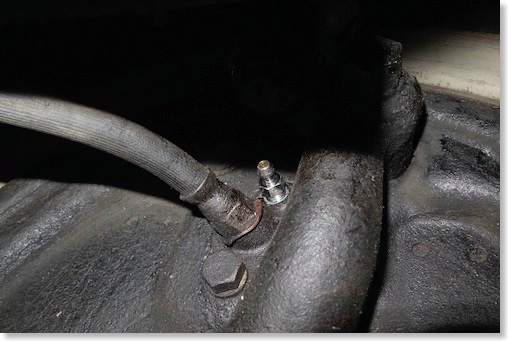
The new Speed Bleeder screw in place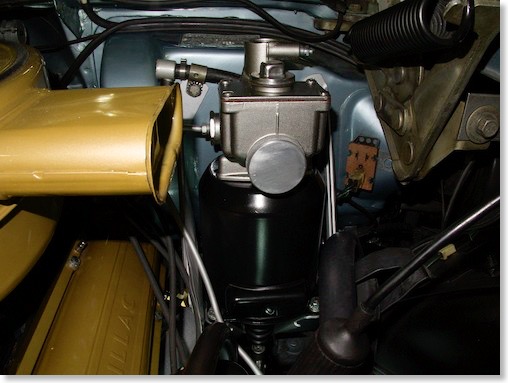
The reassembled unit back in the car.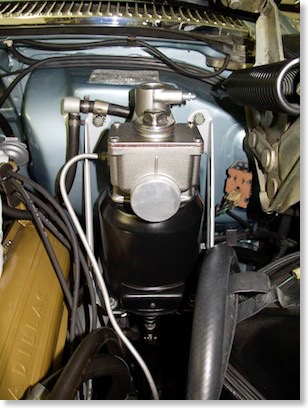
The 58 Seville is back home. A dead battery...
Now after almost a full year of not seeing the car it was time to bring it back home again. I was a little worried if the car would even start up after such a long time of hibernation.
After I put some fuel into the center carb - the car fired right up after only 3 seconds of cranking! Amazing! The car ran perfectly well and made the one hour and a half trip home without any issues.
The surprise came the next day when I wanted to take the car on another trip. The battery was dead although it was disconnected after the last trip. I tried to recharge it but it´s completely dead! The Exide Maxima battery only lasted for 5 years and broke down over night without any warning… I will buy a new battery probably next spring - not sure if I should go with Exide again, maybe a cheaper one will have to do.
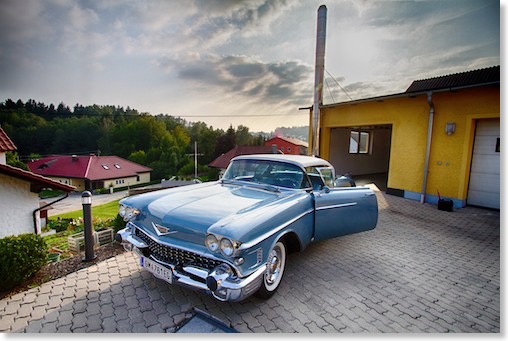
The 58 after it left my friends garage after a year of storage. To my surprise it started right up!
Cadillac BIG Meet 2012 - Bad weather but great cars.
86 Cadillacs from the nineteen forties to the present day have been put on show and many of them were awarded with prices from a distinguished international jury.
Even with this year’s number of cars below it’s record mark of 160 – due to the rather unfavorable weather situation – the Cadillac BIG Meet in Kremsmünster is still regarded as the largest annual Cadillac meeting in Europe.
It is open to all Cadillac owners, regardless of age and history of the vehicle.
This year, the special focus was on cars from the nineteen seventies, represented by 20 cars from this decade, with the Eldorado convertibles clearly outnumbering other body styles.
Organizer Georg Pfeiffer and moderator Ulla Theussl handed over the trophies in pouring rain this year – but the weather could not dampen the enthusiasm of the participants and the spectators. We took the 1967 DeVille this year.
On the day before the meeting we held a driving tour for 40 registered Cadillacs. The participants were rewarded with breathtaking vistas along the whole route.
You can find a huge gallery of the pictures my wife and I shot from the driving tour and the show on the Cadillac BIG Meet website.
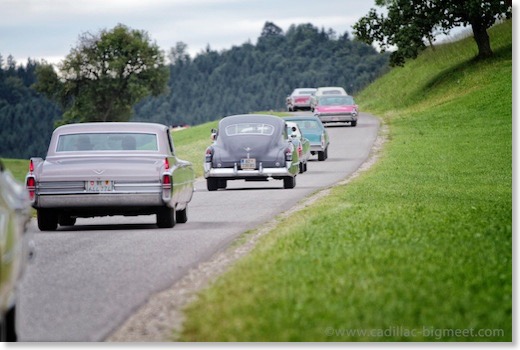
At the driving tour!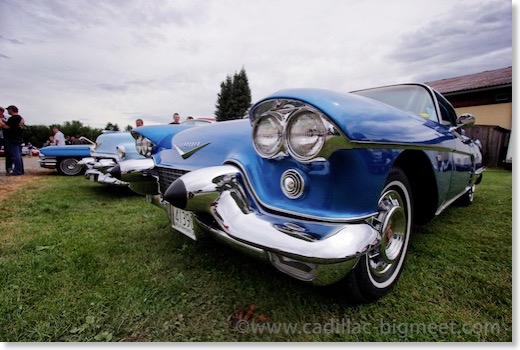
My personal favorite car at the show - the 1958 Eldorado Brougham!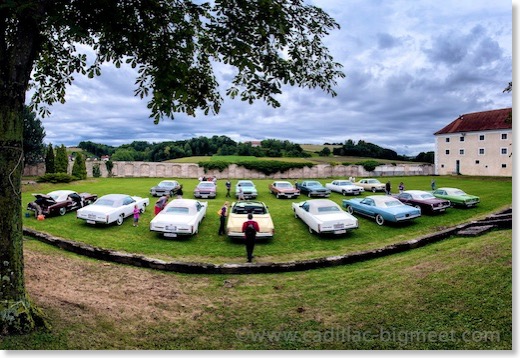
This years special theme was the 1970´s Cadillacs
Outlook to the 2012 season - doing the first repairs 2012
The following work is planed for the next few months before the cars will be put back on the road in May 2012.
1971 Mark III
- new vinyl roof (the original one was damaged during transport and the insurance will pay for a new one)
1967 DeVille
- needs new front wheel bearings (I already have the spare parts)
- will try to find a rebuilt OEM Bendix master cylinder and vacuum booster. These are very difficult to find. Everybody seems to offer Delco Moraine parts only. I have replaced my original booster and master cylinder 2 years ago and I´m not quite happy with the power assist of the new units. It seems that the after market master cylinders from Delco have a smaller bore diameter and therefore you will have to depress the pedal with more force. There is a discussion going on on the topic of finding the correct booster and master cylinder in the CLC forum - check it out for more detail! If you know where I could find a correct Bendix booster and master cylinder or where I could get my original core rebuilt, please let me know!! The parts number for the Bendix Master Cylinder is #1489981 and for the Bendix booster it is: #1489071
- re-adjust the gear indicator as it's slightly out of line.
1967 Eldorado
- I will remove the starter motor and have it rebuilt - it sometimes is acting up
1958 Eldorado
- It needs some new front wheel bearings as well. I already bought the parts.
I will of course post the repair progress here on my website
A new garage?
The biggest planned project for 2012 will be to find a solution for my storage problem. I hope to be able to build another garage or to rent one. I will have to find a solution until the spring of 2012. I´m dreaming of building a building which can hold 8 Cadillacs, but I do not know yet if I will be able to afford it...
Car Shows
I hope to attend and visit the „Klassikwelt Bodensee“ from May 17th to 20th and of course the best meeting in Europe - the Cadillac BIG Meet August 25th to 26th. I will also hopefully make it to some local shows here in Austria.
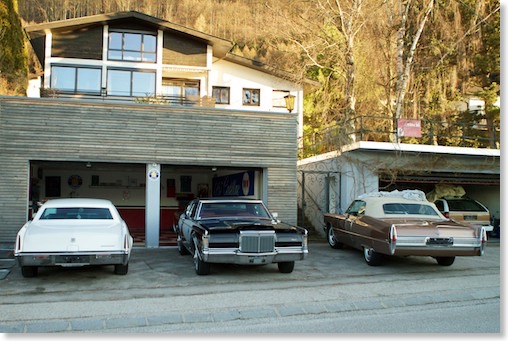
As we had a dry winter day I took the cars out of the garage - they fired right up after some months of sleeping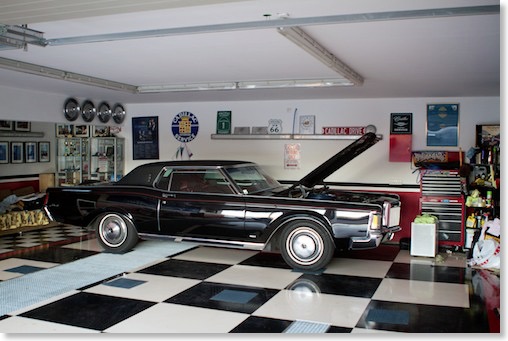
The Mark III was moved to the back of the garage, so that I can start working on the other cars first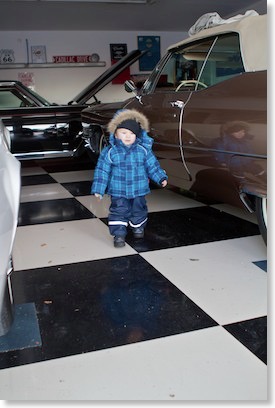
Little Elliot loves Daddy´s cars as well ;-)
The cars are in winter storage :-(
The cars are now in their cosy garages and will all get a new wax-, lubrication- and thorough cleaning job during the next few weeks. I usually also disconnect all the batteries, give the weatherstripping and rubber a good coat of silicone spray and treat all leather areas with leather conditioner. I also clean the interior carefully and over-inflate the tires to make sure that they do not get any flat spots. I will also park the tires on styrofoam. I really hate winter and snow and I am already looking forward to next spring... Over the winter I will rebuild the starter motor of my 1967 Eldorado and detail the undercarriage. The Lincolns undercarriage will get a very good cleaning as well. The 67 DeVille will get some new front wheel bearings and probably a new wheel cylinder and power booster. The 58 Eldorado will also need new front wheel bearings. So there will be a lot of minor things that will keep me busy over the winter...
Below are some pictures of our very last cruising tour this week with the Mark III
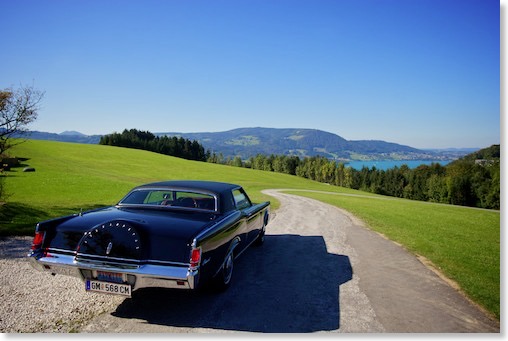
Cruising through the scenic landscape of Austria looking down at a lake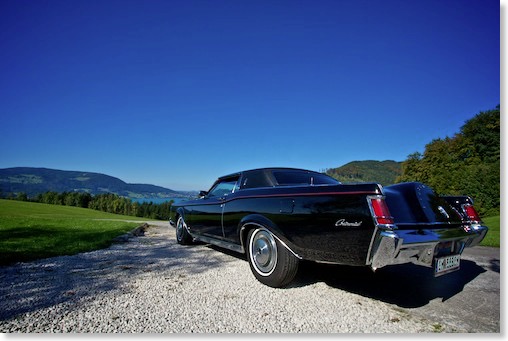
The Mark III enjoying the last sun rays...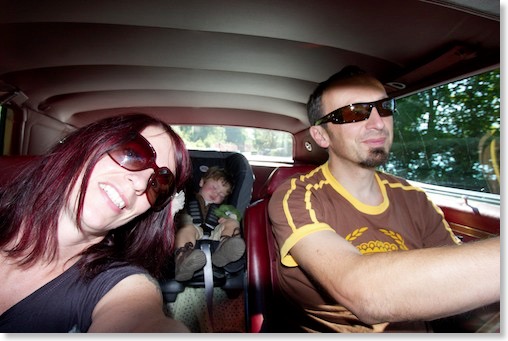
The whole family in the Lincoln - little Elliot is taking a nap as usual - nothing beats the soothing sound of the V8...
The 58 Eldorado is in winter storage in an awesome garage
When I reached Christians garage I refueled the car and put some fuel stabilizer in it. Amazingly the car needed only 18 mpg / 13l/100km. Thats pretty amazing - and I drove it pretty lead footed...
The car will spend this winter in a fantastic garage . The owner has an amazing collection of fine Cadillacs and some other classic cars. Among the Cadillacs are a 1956, 1957 and 1960 Eldorado Biarritz and a super low mileage 1976 Bicentennial. All cars are in amazing condition. The garage is second to none - it also features a full size bar and diner below the show room...
I´m glad that my 58 can spend the winter there, while my other cars are safely put away in my crowded garage. I really want to thank Christian for his generous offer!!!!
Below you can see some pictures I took on my last ride with the 58 in 2011. Good night my dear 58 - see you in May 2012.
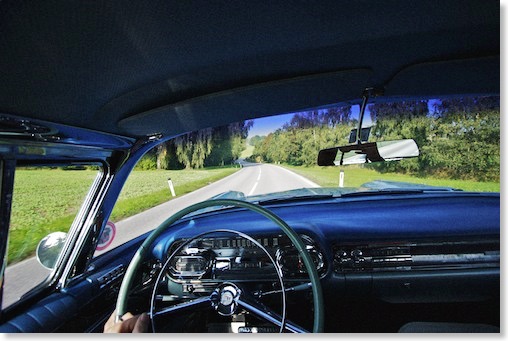
On the way...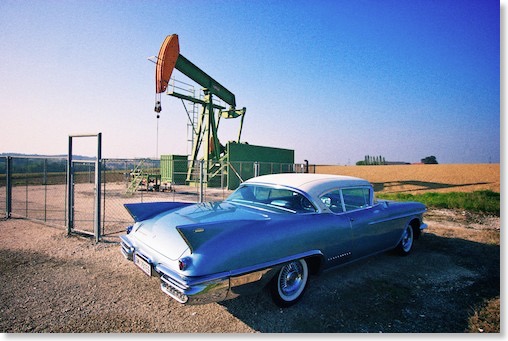
I had to stop at an oil pump along the road to snap a picture...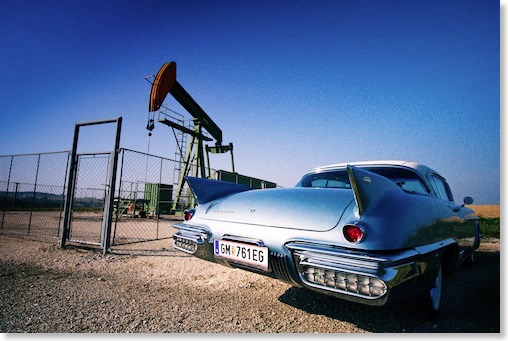
I had to stop at an oil pump along the road to snap a picture...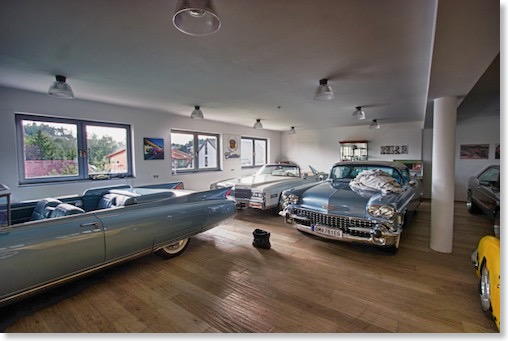
Christians “Eldorado Roadhouse“ - an awesome garage! The 1960 Biarritz once belonged to Cary Grant by the way... Next to my 58 is a super low mileage Bicentennial...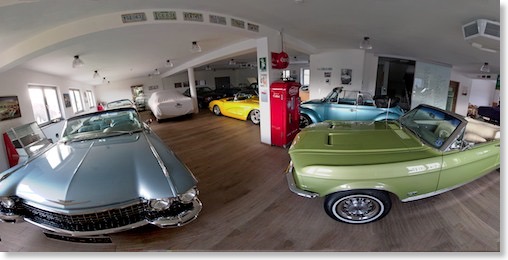
A part of Christians garage - the car under the cover is my 58... then there is a custom corvette and a #1 Mustang GT350...
A Photoshooting with my Cars
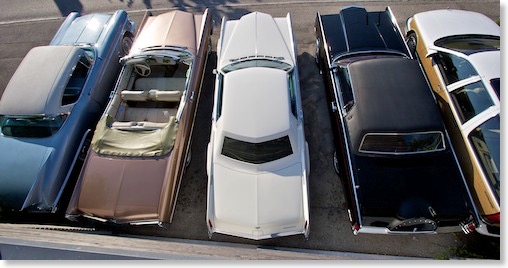
Seen from the roof top of the garage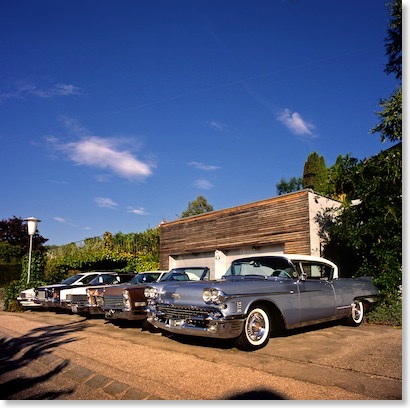
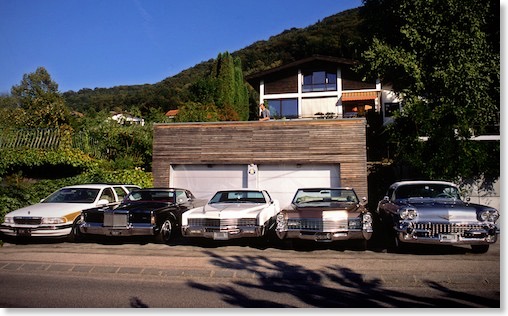
Most of my American cars in front of the garage...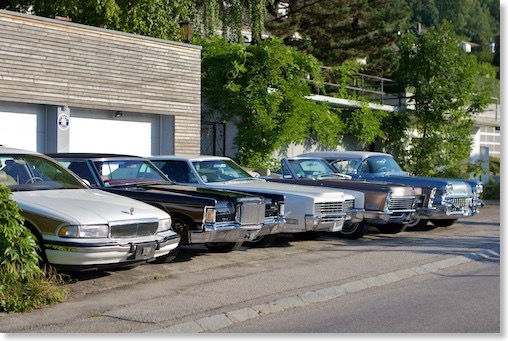
TV - Promotion Shooting for the Cadillac BIG Meet - 58 breaks down
My friends Christl, Christian and Willi and I made it there with our cars, on what must have been the hottest day this summer, and we could do the shooting for a 2 Minute piece at the Kremsegg castle.
We had Cary Grants former 1960 Eldorado Biarritz there, which now belongs to my friend Christian, which was the star of the report. The report aired 2 days before our show on national television.
I drove my 58 to the shooting and while sitting in heavy traffic it suddenly cut out while I was in the left lane. Eventually I made it to the right shoulder and I tried to make it run again without any success. Unfortunately I had no tools with me - so I had to call the automobile service club to help me out. They arrived about 20 minutes later. I asked the guy who helped me out to unscrew the fuel line and blow some compressed air into it, as I suspected a clogged fuel line. We reconnected everything and it ran beautifully again. So I safely made it home again. I wrongfully assumed that everything must have been fixed now and that I should clean the tank soon... (see the report about the Cadillac BIG Meet 2011to see what happened)
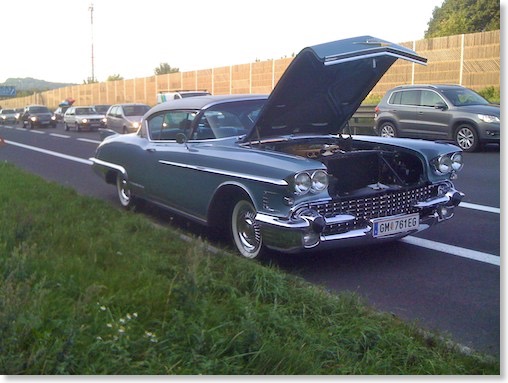
Stranded on the Autobahn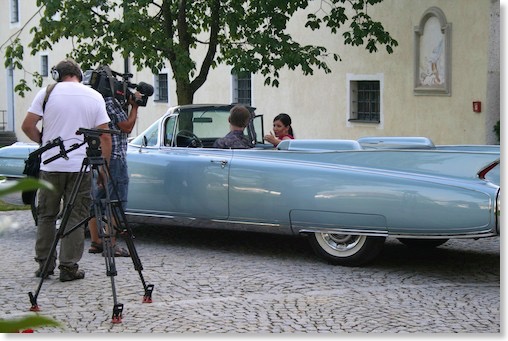
Cary Grants former 1960 Eldorado Biarritz was the star of the show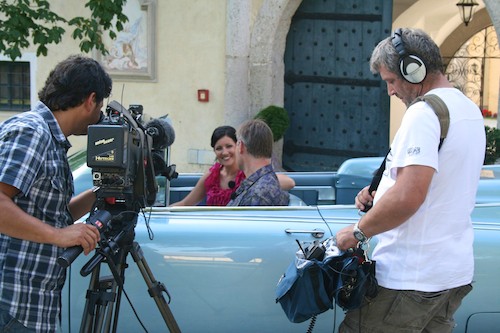
The TV team with the show host Simona Pindeus and Willi Hofmann on the steering wheel
Cadillac BIG Meet 2011
My wife and I are part of the organization team together with some good friends. At this years addition we had the theme “Cadillac meets Lincoln“ and so we invited Lincolns to the show field. My own Continental Mark III just got ready for the show a couple of days before the show, so I drove it there along with my 1958 Eldorado Seville which was piloted by my friend Tayfun.
On Saturday there is always a cruising tour limited to 40 preregistered cars. When we arrived at the host hotel lots of people were surprised seeing me arrive in a Lincoln ;-)
30 minutes before the tour started, suddenly the 58 cut out and did not want to start again. I once again suspected a clogged fuel line and we blew the line through. Unfortunately it did not help at all - the line was free. With the help of Lucky (a fellow 1958 Biarritz owner) we disassembled the fuel pump and found out that the valve inside came loose and was no longer in its seat. Lucky put it back and the car ran beautifully again. It all was fixed in 15 minutes and the 58 was ready for the cruising tour.
At the show on sunday 133 Cadillacs and 11 Lincolns participated. There were many awesome cars on the show field, like one of the worlds best 1953 Eldorados, a spectacular 1958 Eldorado Brougham, lots of 59 Eldorados and everything else ranging from 1921 to 2011. The show was once again spectacular.
You can find all the pictures of the show here:
http://www.cadillac-meeting.com/english/pictures/pictures.html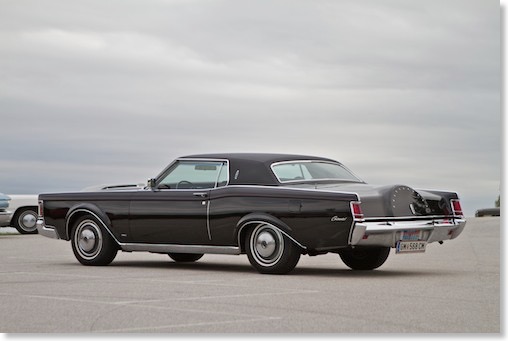
My 1971 Continental Mark III just before the start of the cruising tour.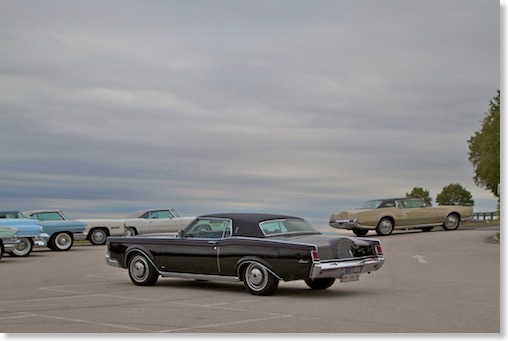
The cars are gathering for the cruising tour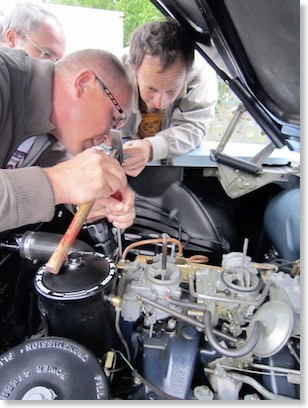
Lucky repaired the fuel pump of my 58 Seville 30 minutes before the start of the cruising tour - Thank you Lucky!!!!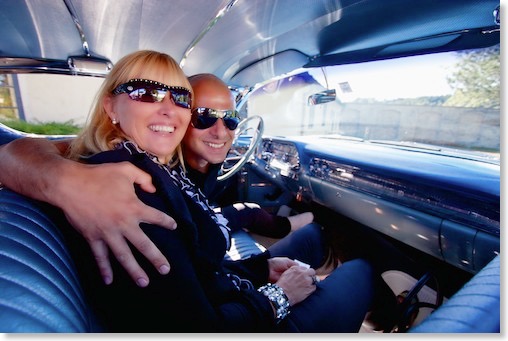
My friends Claudia and Tayfun drove my 58 Eldorado Seville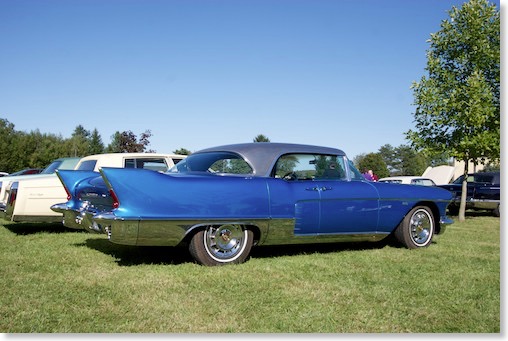
one of the many awesome cars at the show - 1958 Eldorado Brougham # 535 - my dream car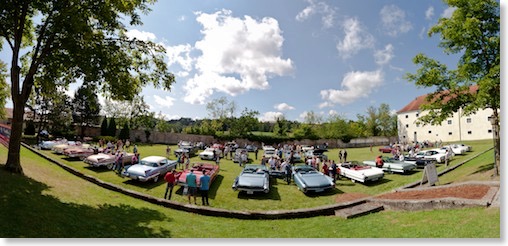
a small overview of a part of the show field at the Kremsegg castle
You can find all the pictures of the show here:
http://www.cadillac-meeting.com/english/pictures/pictures.html
Mostkost Kustom Show 2011 and Sepp's Garage
We took the 67 Eldorado to the show.
My wife and I shot lots of great images which are available in this gallery.
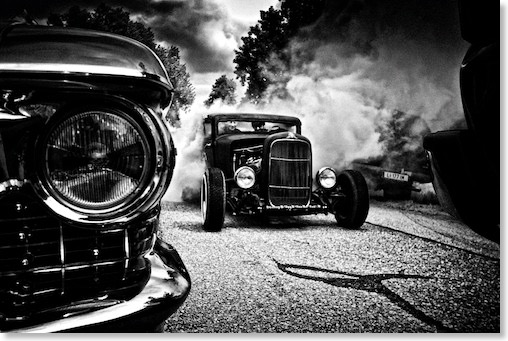
Sepp during a burn out with one of his Hotrods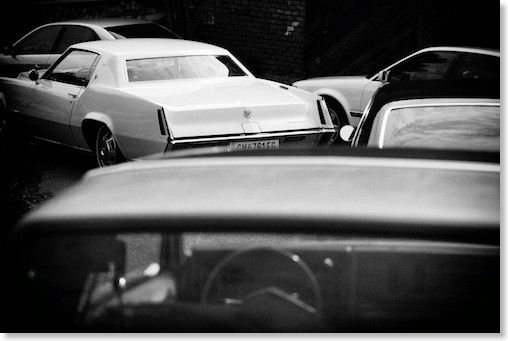
We took the 67 Eldorado to the show
The 67 Eldorados new POA valve and recharge of the AC
I got a new remanufactured POA valve (suction throttling valve) from Classic Auto Air to make sure that the system can cope with the much higher pressures of R134. Classic Auto Air was very helpful with providing the factory correct parts. Classic Auto Air says that the re-calibrated valve can make a 15-20º F / 6º C difference.
Yesterday I got the Eldo back from the shop and so far it seems to cool the car down properly. The air discharged out of the vents is 10º C / 50º F cold - not bad for R134.
This is what Classic Auto Air is recommending for a change from R12 to R134:
Minimum Requirements
- Change or restore the filter-drier.
- Drain the compressor oil and recharge with 134a compatible oil. (PAG or Ester Oil)
- Insure that the system is clean and free of contaminants (Depending on component condition, this may be a simple matter of blowing out with compressed air or liquid flushing with an air-conditioning flushing agent)
- Replace or restore all rubber hoses with barrier hose.
- Install 134a charge port adapters
- Send POA valve in to be calibrated
- Charge with 134a between 70-80% of the original R12 charge amount.
- Replace any o-rings with 134a compatible
Recommended:
- Install hi/lo pressure switch
HELPFUL HINTS
- Ignore the sight-glass. A properly charged 134a system will likely show bubbles in the sight-glass.
- Typical 134a charge rate will be approximately 70-80% of the factory R12 charge amount.
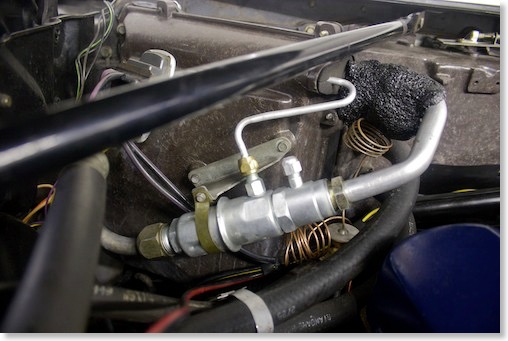
The new factory correct POA valve. Internally it was calibrated for the use of R134 instead of R12. The expansion valve was also replaced together with the evaporator, condenser, compressor, O-rings, filter-dryer. I did not install a hi/lo pressure switch which would cycle the compressor on and off to keep the car original.
1967 Eldorado with Sunroof from ASC
A 1967 Eldorado with sunroof?
A while ago I was contacted by fellow 67 Eldorado owner Mark Bristol. He owns a very rare 1967 Eldorado with a sunroof done by ASC (American Sunroof Company). He asked me if I knew anything about it.I had never heard anything about a sunroof in a 1967 Eldorado unfortunately, and so I could not help him out with any kind of information.
So Mark Bristol did a lot of great investigation work and found out the following:
“ I have found quite a bit out from my research. I spoke with Christian Prechter, President owner of ASC West on the phone. He was brought over from Germany when he was 19 in 1966 to help his brother Heinz Prechter do installs at the ASC West location and stayed there doing custom installs when ASC opened the Southgate Factory in Michigan. He told me that he did over 50 1967 Eldorados that year for various Stars and VIPS. He recalled doing mine for William Morris and even told me what color it was without me volunteering it to him. He said it was the only Marina Blue one he did! I quizzed him several times in a cross examination method to make sure he was not just telling me what he thought I wanted to hear. He said he is 100% certain he did it personally as he was actually doing the installs himself back then. The conversation went like this: „Hi I am Mark Bristol from Tomball, TX sorry to bother you at your home residence. I have a 1967 Eldorado with a sunroof.Did you ever install any sunroofs in 1967 in Eldorados?“. Prechter, " I installed over 50 for people like Sinatra, Dean Martin, Sammy Davis Jr. and William Morris.“ „Wow that many?“ Prechter "Yes it was very popular that year." „The car I have was William Morris' car do you recall doing it?“Prechter, "I sure do it was the only Blue one I did that year" „So you did a Marina Blue one for William Morris. That was a long time ago and you remember specifically doing this car, that is incredible are you sure?“ Prechter "I am 100% certain I did it" „So your division didn't get sold off to Inalfa.“ Prechter "Yes, I kept the custom install portion ASC West as it is the most profitable segment."„How involved are you with the actual operation of the company?“ Prechter "ASC West is still doing custom installs daily and I personally over see the operation." „Christian, Thank you for your time, you have been very helpful in understanding how these sunroof Eldorados came to be.“ It was a fairly short conversation I'd say 3-5 minutes with a very revealing content. I intend to mail him a packet with a photograph of "Elle" to autograph and several pictures to review and a certificate of authenticity for him to sign. Hopefully he will take the few minutes it will take and return it to me in the mail. A former President of the Cadillac Lasalle Club lives here in Tomball. He was president from 2004-2008. He stated he has seen 2 sunroof cars in person mine would make number 3. So they are floating around out there somewhere 50+ of them. My rule of thumb is 10% left in any condition after 40 years. That would mean there are 2 more out there some where!!!“ Mark Bristol
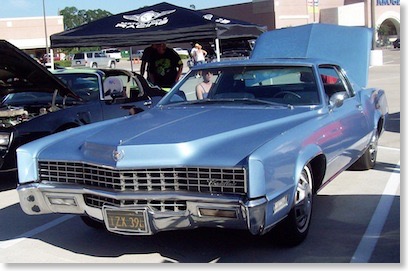
Mark Bristols - Ultra rare 67 Eldorado with sunroof.
Thank you Mark for providing all this information! Mark allowed me to post his info here, to help other 67 Eldorado fans with what he found out. Some more pics of his car can be found here:
The 67 Eldorado now has a working radio!
Up first was the radio. The Eldorado came with the original AM radio. When it was turned on nothing happened though... The power antenna worked flawlessly and the signal seeking feature worked as well, but it would not make any sound at all. So I assumed that the speakers were shot and got a new front and rear speaker from Greg Thompson from Turnswitch. They have exactly the same size as the original ones. Cadillac used 10 Ohm speakers for all their cars in 1967. I installed them today and the radio came back to life. As there are no AM stations around any longer I came across a great solution which would enable me to use an Ipod or Iphone to play over the original radio, without having to do any non original conversions to my car. Its a plug and play solution which can be undone in 2 minutes and does not involve any cutting or screwing. The product is called RediRad and it works perfectly. Just tune the radio to 1000 khz on the AM band and plug in the audio source and you can hear your favorite music on your original radio! It is simple and affordable and undetectable as its hidden under the dash.
I also tried to repair the broken stem on my clock and it took me a while to get the clock out only to find out that my replacement stem would not fit. So I had to reinstall it. But at least it seems that it has a better electrical connection to the printed circuit now and the clock works all the time now. Problem is that I can only set the time with long nose pliers at the moment. Looks like I will need an entire new clock or live with it the way it is now. At least it works...
It was great to spend some time with the car again after the long winter months!
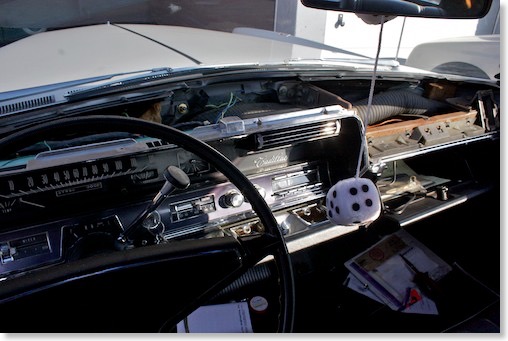
The removed dash.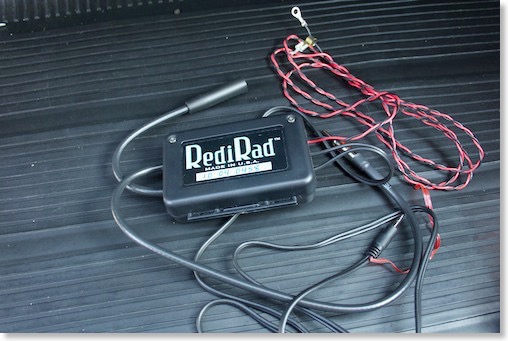
The RediRad system! Great stuff!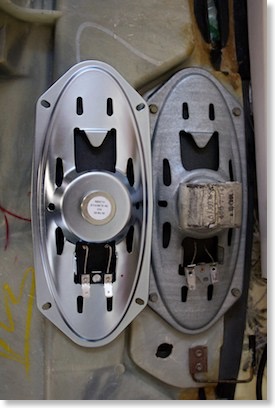
The replacement speaker on the left and the original one on the right.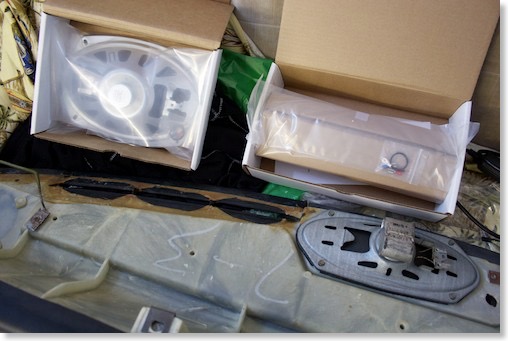
The new speakers with the old one.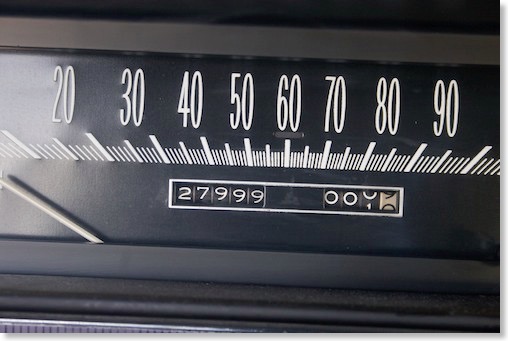
The Eldorado is coming close to the 28k mark... Still a low mileage car ;-)
Detailing the paint of the 1967 Eldorado
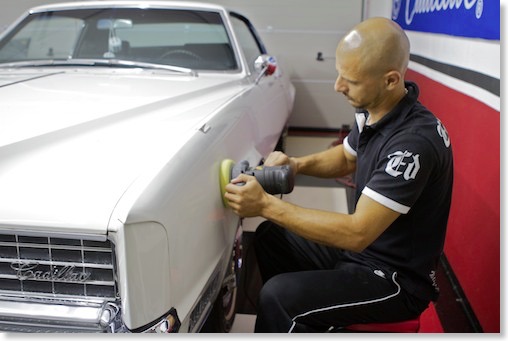
My friend Tayfun polishing the paint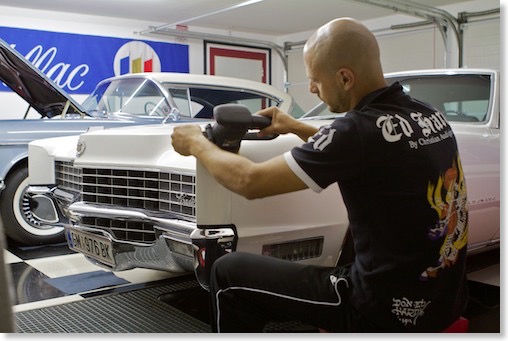
it took 7 steps for a smooth surface...
A photoshooting with the 1967 Eldorado
Afra used her old trusty Hasselblad camera which, even in the digital area, is better than any new camera, and shot a roll of good old black and white film and another roll of color slide film. She now scanned the films and the results can be seen here!
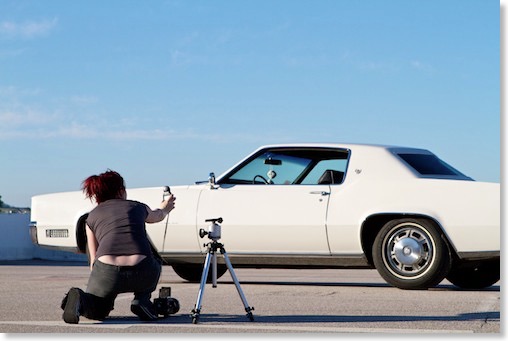
At the photoshooting with the light meter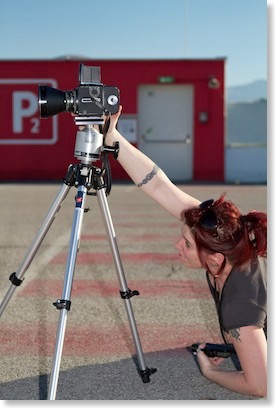
Afra giving her best to avoid any reflections in the chrome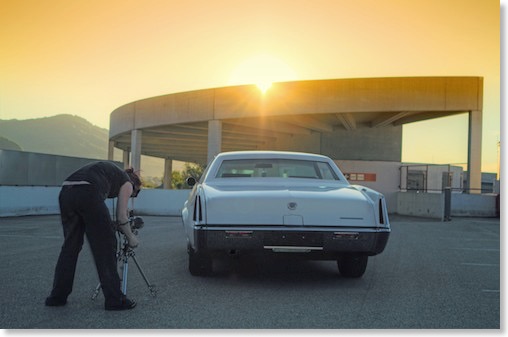
the sun is setting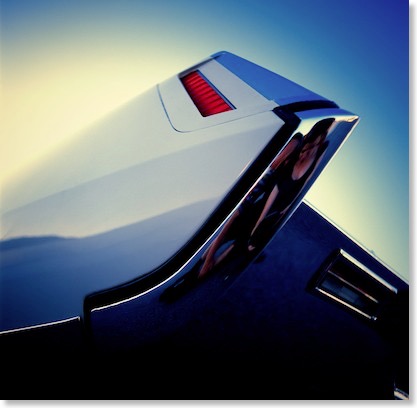
click on the image to see all the images from this shooting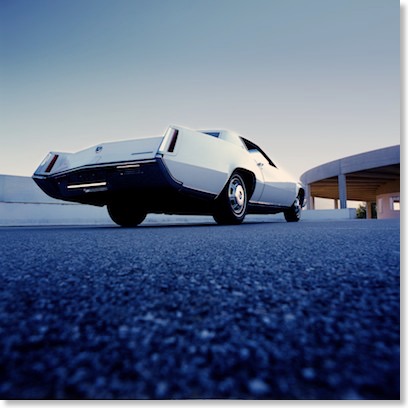
click on the image to see all the images from this shooting
1967 Eldorado Headlight Actuator repaired
The instructions on the reproduction part mentioned that one could use silicone spray to lube the internals of the actuator through the vacuum inlets - this would also make the rubber parts in there soft for a better sealing. So I thought it might be a good idea to spray something in my old part and really soak it...
I had the impression that the rod was easier to move after application. I also put some gasket sealant around the vacuum inlets, just to make sure that there is no leak anywhere.
So I installed the old unit once again and it still did not work properly - but it worked fine if I only installed one vacuum line at a time. Suddenly it rang a bell. There are some T-connectors which also act as a valve going to each actuator. They do vent the system on one side when the doors are operated.
I cleaned the connector valve and reinstalled one hose going there and suddenly everything was back in working order! It now works like it should again!
Looks like I bought the new actuator for nothing... It cant hurt to have a spare though, as they are pretty fragile and even failed when new in 1967... In the meantime I might also find a way to install the original rod ends... Let me know if you have an idea!
If you are looking for a vacuum diagram for the Eldorados headlight doors you can find it on my website.
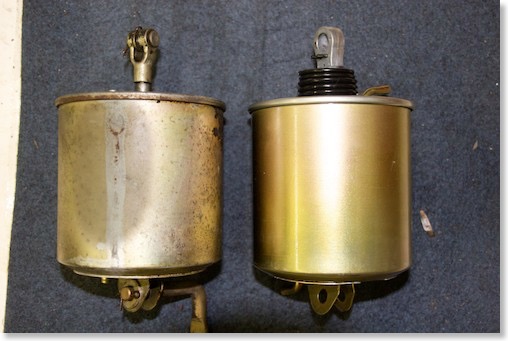
on the left the original actuator - on the right the reproduction unit from a 1969 Camaro RS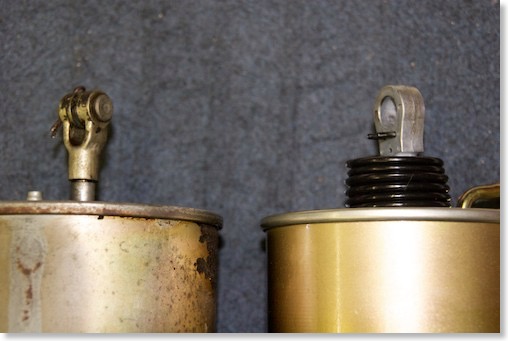
The different rod ends - the original one on the left - the headlight door mechanism is installed in the center of the rod end with a pin.
On the Camaro unit one could probably install it on the side using a bushing.
I have heard that this worked fine for some Eldorado owners as you can see on the picture below.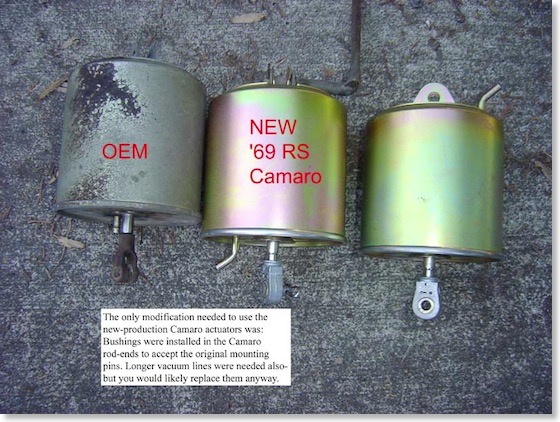
This is how it worked for another Eldorado owner - he installed some bushings on the new unit.
I found this picture on ebay at the auction for a 1967 Eldorado recently.
Update November 2014:
I have been in contact with Mark Maromonte who found this post on my website and replaced his bad OEM actuator with the 69 Camaro RS unit. He did some modifications and sent me some pictures to share here. Thanks Mark! I´m sure its helpful to others as well:
Mark wrote (all pictures below were provided by © Mark Maromonte):
I bought an actuator for a 1969 Camaro RS. I removed the two pins that held the attachment to the end of the rod. Then I cut 3/8 of a inch of the rod off, so the rods were the same length. Then I beveled the end of the rod on a grinding wheel, for about a ½ inch at the end of the rod. This was done so that I could start a ¼ tap on the end of the rod. After the tap was done. I threaded on the Eldo clevis pin. Done! 20 minuets, $76 vs $245. Works fine. Thanks again for suggesting that in your post. Take care, Mark
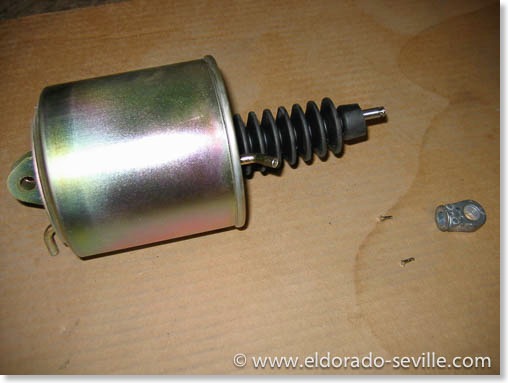
The 1969 Camaro RS headlight actuator is slightly different from the original Cadillac actuator. It can be made to fit though.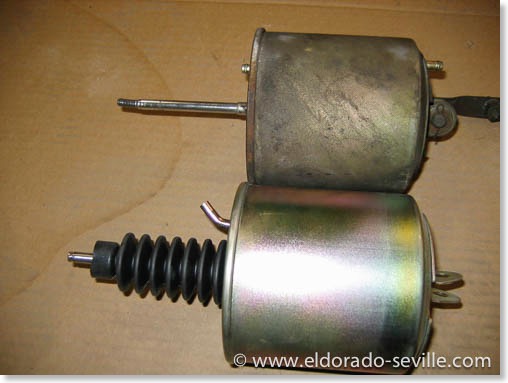
The original Cadillac OEM actuator on top and the Camaro RS actuator below. You can see the difference on the mounting. Also the air outlet is slightly curved on the Camaro. There is a thread on the Cadillac actuator and a clevis pin on the Camaro rod end.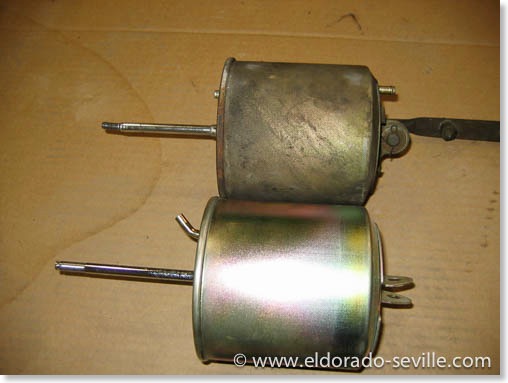
The original Cadillac OEM actuator on top and the Camaro RS actuator below. You can see the difference on the mounting. Also the air outlet is slightly curved on the Camaro. There is a thread on the Cadillac actuator and a clevis pin on the Camaro.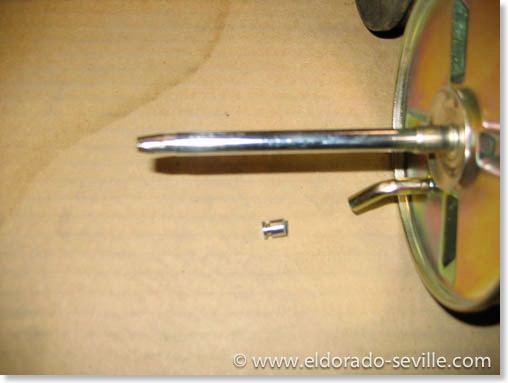
Mark beveled the end of the rod on a grinding wheel, for about a ½ inch at the end of the rod.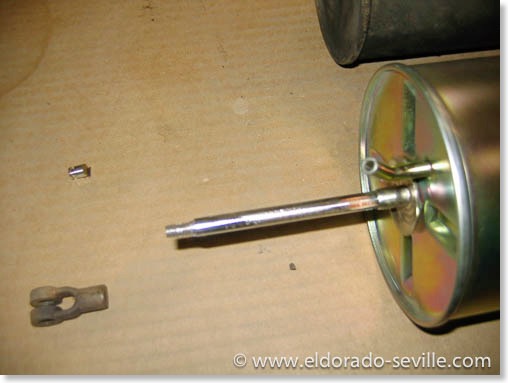
Mark cut a thread onto the Camaro shaft so that the original Cadillac clevis would fit.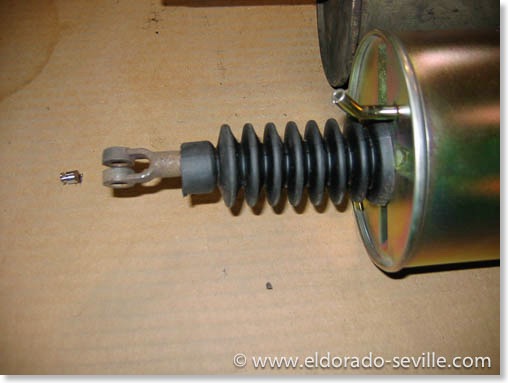
Finished- works perfectly. The modification is done.
It´s a boy! Welcome Elliot!
Of course his first trip in a car was in a Cadillac - I used the 1967 Eldorado to drive him home from the hospital. You can´t start early enough with the Cadillac education!
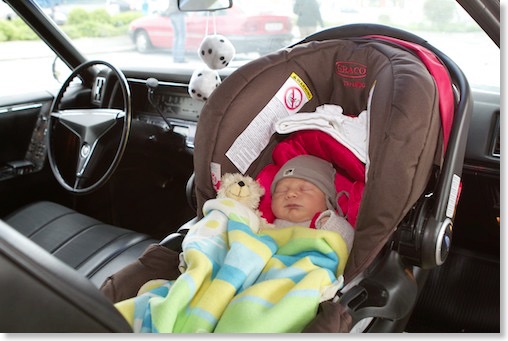
Our son Elliot on the way home from the hospital in Cadillac style!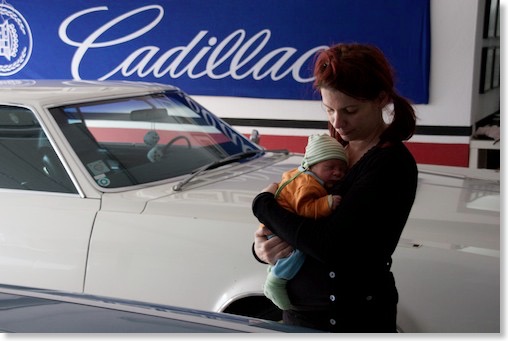
Elliot and his mum at the first visit in the garage...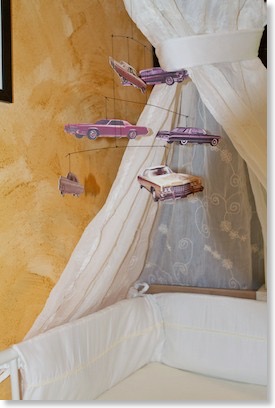
The Cadillac Mobile we made for his crib...
A problem with the 67 Eldorados carburetor
The right headlight door actuator also suddenly no longer works correctly. All hoses are new and it worked perfectly until recently. I can now only make it close if I jiggle on the actuator. Is there any way to rebuild them? A source for new or rebuilt ones? I have heard that the ones from the 1969 Camaro is very similar and only needs some minor modifications to work on the Eldorado as well. So I went ahead and ordered one. But the worst thing was that the freshly rebuilt carburetor made strange ticking noises and sounded like a tractor while accelerating. It worked well though, but the sound was unbearable. Could it be a defective gasket? It was also idling quite badly. Acceleration was superb though, its much more powerful than before, but still something was wrong... The ignition also was completely rebuilt. So I played around with the ignition first, but the ticking sound did not go away, no matter in which direction I changed the timing... Almost sounded like an exhaust leak, but there seemed to be none... It was LOUD! Before I had the carb and ignition rebuilt, it was extremely quiet and idling smoothly but had misses while accelerating.
I got some very valuable tips from fellow Cadillac aficionados and the previous owner of this Eldorado even called me from the USA to give me some tips to solve this issue, and he was spot on with his diagnosis...
With a hose held to my ear and the other end to the carburetor, I was able to locate the source of the noise. It came from the carburetor below the choke assembly. So I took the freshly rebuilt Rochester Quadrajet out again, only to find out that the gasket and the metal shim were installed the wrong way around. This burned a hole into the brand new gasket where the exhaust gases from the heat crossover passage could escape and make this noise.
Of course I did not have a new gasket at hand, so I carefully removed the old one from my spare engine, which was in pretty good shape and installed it.
No more ticking - no more noises, no more bad idling.
The car now drives amazingly good and is silky smooth. It could not be any better.
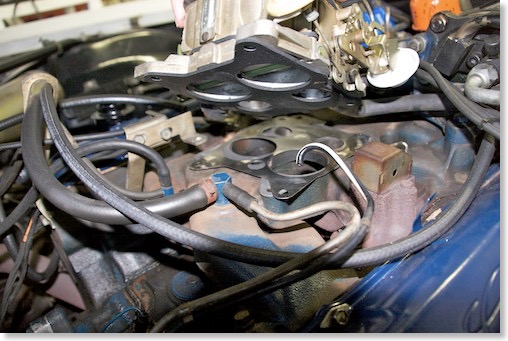
The shim was installed first and then the carb - thats wrong! The gasket has to go on the intake manifold first - then comes the metal shim.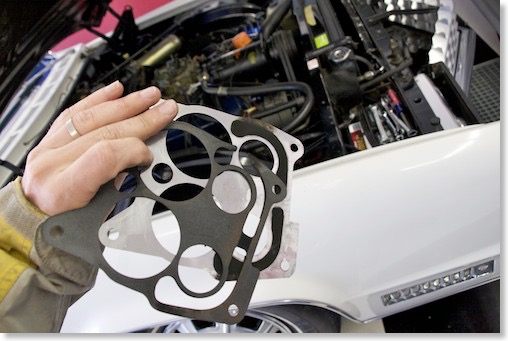
Here you can see the burnt gasket and the metal shim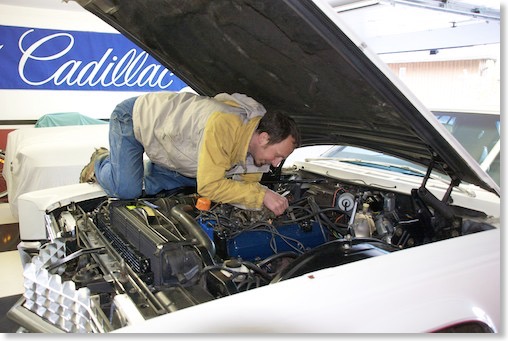
Putting everything back together again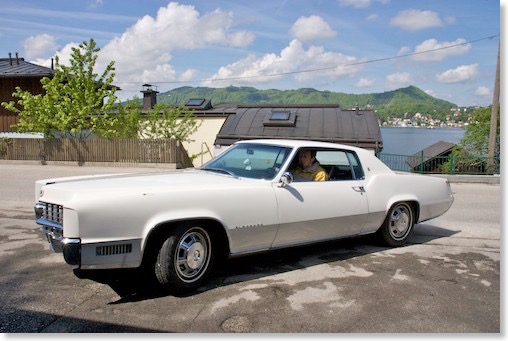
Test drive after the repair - perfect!
The 67 Eldorado is at the restoration shop again
Also on the „to do list“ is to install a new condenser for the air condition, recharge it with good old R12 and to fix a problem with the ignition timing. Cant wait to have the car back!
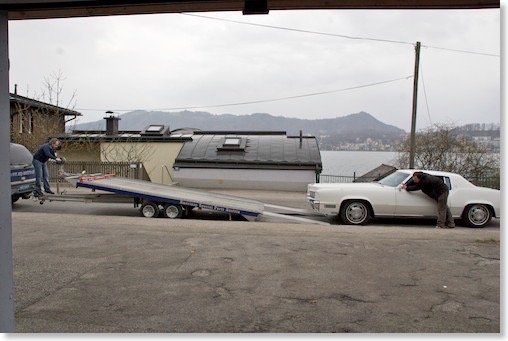
As I could not start the car we had to winch it up onto the trailer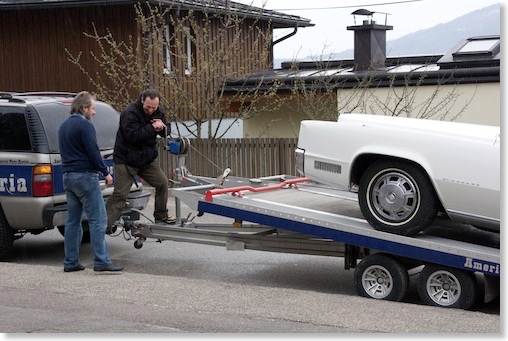
Its pretty heavy...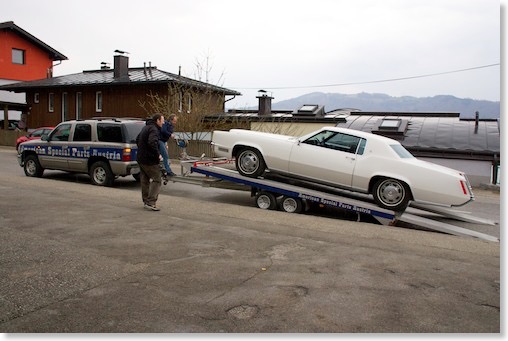
Almost up...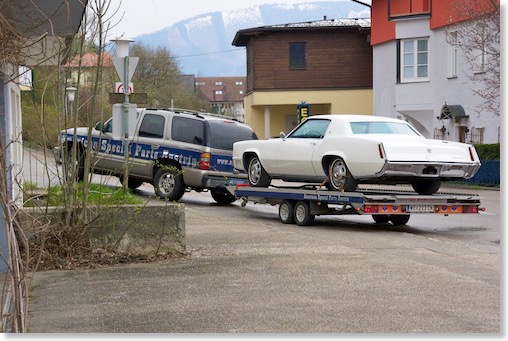
Good bye!
The 67 Eldorado´s waterpump is defective
There are only very few possibilities why this could have happened.
- The thermostat did no longer open
- The waterpump failed
- Air was trapped somewhere in the cooling system
So I removed the thermostat housing first to check the thermostat. This is when disaster struck. The two bolts in the thermostat housing snapped off immediately when I tried to unscrew them. *Cr*p”
I then removed the thermostat and put it into boiling water and it worked perfectly. So I think I can rule out the thermostat.
As the upper radiator hose stayed pretty cool and it did not feel like there is any coolant circulating through it, I suspected the water pump. Maybe the impeller does no longer work. I will have to remove the pump to check it.
My friend Richard came over to help me to try removing the broken bolts which got stuck in the cylinder head water outlet pipe. As all methods we tried to remove the broken bolts failed, we began drilling the remains out. This did not turn out very successful either... The threads also got damaged with this method. Of course one could now rethread this part, but I decided to order a good used one.
Once again Arizona Vintage Parts is the company where I ordered all the spare parts. They are really a great company! They are reasonably priced and so far they had everything I ever needed and inquired for. They are a pleasure to deal with and I can highly recommend them. I´m looking forward for the parts to arrive, as the car in its current state is immobile and blocking the garage...
UPDATE 03/09: The parts from Arizona Vintage parts already arrived within a couple of days after ordering! Wow thats fast! Now I need some time and warmer temperatures to install them...
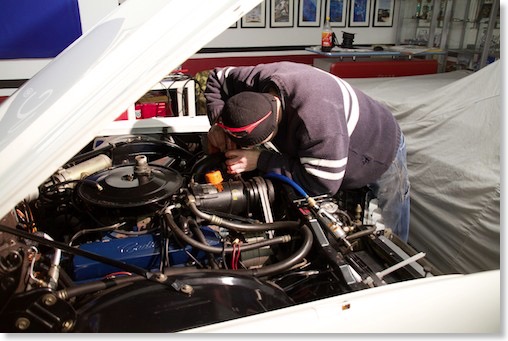
My friend Richard drilling out the snapped off bolts...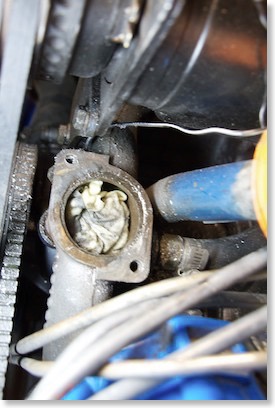
Normally the thermostat is in there. You can see the mounting holes from where we drilled out the bolts. Unfortunately the threads did not survive this treatment...
1967 Eldorado Seat Transmission repaired
I removed it from under the seat, what was a little tricky and involved getting in some strange positions to access all the screws. It would be easier if one removes the seat from the car, but thats a rather unpleasant work as well...
Eventually it came out of the car. I disassembled it and at first everything looked pretty good, but it soon showed that the old grease became rather hard and sticky and one of the three solenoids was no longer able to push the gear into a locked position.
I thoroughly removed all of the old grease and re-greased everything with white lithium grease. I then reassembled everything, reconnected the gear cables, reinstalled the transmission under the seat (thats a very tricky part...) and everything worked like new!
I now have perfectly working power seats again!
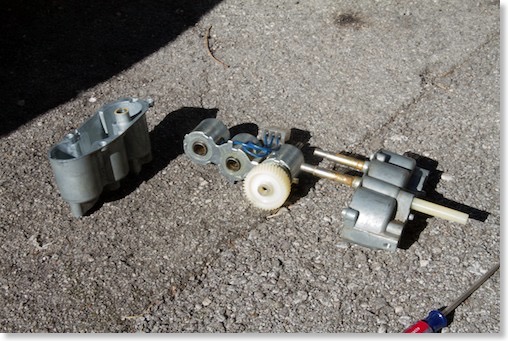
The seat transmission disassembled - you can see the brownish old grease everywhere.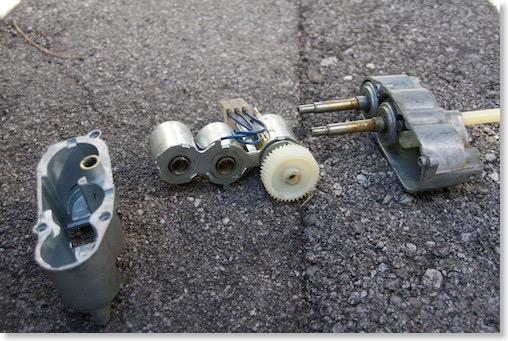
Part of the gears and the solenoids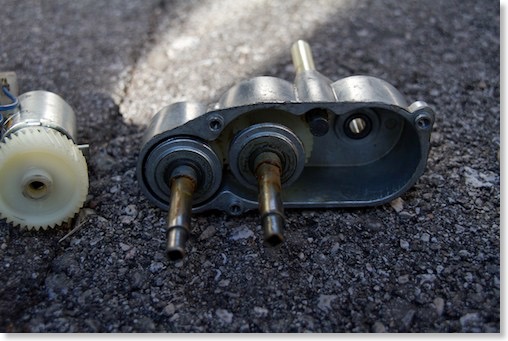
The transmission part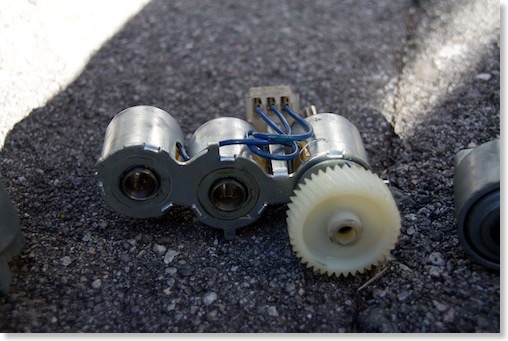
The three solenoids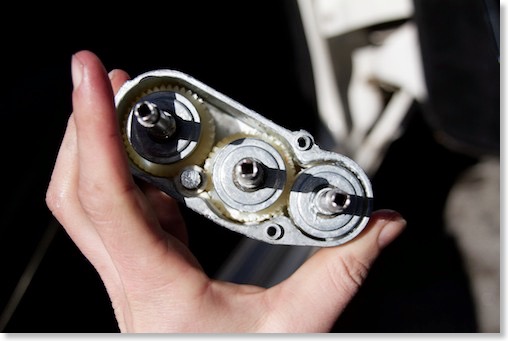
The cleaned and re-greased transmission
1967 Eldorado Door Jamb Switch Repair
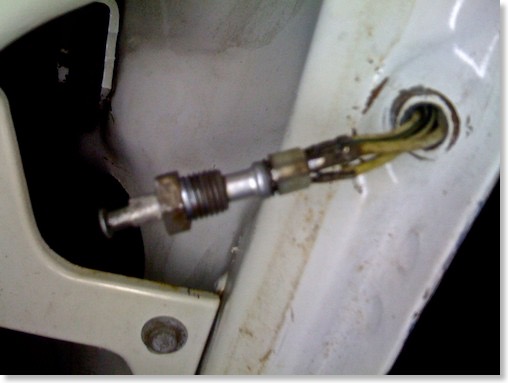
This is how the doorjamb switch looks like on a 1967 Eldorado when removed. Sorry for the crappy cell phone picture!
I will have to clean the paint in the doorjambs soon as you can see in this picture...
The 1967 Eldorado headlight door repairs - first spring outing
While I had the 67 Eldorado out I also turned on the headlights and was once again annoyed by the fact that the right one opened simultaneously, but closed slightly slower than the left one when I turned the lights off. There was a difference of around 1 second in movement between the two headlight doors.
Being a perfectionist I could not stand this, so I began searching for the problem. I already had spent some time in the past trying to fix this, but I did not succeed. The system is driven by vacuum only, so I started to look through the vacuum hoses once again. I had already exchanged a couple of them last year. I found another two brittle ones going through the firewall to the headlight switch from where a slight hissing sound was coming when the lights were on. When I touched them the hissing would become even more noticeable. I then tried to press them onto the connector of the switch and the first hose began to crumble into pieces. So I replaced all the hoses on the switch and rerouted them through firewall through the rubber insulation. There are three hoses . One is the vacuum feed (the one in the middle - I think it was yellow), one is for opening the doors (green) and one for closing (red). I also replaced the red hose behind the firewall going to a T-connector from where the vacuum is fed to the headlight door actuators. I had already replaced the two hoses after the T-connector in the past. With all new hoses in place the doors now perform almost simultaneously and quite fast. So when you run into troubles with your headlight doors, check and replace all the according vacuum hoses first. Its amazing how brittle the hoses going to the headlight switch inside the car can become over the years. It looks like they used a quite different material for these three hoses, as all other vacuum hoses are in much better shape and do not show any sign of deterioration at all.
You can see a video of the headlight doors in action below. On this video they are slightly out of sync. As it looks like they are slightly different every day, depending on temperature and engine idle...
watch on youtube or below
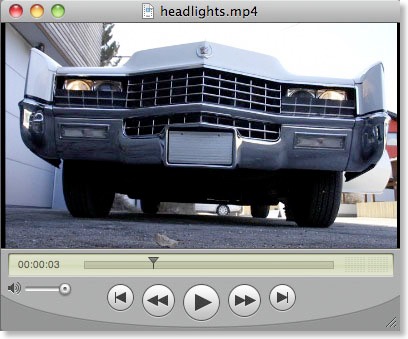
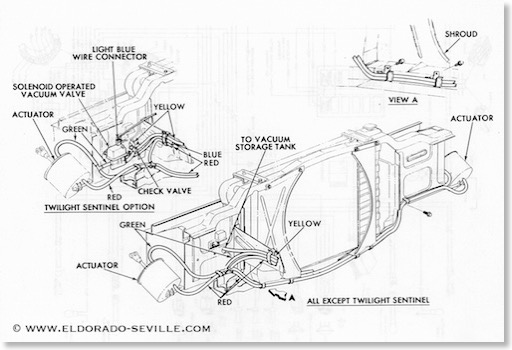
the vacuum diagram for the headlight doors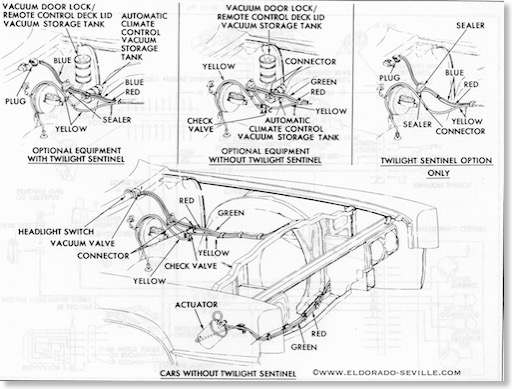
The vacuum diagram for the headlight doors
While the Eldorados were outside the garage my wife used the opportunity to shoot a couple of pictures she had in her mind, which she is planning to hang into the kids room. Cant wait until the medium format film is back from the photo lab. Below you can see only some digital snap shots I took.
Despite the last two unusual warm and beautiful days unfortunately winter is not over yet here in Austria, as some more snow is predicted for next week and the cars are back in the garage desperately waiting for April to come...
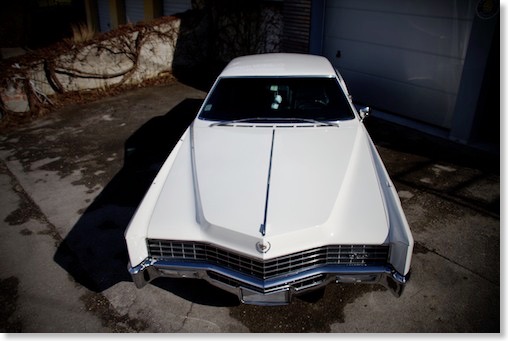
The Eldorado is enjoying some sun rays for the first time this year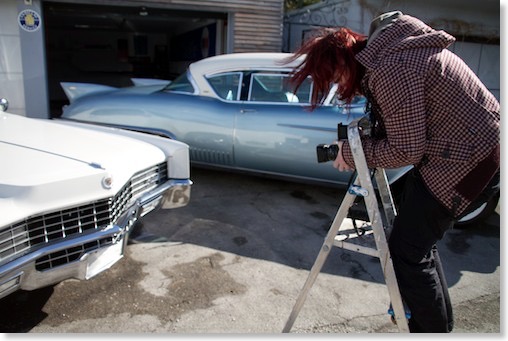
Although she is 7 months pregnant, my wife Afra is still climbing ladders to get the best angle for her shots...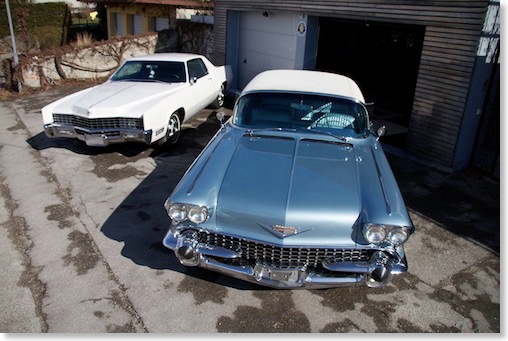
The two Eldorados in front of the garage where the snow has just melted away.
FIXED - 1958 Power Vent Window wiring problem
Today I started to repair the broken wires by soldering them together and put some heat shrinking tubes and electric tape around the repaired areas.
You can see some image below. More of them can be found in the restoration section.
Everything now works as it should! Lets hope that the repaired wires wont break again any time soon ;-)
Next up - repair the door jamb switch of my 1967 Eldorado and install a new power seat transmission as the front up/down solenoid does no longer work and therefore does not engage the according seat transmission. This will involve removing the front bench seat which is very heavy... Oh it is so much fun owning these cars! ;-)
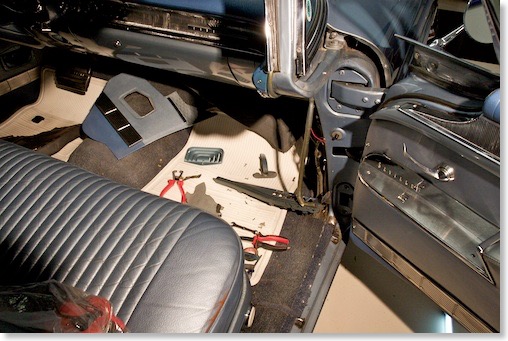
I removed the kick panel, heater-box and door sill scuff plates to get access to the broken cables.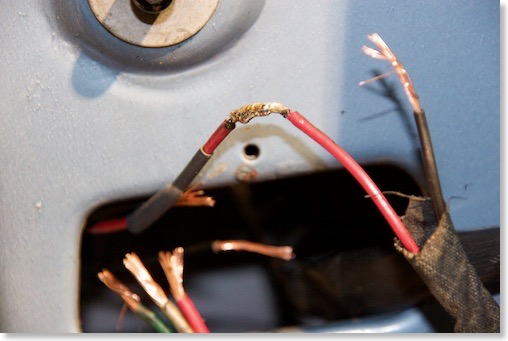
They broke at the area where all the bending is taking place when the door is opened. Here the first wire is already soldered together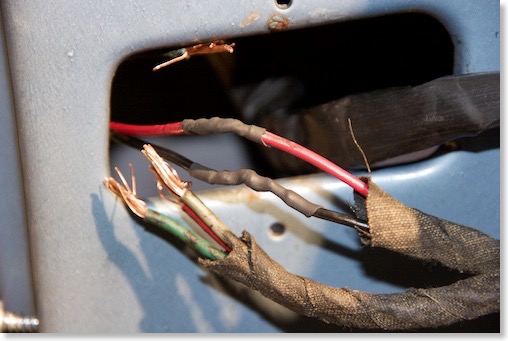
I put some heat shrinking tube around it after soldering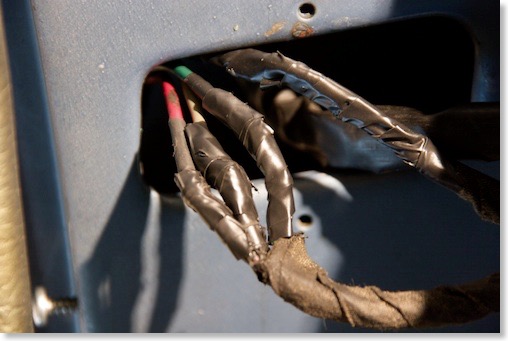
Just to be safe I wrapped some more electric tape around it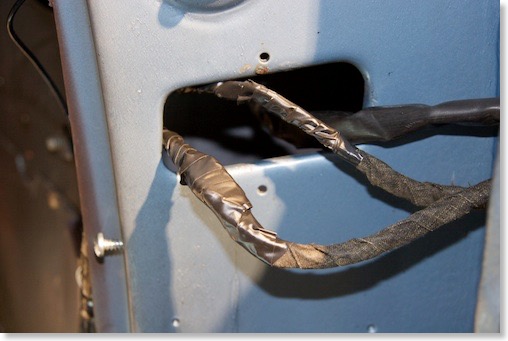
All the wires are back together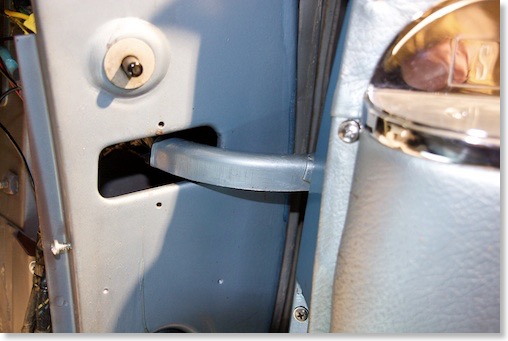
The wires are back together in the metallic tube going through the door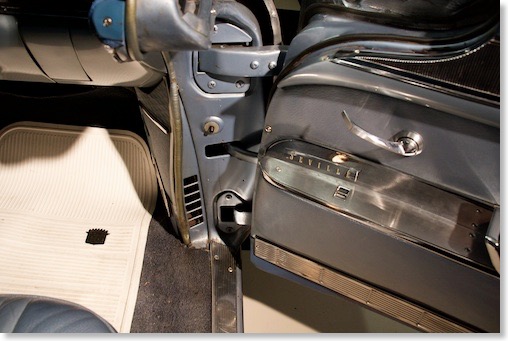
Kick panel and everything else back in place. Everything works as it should now.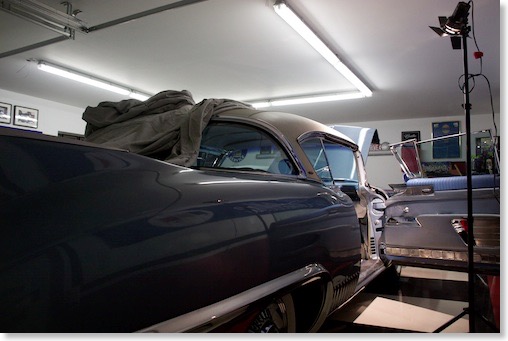
As I work as a cameraman I had a good film light at hand to light the working area properly.
1958 Power Vent Window wiring problem
Yesterday when I was repairing the 6 way power seat which had a contact problem somewhere at a solenoid - suddenly the power vent window started to close itself when I shut the door. So the problem was back! (At least the power seats do work perfectly now!)
So I decided to spend the day in the garage - rewiring the 58´s passenger door as there definitely was a short somewhere in the power vent window circuit. Thats the kind of work I absolutely HATE! 52 years of bending the wires whenever you open the door took its toll.
The bug was easily found after I removed the kick panel, door sill plates, parts of the heat tubing, and the metal tube which is going through the door to protect the wires. 5 (!) cables were broken and only held together by the original fabric covering around it. The cables all broke exactly at the end of the tube where all the bending is going on when the door is opened. I will now have to splice the cables back together somehow and get them back into the tube. No idea how I will do this - I will have to buy some electric supply material first, but the shops are all closed over the weekend. I´m still stunned that the windows still worked and the only sign of failure was that they started to open or close themselves sometimes when I opened the door, and that the battery was drained at one occasion. I guess I was lucky that the car did not catch fire...
UPDATE - Feb. 8th:
I fixed it - read everything about it above or by clicking on this link!
Cleaning the 1967 Eldorado´s Engine Bay
Below you can find some pictures of the now clean engine bay.
The 67 Eldorado´s Automatic Climate Control System is back in working order
I suspected a vacuum leak somewhere in the system. Troubleshooting began with going through all the vacuum hoses. I replaced some which were a little worn out at the connectors. I also cut off the ends of most hoses, as they were all becoming a little loose during the last 40 years. I then plugged them in again.
Not much did change though.
When I came to the hose of the hot water valve and the delay relay, I had the first success. At least the blower motor would stay on in all “Auto” modes, even when the car was idling - but would still go off in “Fog” and “Ice”. I then suspected a leak in the power servo or in the dash controller. So I installed the power servo from my 67 DeVille where everything works perfectly, to be able to rule out any problems. Nothing changed though - the blower would still come on and off depending on the throttle position.
I then soon found the culprit of the whole issue - it was the master vacuum switch - which seems to have a problem with the internal electric switch. As I had a spare one around I installed it - and voilá - everything worked as it should. It always looked good when I checked it before.
I´m very happy that everything is back in working order. The only thing which I still have to repair is the fast idle diaphragm which completely dried out and is no longer functioning. Fortunately I do have a spare 429 engine in the garage from where I can grab and use this part - so I will repair it soon.
I then need a new condenser which is already on the way across the Atlantic coming from Old Auto Air.
By the way - Cadillactim has an excellent trouble shooting guide for the ACC on his website.
The evaporator had to be replaced as well along with the heater core. This is a pretty big task as you can see on the pictures below. You even have to remove the hood to get access to the whole unit. The fiberglass AC enclosure had to be repaired at my car as well as the previous owner tried to repair the evaporator and missed a screw and made a tear into the enclosure. The restoration shop repaired this professionally and it looks like new now.
The best troubleshooting guide for 1967 and 1968 Cadillac´s Automatic Climate Control Systems I got today from Gary Sisk - owner of a 1968 Cadillac.
This is a very easy to follow explanation which will save you a lot of time and you do not even need any special tools.
It was written by Lynn Nicholls and can be found on Stampies Cadillac page - here is the direct link to it.
Below you can find some pictures of my system:
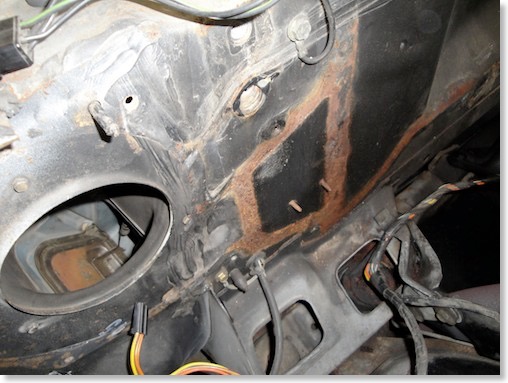
The whole AC unit has to be removed to get access to the evaporator and heater core... The slight surface rust that showed up where the gaskets were, was removed as well of course...
The big hole on the left is where the blower motor is installed.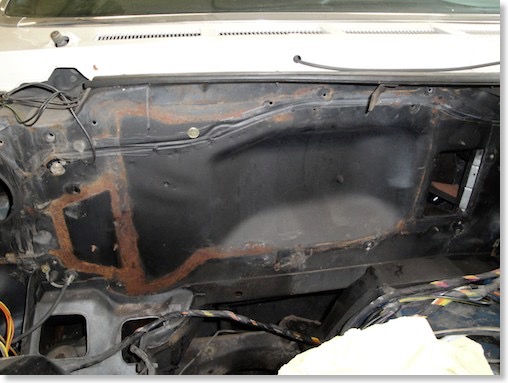
This is where the AC box usually is installed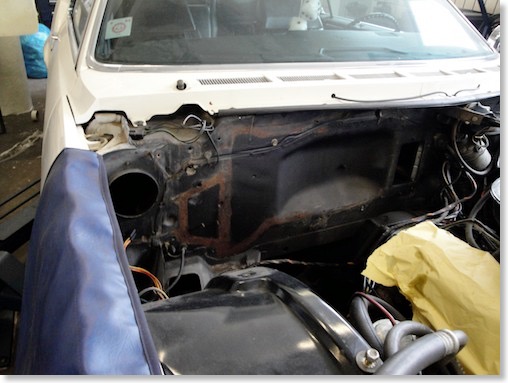
You can see how much has be removed just to get to the evaporator and heater core...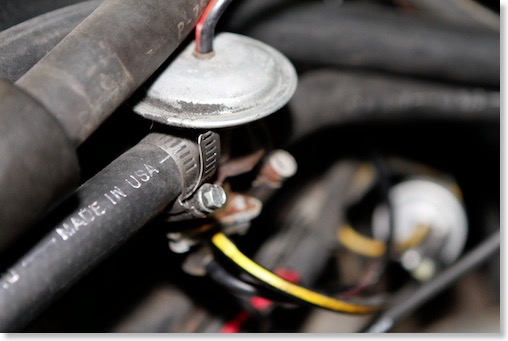
I discovered the first issue at the hot water valve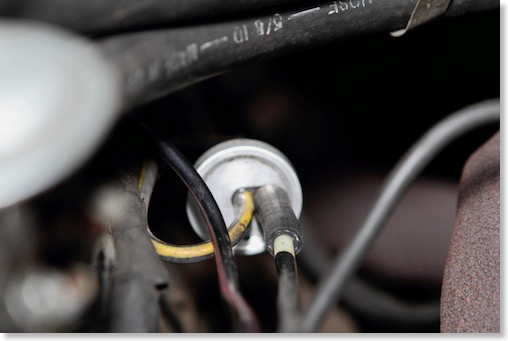
The hoses around the time relay delay were leaking a little bit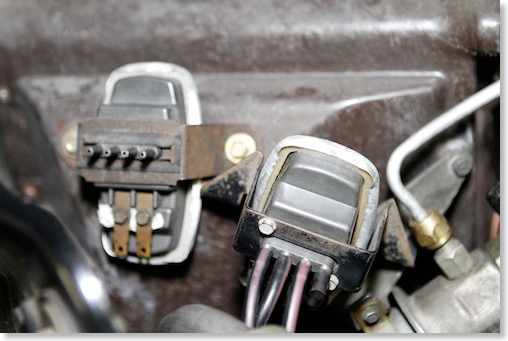
For testing purposes I hung a spare master vacuum switch into the car - this solved the problem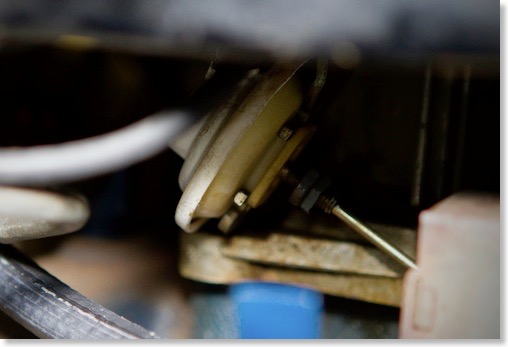
The old fast idle diaphragm was leaking and brittle and was replaced with a better one...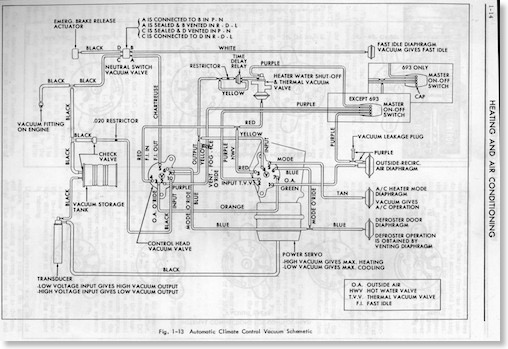
The 1967 Cadillac Automatic Climate Control Vacuum Schematic from the shop manual -
1968 is almost identical BTW... Click on the image for a larger view!
Here is a video about the Master Switch that a gentleman posted on youtube
The 67 Eldorado´s vacuum hoses - Blower issue
During the rebuild of the whole AC system I found out that I´m also having a little issue with the blower which does not always come on at full heat. So as a first step I started to go through the numerous vacuum hoses in the car yesterday. I soon found some old and brittle ones which fell apart when I just touched them. The two hoses that fell apart were the ones going to the right headlight doors.
Original color coded hoses seem no longer available anywhere. Thats why I had to buy regular black ones and paint the red and green stripes on them. Looks almost perfect - I did not think that it would turn out this nice.
Will go through the rest of the hoses soon. With the replaced hoses the headlight doors now work 100% simultaneously, whereas before one was slower.
I still have to find the issue with the blower motor - but I now suspect either the AC controller or the power servo. It works perfectly in full cold - only when I set a higher temperature the blower will cut out. Another problem to solve over the winter... I had almost the same problem with the 67 DeVille before which I could successfully repair.
BTW - if you know of any source for the GM OEM style color coded vacuum hoses please let me know.
You can find a vacuum diagram for the headlight doors here!
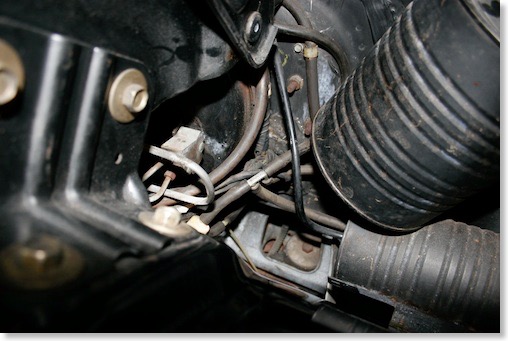
There are lots and lots of vacuum hoses in the Eldorado to check - here are only a few going to the storage tanks...
I will also give them a good cleaning during the winter.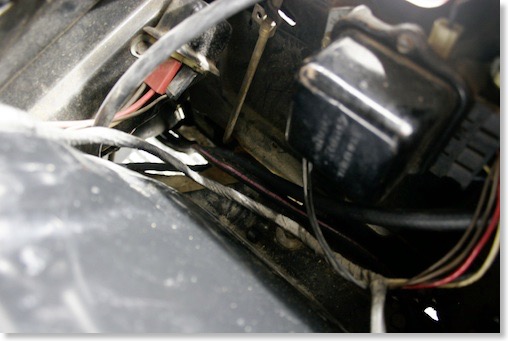
The new hose with the painted red stripe is already in place - looks some kind of original...
The 67 Eldorado passed the inspection
The completely rebuilt AC will get a recharge next week and I can then pick up the car and put it into winter storage together with the other Cadillacs. Can´t wait for the next cruising season.

These are the documents which now allow me to register the car in Austria.
Visiting the 67 Eldorado at the restoration shop
Here are some pictures of what is going on in the shop. You can also see all the restoration pictures here!
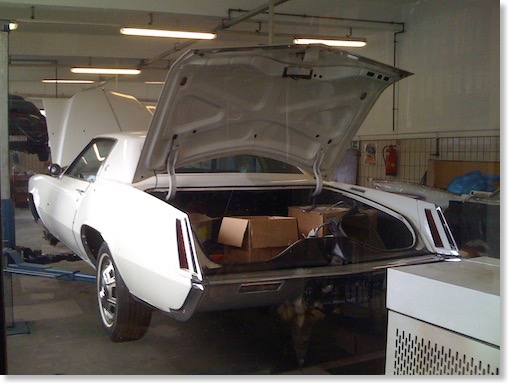
The 1967 Eldorado at the lift - the trunk is full of parts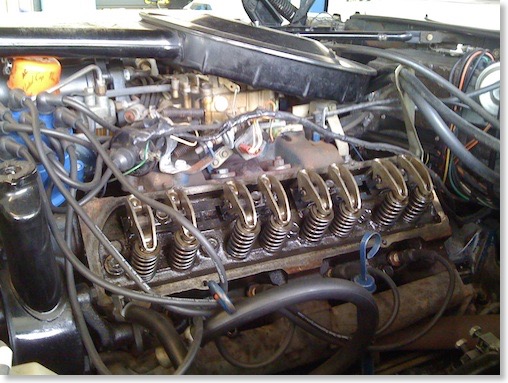
Look how clean the 429 engine looks inside - it only has 27k miles on it - the valve covers will get a repaint and new gaskets will be installed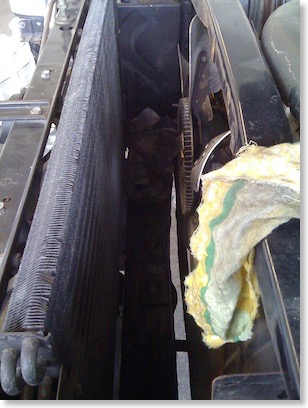
The radiator is out for re-coring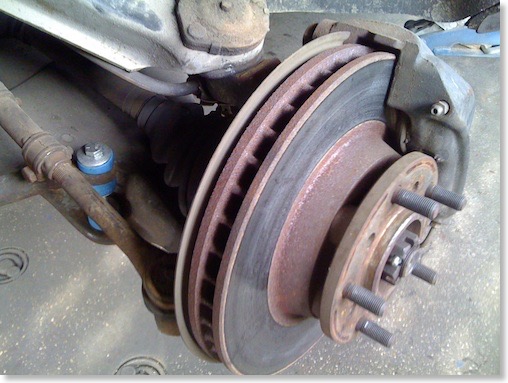
The left front disc brake is sticking a little - it will be completely overhauled as well soon.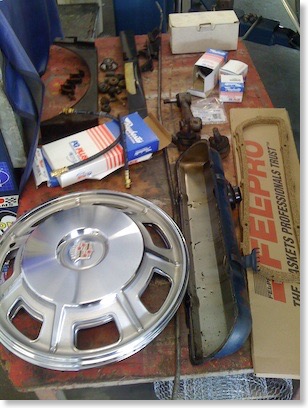
Some of the parts - the old ball joints are out. New brake hoses and brake parts are waiting for installation.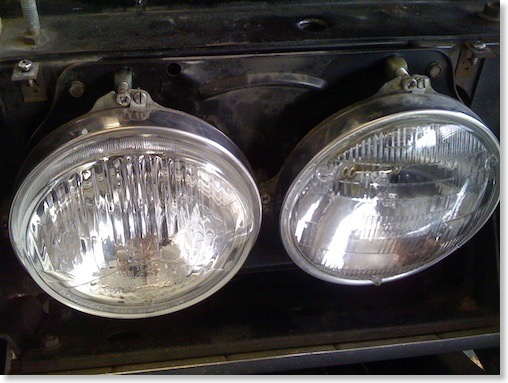
New H4 headlights had to be installed as the original T3 headlights are not street legal in Austria
A short in the 1958 Eldorado power vent window wiring
So there was no other way than hooking up the charger. Two hours later, the battery was strong enough to start the car. I checked all electric components and everything seemed to work - so I was wondering what drained down a fully charged battery over night? This was the moment when I noticed a clicking noise coming from the passenger door. I opened all windows including the power vents . When I opened the passenger door the vent window started to close itself! So even when the vent window was fully closed, the window motor would still draw current. At a test drive with the door closed (of course)- the window would eventually start closing itself again.
So I had to remove all the window switches and unscrew the kick panels. Of course some of the cables behind there were broken or had the isolation coming of at the areas where they had to bend each time the door was opened or closed. I replaced one section of a cable and isolated the other ones.
So far everything seems to be working o.k. now. After an extensive test drive and opening the doors multiple times - everything seems to be well.
It is really a pain to get access to all these cables and trying to repair them. Some smaller hands would be very handy in this cases.
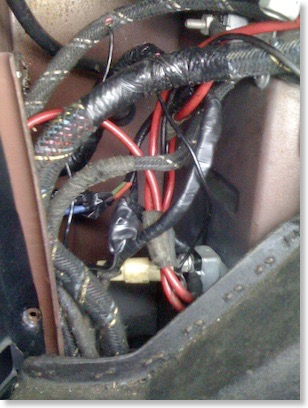
Thats the area behind one of the 1958 Eldorado kick panels where the cables have to bend all the time. After 51 years they seem to get tired.
The 67 Eldorado is now at the shop to get an Austrian license
The cars have to be safe and in very good condition. They check the brakes, all the suspension parts, rust, emissions and everything else what is important. The regulations are very strict - so basically everything has to be in perfect order. We even have to change the lighting system. Its obligatory to have amber rear turning signals, which makes it impossible to keep the rear lighting system in original condition (at least for the time of the inspection...). Often there is no other way than to install additional amber turn signals somewhere on the rear bumper or trunklid. (!)
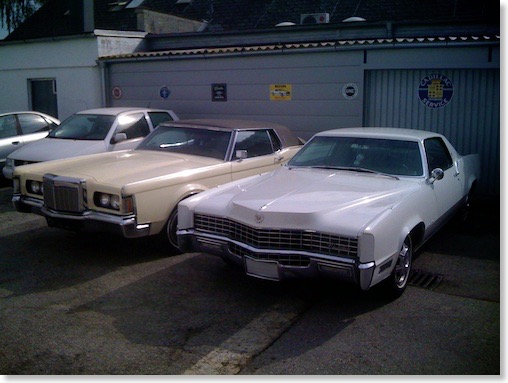
The 1967 Eldorado is now at the restoration shop - here it is on the side of a nice low mileage 1971 Lincoln Mark III.
As I finally want to be able to drive the Eldorado on our roads, today I delivered the Eldorado to my restoration shop, where they will do some of the necessary conversions and repairs. They already helped me with my 67 Deville and the 58 Eldorado.
The Eldorado will now get a new radiator as the original one is leaking badly. Actually I will have the original one recored and repaired. The front disc brake will get an overhaul due to a partly sticking piston, together with all new brake hoses. The fuel line will be replaced as it started to leak as well. The lower ball joints and the idler arm will get exchanged along with some rubber bushings. Besides of this list of repairs the rear lights will be converted for the inspection.
After the Eldorado is back in perfectly working condition, the inspector will check the car and hopefully approve it... Unfortunately until all this will be done it will take some time, and the winter is just around the corner - so it will go right back in winter storage after this procedure.
The 1996 Buick Roadmaster - new rear wheel cylinders
As our 96 RMW did not pass the technical inspection 3 weeks ago I had to order new rear wheel cylinders which were installed today as well. It then passed the annual inspection and can be driven for another year.A great 1958 Eldorado Seville for sale!
“I want to sell my 1958 Eldorado Seville. The car is 100% complete and in very fine condition. Everything is working and it drives like a new car. The interior is 100% original and in super condition.”
If you are interested please contact Per Rubien in Denmark directly! Phone: +45 98134480 or mail:
He is asking around € 35.000.- - which is a very reasonable price for a car like this!
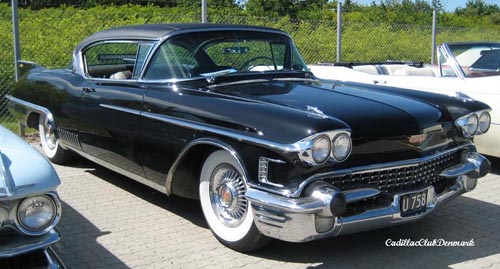
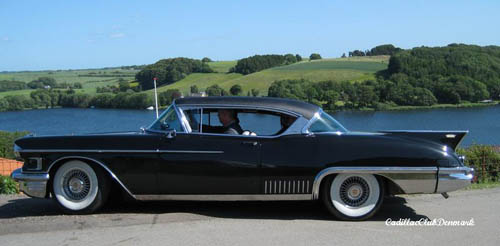
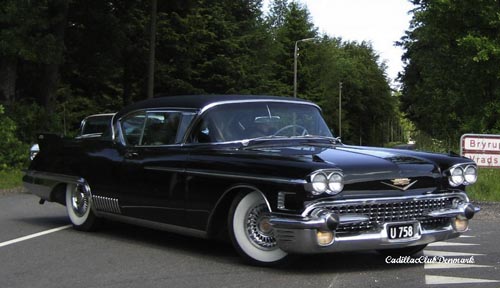
1967 Eldorado - the headlights and the ALC work again
I also got a new control valve for the ALC compressor from Arizona Vintage Parts (a company I highly recommend). With this new valve the ALC is back in working order and the car is now raising its rear to the correct riding height again.
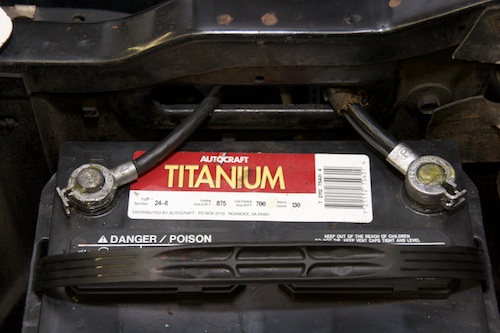
the new original style spring clamp battery cables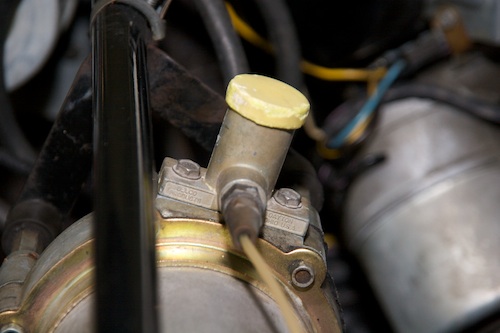
a new used ALC control valve is also in place.
The first 1967 Eldorado parts arrived
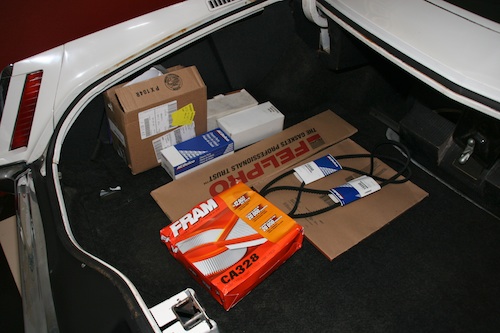
The first few parts that arrived - belts, filters, gaskets, caliper repair kits, dryer, pitman arm, air filter and some other stuff....
1967 ELDORADO HEADLIGHT ISSUE - ONE STEP FURTHER
Glen wrote the following:
“If you take the panel under the steering column off I think you can reach up and disconnect the connector from the light switch. Or you maybe able to get a meter probe up there to check voltage. The battery connection to the switch for the headlights is on the 14 gauge yellow wire. This only supplies the headlights and front parking lights. If you have 12 volts there then your problem is in the switch. There is a circuit breaker in the switch and it may be bad or the contacts in the switch are bad. IIRC these switches have a vacuum switch on the side that operates the headlight doors. This makes them hard to find. They do not interchange with the 68 Eldorado because in 67 the parking lights only come on when the switch is pulled out to the first position while in 68 the parking lights come on with the headlights also. If you do not have voltage on the yellow wire then you should check the fusible link on the starter. It is an 18 gauge dark green wire that changes to a 14 gauge red with white tracer before it gets to the connector. Check for 12 volts at the connector and check the contacts in the connector. “
Glen was spot on with his diagnose and it turned out that the green 18 gauge fusible link was the culprit for my headlight problem as it came apart for unknown reasons.
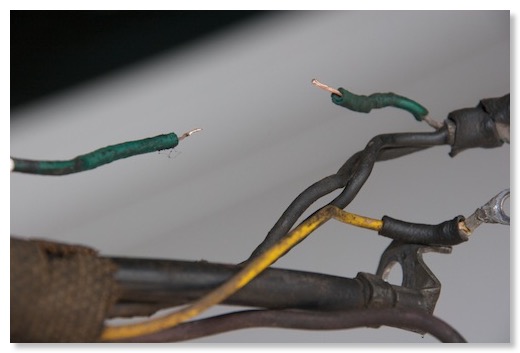
the green wire once was a fusible link - it fell into pieces when I slightly pulled on it
As a follow-up Glen recommended the following:
“You might want to look closely at the break in the link. See if it is melted or did was it broken by mechanical means. If it was just pulled apart or cut then you have to check what caused that.
To trouble shoot this if it was actually melted due to over current, I would unplug the headlights and front parking lights, and temporarily connect a headlight or other big light bulb, in place of the fusible link. You can then try things without blowing fuses. With the troubleshooting light in place it will light up brightly if there is a direct short. With the headlights and front parking lights disconnected the test light should not light up at all under any condition. You should be able to move change the position of the headlight switch, switch from high to low beam (light switch in the headlight position); wiggle the wire harness anywhere and not light up the test light. If it does you have found the short.”
I did this procedure today but it did not show any shorts. I then reconnected the front lights and everything did work again. I will now have to find a replacement fusible link which is very uncommon over here in Europe. I will replace it together with the positive battery cable where the clamp is almost falling apart. I hope the issue wont come back. It looks like the fusible link maybe only fell apart due to age as it did not show any signs of burning. Its located very close to the starter and the exhaust manifold - so maybe 42 years of dirt and heat just made it crumble into pieces....
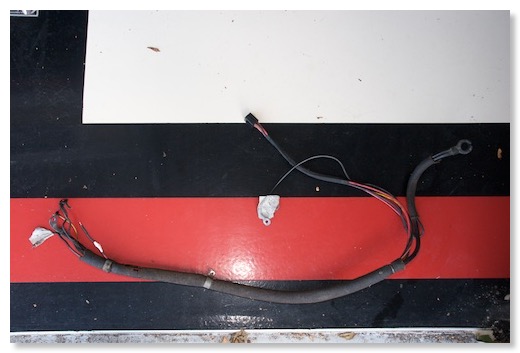
the completely removed positive battery cable harness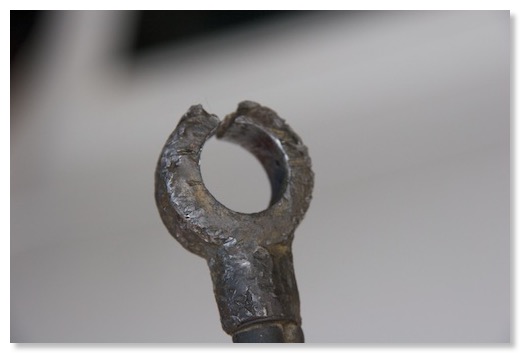
the original battery clamp - its already missing the spring part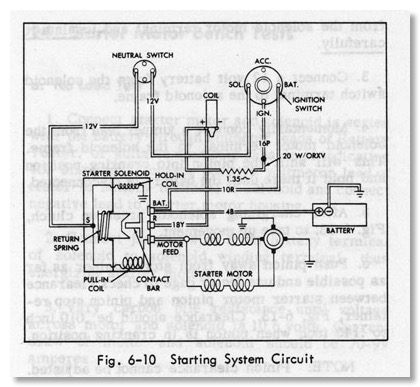
The starting circuit diagram is showing the battery cables - Click for larger picture!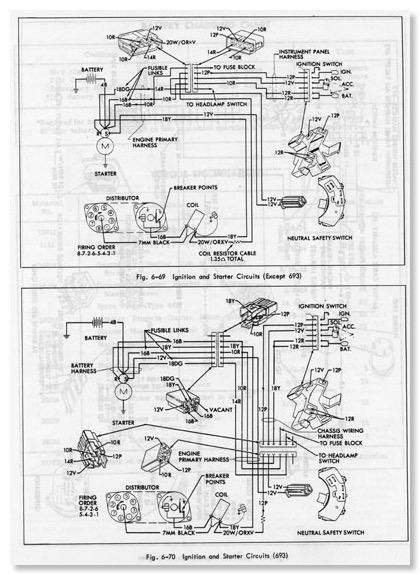
The Iginition and Starter Circuit Diagram for the Eldorado (693) and the other Cadillacs of 1967.
Click for larger version!
New pictures of my 1967 Eldorado on my website
You can find them in the Eldorados gallery.
1967 Eldorado Inspection - ALC issues and dead headlights
When I arrived there the headlights did no longer work. They did not have any problem before.
When the inspector wanted to turn them on - the headlight doors did open but the lights did not come on.
Also the parking lights and high beams do no longer work. The taillights did come on though and the cornering lights and turn signal do work as well.
Very strange… Checking the fuse panel I found out that there is no fuse for the headlights. My guess is now that it must be the headlight switch - can this be repaired? The shop manual mentions a 25amp circuit breaker in the switch but it does not mention how to repair it or check it.
The other thing which stopped working yesterday was the Automatic Level Control. The vacuum operated compressor in the engine bay seems to work as I can hear a ticking noise, but the car does not raise. I also added some pressure (100psi) to the service valve at the compressor but the rear of the car did not raise at all. When I depressurized the compressor the car did not come down any further either. Very strange… I really need to get this fixed - non working parts are making me crazy!
The car lost the yellow plastic cap which is located on the top of the regulator valve while driving it into the shop. Unfortunately it landed directly below one of the tires and was crushed to tiny little pieces. I will have to try to find a replacement. I have no idea how this could have come loose.
The car did not pass the inspection for some other reasons as well , like a sticky front disc brake, worn ball joints and pitman arm and some other minor things . It will keep me busy repairing all this for a while. Whats worrying me most is the headlights and the ALC as I do not have any clue at all.
On the positive side - the car was a pleasure to drive the 60 miles to the shop - its so much different to the “regular” Cadillacs - Big, silent and powerful and no big boat ride ;-)
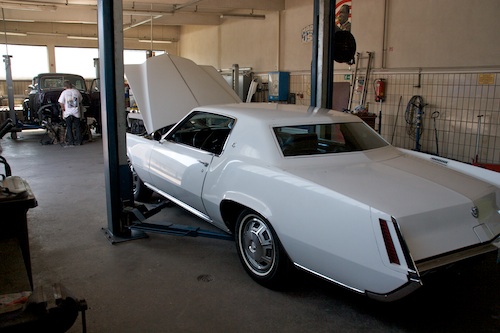
in the shop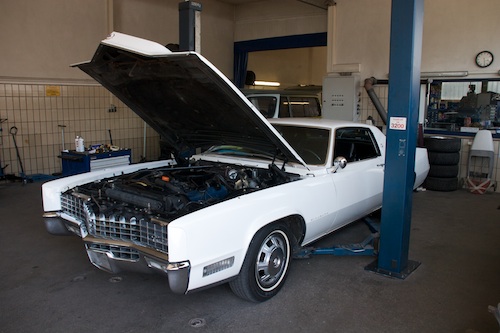
1967 Eldorado detailing
The Eldorado got a wet cleaning treatment of the carpet and trunk and a full detailing of the interior - which looks like from a new car now. We also started to clean and polish the original paint but ran out of time. We only finished the hood - but the before and after difference is amazing. More work will be done soon.
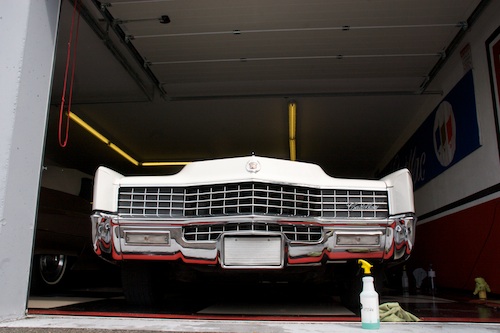
The Eldorado is lurking out of the garage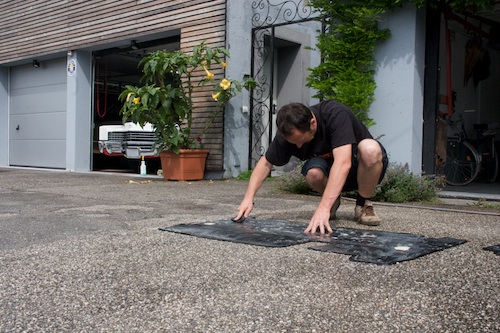
washing and brushing the original rubber floormats...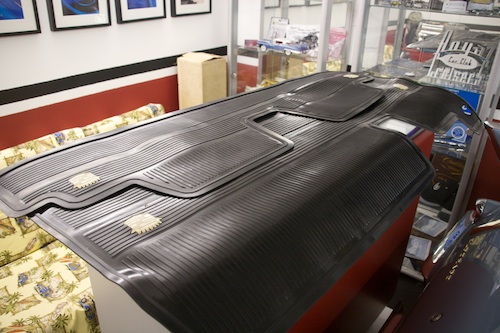
...they turned out as if they just left the factory - awesome - this Meguiars rubber treatment is more than fantastic!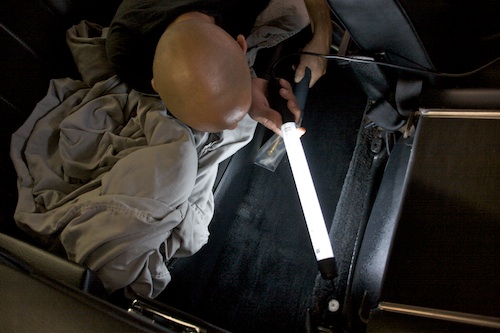
Tayfun - wet cleaning the carpet and trunk - looks like new now as well - the low miles are showing on the interior pretty well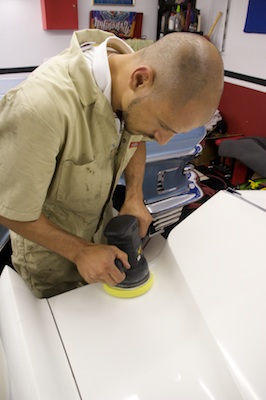
My buddy Tayfun polishing the hood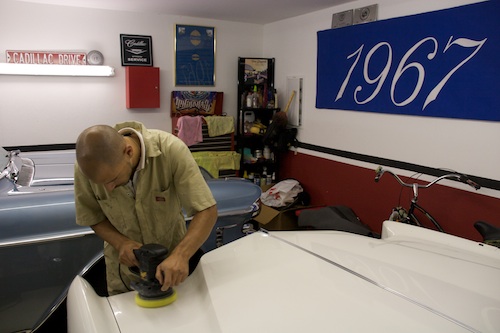
Tayfun at work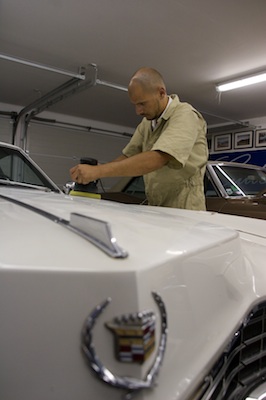
The hood´s paint came out really fine and smooth - unfortunately we ran out of time and could not finish the rest of the paint
1967 Cadillac Eldorado radio replacement attempt
Today my wife helped me trying to replace it. It is always a pain to get the old radios out, as the electrical connectors are pretty hard to reach if you have big hands like me... After some fiddling and lots of bad cursing, the radio eventually came out. During this procedure I found out that somebody messed around with the speaker cables which go to the rear speakers and installed new ones - which were connected directly to the front speaker. They cut the wire going to the front speakers and spliced in the rear speakers. Not very well done...
When I finally managed to install the “new” AM/FM radio I found out that it does not fit at all... It either comes from a 66 or a 69 Cadillac?
So I installed the old AM radio coming from my convertible where I did the same procedure 2 years ago - only to find out that non of the 2 speakers seem to work anyways...
I now have to find a good used 1967 AM/FM radio and 2 speakers - the list of things I need is getting longer everyday. I will also have to repair the wiring of the rear speaker back to original.
Thanks to my wife Afra for helping me!
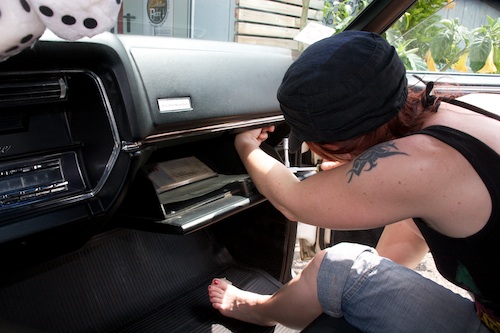
removing the dash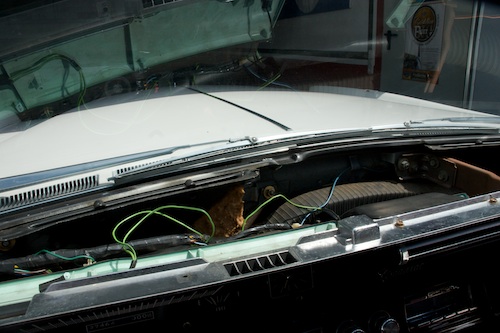
the removed dash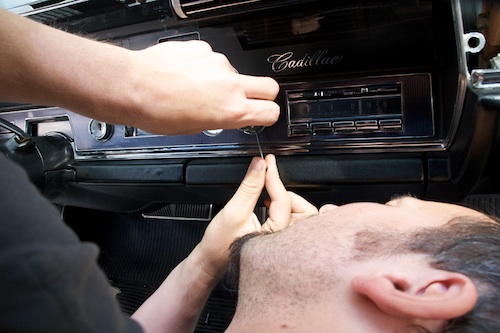
removing the radio buttons was the easiest part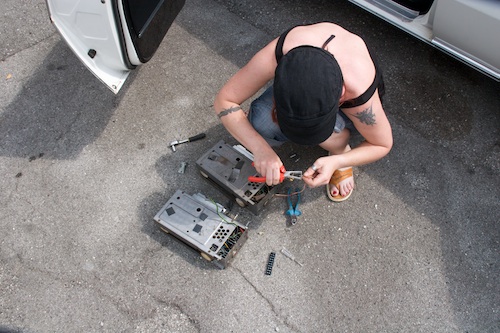
Afra repairing the wiring of the old radio
Cleaning the engine bay
I hope though, that I will ever be able to get my hands clean again as well... I guess I should wear a pair of gloves next time...
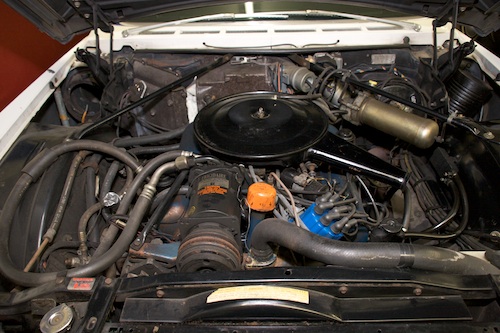
This is how the engine bay of my 1967 Eldorado looked before cleaning - I will also have to install the new evaporator later, reinstall the blower motor, connect all the AC hoses and recharge the AC... lots of work ahead
.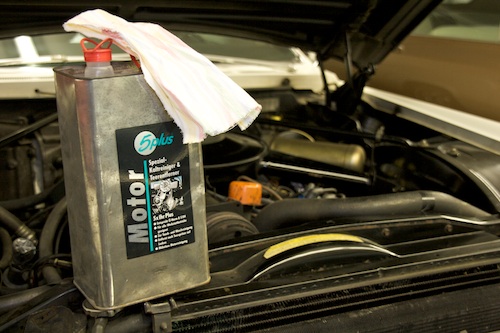
The engine degreaser is pretty aggressive on the oily gunk and dirt.
The 67 Eldorado arrived!
The truck arrived at 3 pm with the 67 Eldo and the 69 DeVille which I bought for a dealer here in Austria. Both cars had empty fuel tanks and dead batteries so we could not start them and had to push and pull them from the truck, what took as quite a while. This was very exhausting work, but eventually we had the cars parked in front of the garage. I poured some gas into the tanks and installed batteries from my other Cadillacs. I then turned the keys and the cars roared back to life without any problem. The 67 is a very nice survivor with only 27k miles on the odometer. It drives like a dream - I´m very impressed. The biggest surprise for me was that it has disc brakes on the front - I always thought it would come with the basic drums and not with this very rare option.
The cars got a quick wash and were then parked inside the garage.
Tired and exhausted, but very happy I finally went to bed thinking about all the work I will do in the upcoming weeks. Stayed tuned!
If you are interested about the cars history and how I found it visit my history page!
Here are some pictures of when the car arrived:
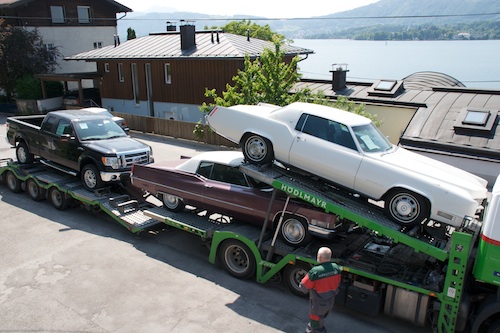
the truck as it arrived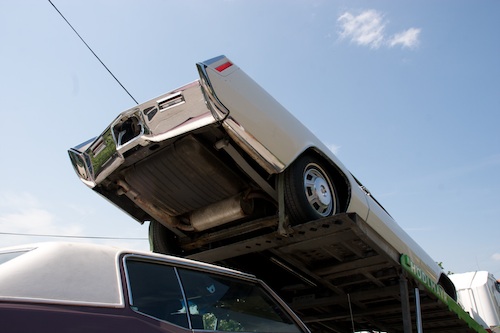
the 67 proudly rode on top...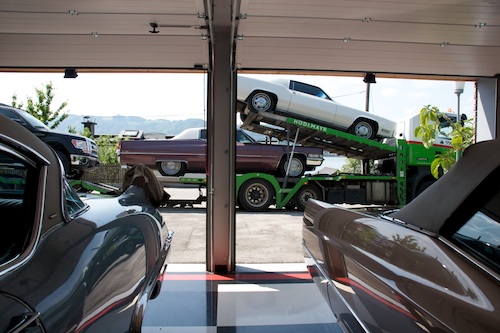
the old Cadillacs watching the new one arrive...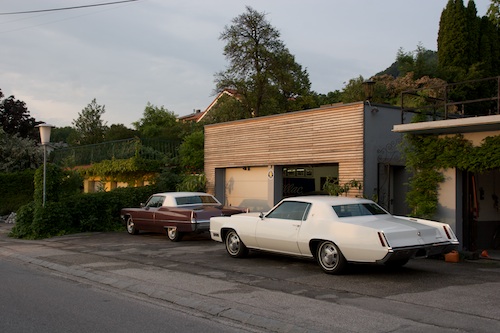
finally unloaded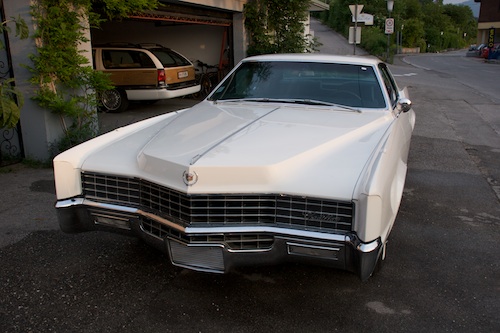
after a quick foam bath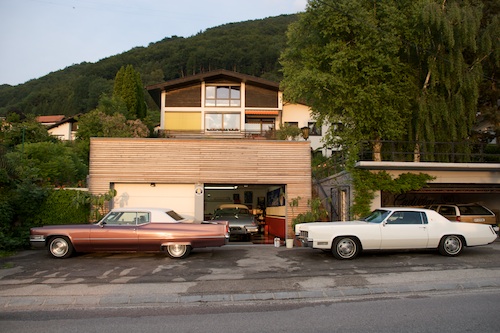
looking a little cleaner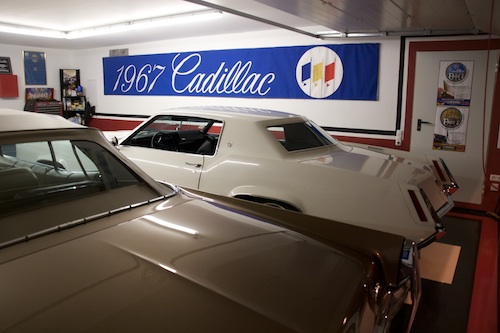
yes - they all fit in...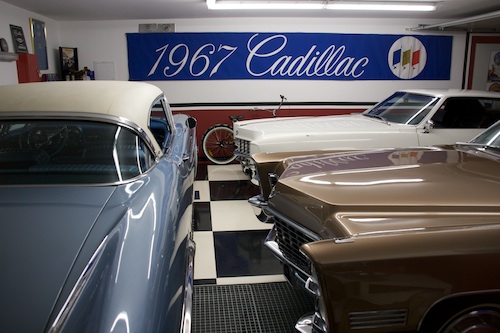
nice sight in front of the original 1967 Cadillac banner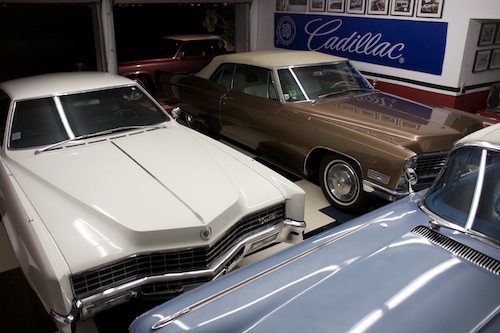
its narrow - but they do fit in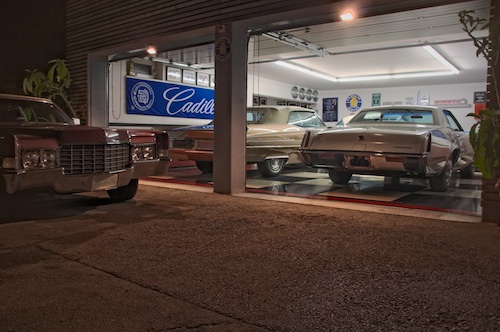
looking into the garage - nice view...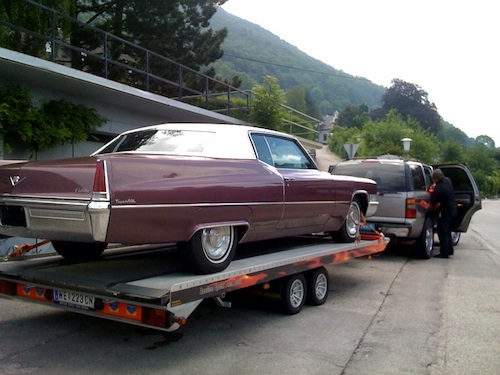
the mauve 69 was picked up by its new owner - a dealer in Austria - it will be for sale there soon. Its a really nice car which I would like to keep if my funds would allow it. Whoever will buy this car, will get a nice Cadillac in a stunning color combination!
The 67 Eldorado arrived in Rotterdam
Details about the 67 Eldorado shipment

the ship my 1967 Eldorado will sail on across the Atlantic Ocean
I bought a 1967 Eldorado
More details when the car arrives!
The 67 Eldorado was picked up
Last cruising with the 58 for this season.
Today was a picture perfect fall day, so my wife and I drove around a little bit. I filled the gas tank up to the brim and overinflated the tires for the long storage period.
I will soon change the oil, give the exterior a fresh coat of wax, clean and treat the leather with a conditioner, remove the battery and then put the car on blocks over the long winter. I only drove the car 640 kilometers (397 miles) this season. Somehow I did not make it to many shows this year and it was a very humid summer and fall.
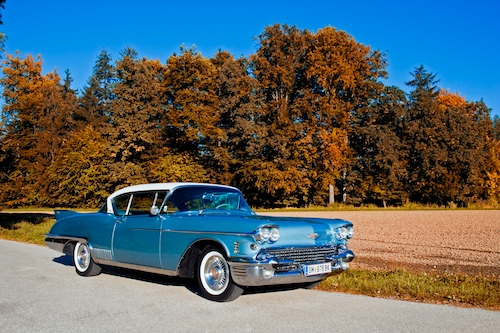
pretty fall colors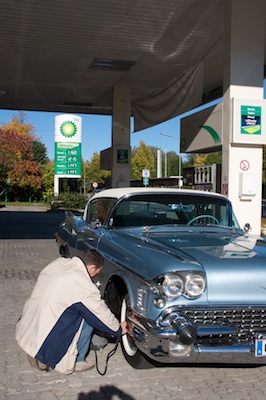
over-inflating the tires for storage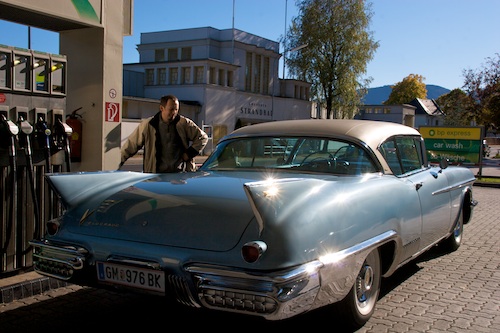
filling the gas tank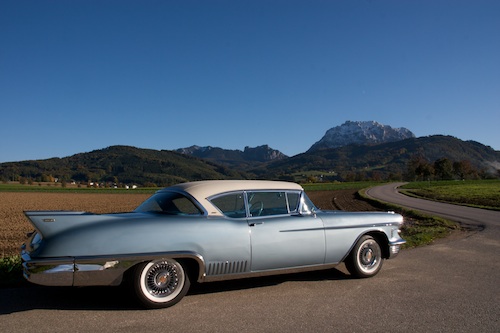
There is already snow in the background!
My 58 in the newspaper
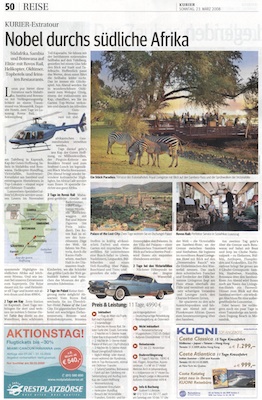
1967 Cadillac turn signal switch arrived
UPDATE 2010: In the meantime (since 2009) the Boyne switches they are getting reproduced and show up on ebay all the time. Also OPGI shows them in their Cadillac catalog. Its harder to find one for a T&T column as they are not getting reproduced so far. I do not know where one could find a switch for T&T though. If you know of any resource for T&T switches please let me know, I would love to have a spare one for my Eldorado!
When I was looking for a switch for my 1967 Deville, I only investigated resources for cars without T&T columns and this is what I found out:
According to the 1971 parts manual there are two different ones for standard column cars and one for T & T
- 1967 - 1968 (Exc. T & T) Part # 7800483 - Switch, w/wiring harness (Delco-Remy)
- 1967 - 1968 (Exc. T & T) Part # 7805675 - Switch, w/wiring harness (Boyne Products)
- 1967 - 1968 (T &T) Part # 7805676 - Switch, w/wiring harness (Hazard warning switch an integral part)
The two different standard column switches can be identified without removal as the parts manual describes:
„Hazard warning switch is an integral part. Switches can be identified before disassembly as follows: The Delco Remy switch has a square hole for the hazard warning switch in the cover, the Boyne Products switch has a round hole for the hazard warning switch in the cover.“
The problem with the switch on my standard column DeVille was that the return cancel cam broke, and that non of the repair kits were available for the Boyne switch.
Replacing this switch in the steering column is quite a pain - below you can find the instructions from the shop manual on how to do it.
There is also a revised procedure for a much easier installation below in the “Cadillac Serviceman" from August 1967!
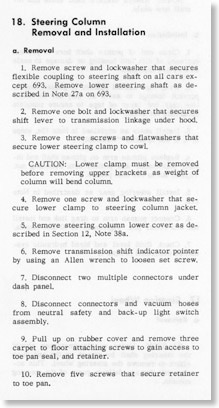
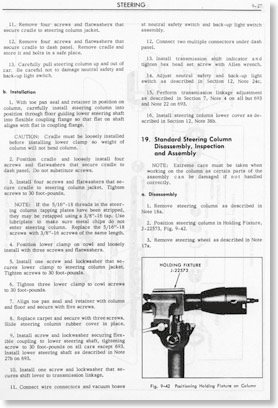
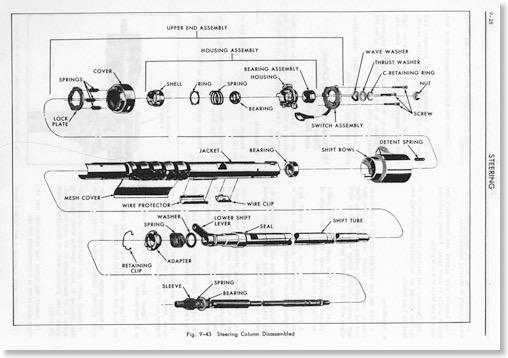
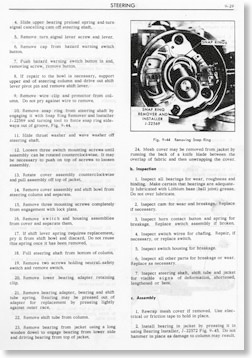
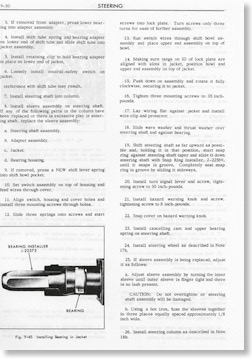
Click on each picture for a larger view!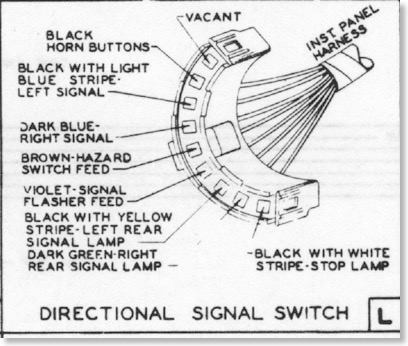
The connections going to the directional signal switch - the turn signal switch connector
The Cadillac Serviceman from August 1967 shows a revised procedure for a much easier installation of the switch.
If you need the shop manual instructions for a tilt and telescope column click here! Or just use the procedure above!
New video of my 1958 Eldorado Seville online
My wife Afra (a professional cinematographer) shot it as she had to test a new camera for work. As it turned out we wont buy the camera - but she edited the test shots into a nice short 2 minutes clip.
Enjoy!
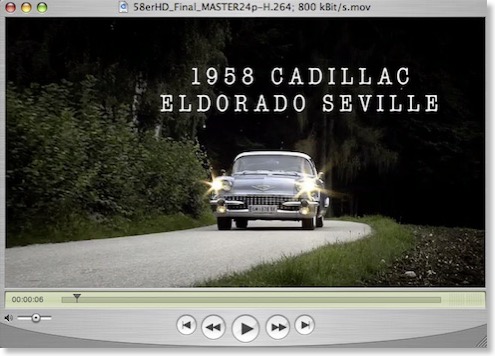
This video can also be found on the video page of my website.
The last cruising and photo session this year
More of them can be found here.
The 67 is in the shop...
Later I also dropped off the 67 there as some smaller things have to be repaired as I do not have the necessary tools nor skills to do them myself.
- The front-suspension needs a rebuild and I do not have the presses to push some of the bushings in and out.
- The switch for the directional switch in the steering column has to be replaced
- Need a new ignition lock
- The transmission has some leaks I could not find
The guys from who helped me with the restoration of my cars will take over.
In a couple of weeks I should have the car back. It will go directly into winter storage then. Today also was the last day to drive the 58. I will return the plates over winter.
Preparations for the Cadillac BIG Meet
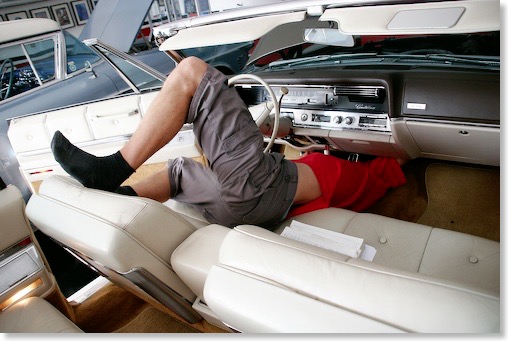
working on the AC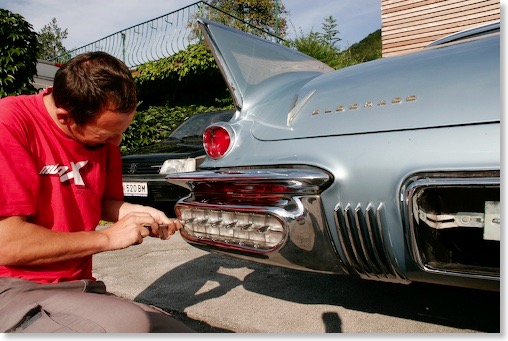
installing the new backup lenses - which had to be custom fitted...
AC Problem
Three parts could cause this problem:
- The dash switch with its rotary valve from where I can hear a slight hissing noise,
- the power servo on the firewall
- or the master switch itself - what I doubt.
As I hate when something does not work on my cars I ordered all the parts. I found a good source which sells all these parts rebuilt. Hopefully they will arrive soon as I would like to have this issue resolved before the Cadillac Big Meet. It should not be too much of a hassle to install them when they are here.
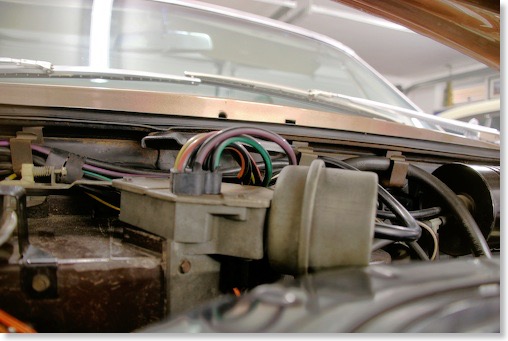
The power servo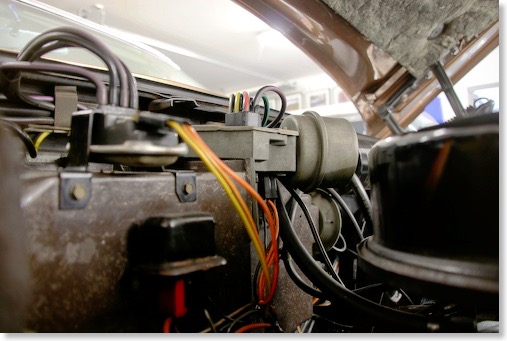
The power servo and master switch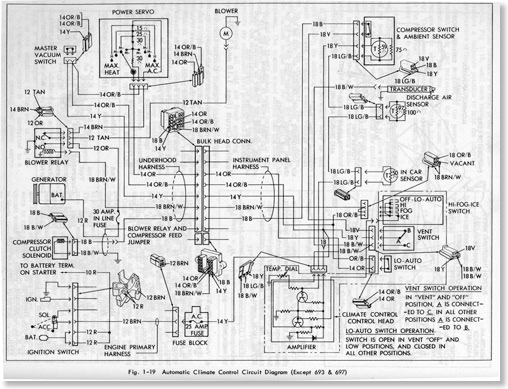
The electrical circuit of the Air Conditioning system of the 1967 Cadillac DeVille in a digram
Here is a video about the Master Switch that a gentleman posted on youtube
Interior cleaning and Cruisenight
Cruising night!
After cleaning we had a nice cruising trip around the lake with friends and our ladies.
A photosession with the 58 - Tires balanced
You can find the gallery of the first digital images here - the ones we shot on medium format slides will follow sometime next week.
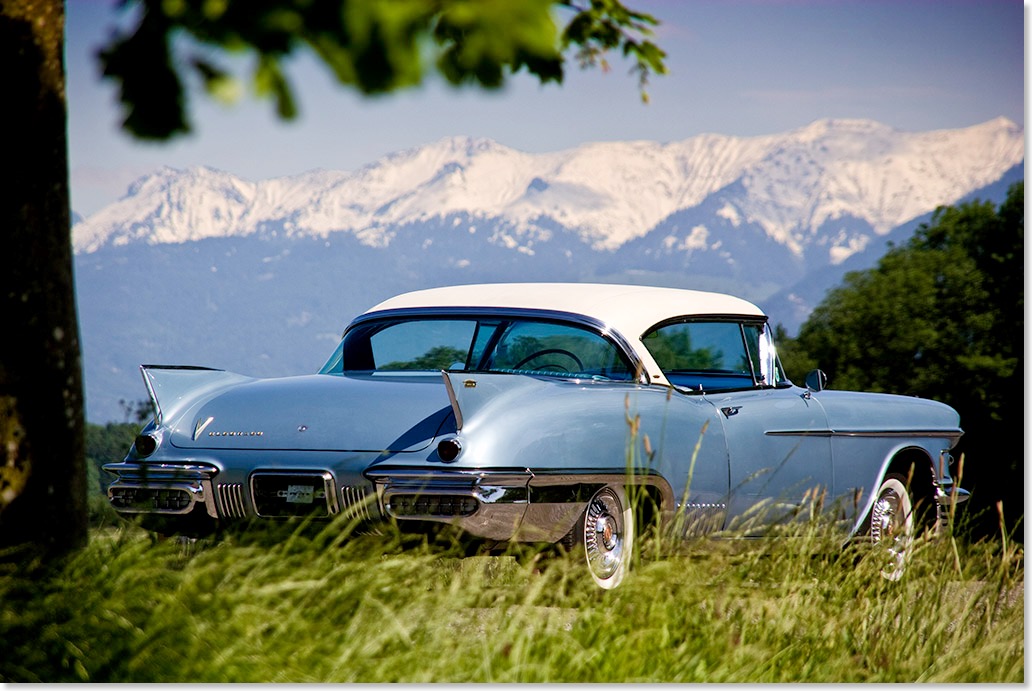
This morning I drove the car to a tire shop to have the front tires balanced. As it turned out they needed a couple of weights...
58 Carburetor Rebuilding Project finished
The 3 dual carburetors were rebuilt completely. The carbs were blasted, cleaned and rebuilt and work perfectly now. I did not think that it would make a difference that big. It´s a real pleasure to drive the car now.
And the best surprise was, that the rebuild cost much less than the initial cost estimate I got.
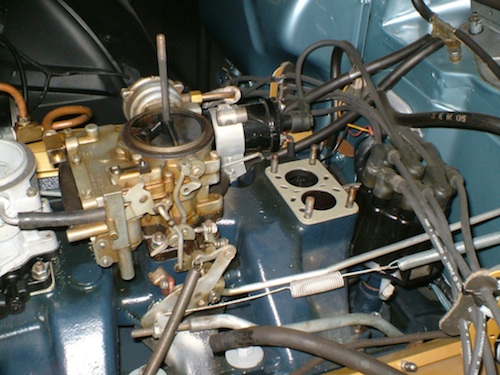
during the rebuilding - click on any picture for larger view!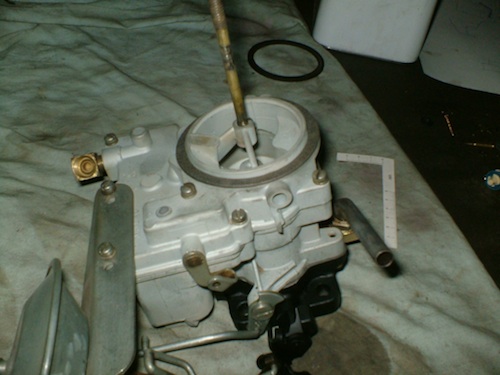
all carbs were blasted and cleaned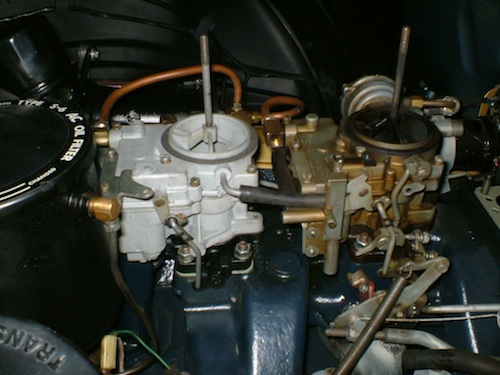
the rebuilt front carb
Finally: A date for the tri-carb rebuild
I will deliver the car to them on April 23rd. Looking forward to it.
The 58 is at the restoration shop.
It made the drive there without catching fire again ;-)
The restoration shop will take care of the carbs now.
One of the carbs caught fire last year at my own wedding and since then I could not drive the car.
Also the air cleaner will have to be repainted due to the burnt cover.
Hope everything will be fixed soon and I can finally drive my 58 Seville.
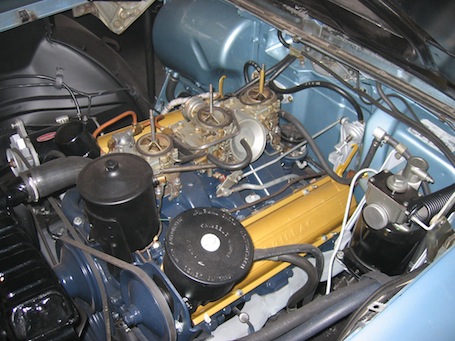
1966 Cadillac Coupe deVille (16)
1967 Cadillac DeVille (54)
1967 Cadillac Eldorado (73)
1971 Lincoln Continental Mark III (24)
1974 Cadillac Coupe deVille (46)
1978 Cadillac Eldorado Biarritz (25)
1996 Buick Roadmaster (20)
Cadillac BIG Meet (2)
Car Shows (55)
Cruising (4)
CT6 (1)
For Sale (3)
Garage Stuff (32)
Pacer (1)
Restoration (140)
Various (55)
Video (20)
Website News (31)
- 6 way power seat
- 8-track
- 10 Ohm
- 429
- 1932
- 1957
- 1958
- 1958 Cadillac Eldorado Seville
- 1958 Cadillac Repair Tip
- 1959 Cadillac Eldorado Seville
- 1964
- 1965
- 1966
- 1966 Cadillac Coupe deVille
- 1966 Cadillac Repair Tips
- 1967
- 1967 Cadillac DeVille
- 1967 Cadillac Eldorado Repair Tip
- 1967 Cadillac Repair Tip
- 1967 Eldorado
- 1968
- 1970 Cadillac Eldorado
- 1971
- 1971 Lincoln Continental Mark III
- 1974
- 1974 Cadillac Coupe DeVille
- 1974 Cadillac Repair Tip
- 1976
- 1977
- 1978
- 1978 Cadillac Eldorado Biarritz
- 1978 Cadillac Repair Tip
- 1980 Cadillac Eldorado Biarritz
- 1996
- 2012
- 2014
- 2017
- 2018
- 2019
- 2022
- 2023
- 2025
- 3063206
- 7027235
- 7800483
- 7805675
- 7805676
- 12355706
- 17058531
- 17059968
- 17059969
- 22010515
- 22010661
- A.I.R
- A6
- AC
- AC Compressor
- AC Electrical Diagram
- ACC
- Accelerator Pump
- Accelorator pump
- Accident
- Actuators
- Adriatic Blue Metallic
- Ads
- Aftermovie
- Air Pump
- Aircondition
- AIRPUMP
- ALC
- Alternator
- AM
- AM-Transmitter
- Antenna
- Anti Rattle Clips
- Antique Gold
- Arizona Vintage Parts
- Arrival
- Article
- ASC
- Ash Tray removal
- ATC
- Atlantis Blue Firemist
- Austria
- Austro Classic
- Autolite SP-459
- Automatic Seat Back Release
- Award
- Banner
- Barn Find
- Battery
- Battery Tray
- Beach Race
- Bearing
- Bendix
- Biarritz
- Bigfoot
- Bill Hirsch Engine Enamel
- Bleeder Screws
- Bleeding
- Blower
- Bodywork
- Bolts
- Book
- Borg
- Brake Booster
- Brake Fluid
- Brake Gray
- Brakes
- Broken Bolt
- Brougham
- Bucket seats
- Buick
- Bumper End
- Bushings
- Cadillac
- Cadillac BIG Meet
- Cadillac BIG Meet
- Cadillac birthday cake
- Cadillac Blue
- Cadillac Color Selections Dealer Book
- Cadillac Coupe deVille
- Cadillac Dealer
- CADILLAC GRAND EUROPEAN
- Cadillac Meeting
- Cadillac Mini Meeting
- Camaro RS
- Caorle
- Car Show
- Carburetor
- Card
- Carpet
- Carter AFB
- Cavalry Twill Vinyl
- CB
- CBM
- CCCD
- Choke
- Christmas
- Citizens Band
- Classic Cadillac Club Deutschland
- Clay Towel
- Cleaning
- Clock
- Clockwork
- Clutch
- Clutch Coil
- Collector
- Colonial Yellow
- Color Coded Springs
- Commercial
- Compound
- Compressor
- Condenser
- Continental Mark III
- Control Head
- Conversion
- Convertible top
- Coolant
- Corona
- Cowl
- Cruise Control
- Cruising
- CT6
- CV Boots
- CV JOINTS
- D6230
- Dash Trim
- Decal Removal
- Decals
- Decoration
- Dehumidifier
- Delco Moraine
- Der Standard
- detailing
- Deville
- Diagnosis Chart
- Diagram
- Dial
- Digital Rotary Drum Clock
- Diner
- Disc Brakes
- Distributor
- Diverter Valve
- Door Jamb Switch
- Door Rubber Conduit
- Dornbirn
- Dot3
- Drive Shaft
- Driving tour
- Drum brakes
- Dry Ice Blasting
- Dry Ice Cleaning
- DVD
- Eastwood
- Eldorado
- Electric Choke Thermostat
- Electrical schematic
- Elvis
- Engine Bay
- Ep
- Epoxy floor
- Europe
- Evaporator
- Exide
- Factory Markings
- Fender Skirt
- Floor
- Flushing
- Flyer
- Foam
- For Sale
- Front AXLE
- Front brakes
- Front bumper filler
- Front Floor
- Front wheel bearing
- Fuel Filter
- Fuel Pump
- Fuel Sending Unit
- Fusible Link
- Garage
- Garage Cabinets
- Gasket
- GE
- Gear indicator
- General Time
- Glove box light
- Grand European
- H4
- Haus of Hot Rod
- Headlight Actuator
- Headlight doors
- Headlights
- Heater Core
- Heater Hose
- Heater Valve
- High Idle
- History
- Holley
- Honest John
- Hood
- Hood Emblem
- Hood Ornament
- Hose Clamp
- Hot Choke
- Hot Water Valve
- HotRod
- How to
- Hödlmayr
- Ignition Diagram
- Illuminated Entry
- John D‘Agostino
- John Foust
- Klassikwelt Bodensee
- Kremsmünster
- LaSalle
- Leather seats
- Light Switch
- Limited
- Lincoln
- Lincoln Mark III Repair Tip
- Low Mileage
- Magazine
- Marilyn Monroe
- Mark III
- Master Cylinder
- Master Switch
- Master Vacuum Switch
- Media Blasting
- Meeting
- Meguiras
- MK II
- Mobile
- Model
- Moldings
- Mom
- Mopar Nationals
- Mostkost Kustom
- Movie
- Munich
- Neon
- NOS
- Oberösterreicher des Tages
- oilchange
- ORF
- Overspray
- Pacer
- Paint
- Paint correction
- Paintjob
- Part Number
- Parts
- Patch Panel
- Perfect Circle
- Permabag
- Persian Lime
- Photo shooting
- Photoshooting
- Pictures
- PinUp
- POA Valve
- Power Antenna
- Power Servo
- Power Vent Windows
- Power Window
- Printed Circuit Board
- Programmer
- Pulley
- Quadrajet
- Quarter Panel
- Quartz Conversion
- R134
- Radiator
- Radio
- Rattle
- Rear brakes
- Rebuild
- Recalibrate
- RediRad
- Reed Switch
- Relais
- Relaunch
- Removing Overspray
- Repaint
- Repair
- Restoration
- RIP
- Roadhouse
- Roadmaster
- Rochester
- Rocker Arm Cover
- Rocker Panel Extension Clips
- Rostio
- Rotary Valve
- Rotterdam
- Rupes
- Rust removal
- Rust removal gel
- Sabre Wheels
- Sand Blasting
- Sandblasting
- Screed
- Season Greetings
- Seasons Greetings
- Seat Back Locks
- Seat Padding
- Seat Transmission
- See through ornament
- Self adjusters
- Self Starter
- Sepp's Garage
- Seville
- Sheetmetal
- Shocks
- shop manual
- short
- Sign
- Solenoid
- Spark Plug Wire Routing
- Speakers
- Special Award
- Speed Bleeder Screws
- Splash Guard
- Starter Diagram
- Starter Motor
- Steering Column
- Storage
- suction throttling valve
- sunroof
- suspension
- Swirl Mark removal
- Switzerland
- T3
- Taillight Cover
- Texan´s Choice Award
- Thermostat
- Tilt and Telescope
- Time capsule
- Tomsclub
- Torque Specifications
- Tower Hose Clamp
- Towtruck
- Trailer
- Transducer
- Transmission
- transmission control selector
- transmission control selector indicator light
- transmission shift indicator
- Treadle Vac
- Treffen
- Tri-Band
- Troubleshooting
- Trunk Cardboard Kit
- Trunk lid
- Trunk lining
- Trunk to bumper cover
- Turn Signal Switch
- TV
- Typisierung
- Ultimate Garage
- Underbody
- Undercarriage
- Undercoating
- Undercoating Removal
- Vacuum Booster
- Vacuum diagram
- Vacuum hoses
- Vacuum Master Switch
- Vacuum Schematic
- Vacuum Valve
- Valve Cover
- Various
- Vent Window Switch
- Vibration
- Vibrator
- Vicodec roof
- Video
- Vinegar
- Vinyl Roof
- Visitor
- Washer Fluid Float
- Washer Fluid Low Level Indicator
- Water Pump
- Wax
- Weatherstripping
- Website News
- Westclox
- Wheel Bearings
- Wheel Housing
- Wiesbaden
- Windlace
- Winter
- Wiring
- Wiring Diagram
- Wonderbar
- Workbench
- Zurzach
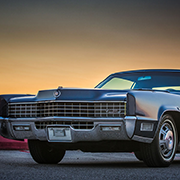 GERALD´S CADILLACS - NEWS
GERALD´S CADILLACS - NEWS